V.ALUM
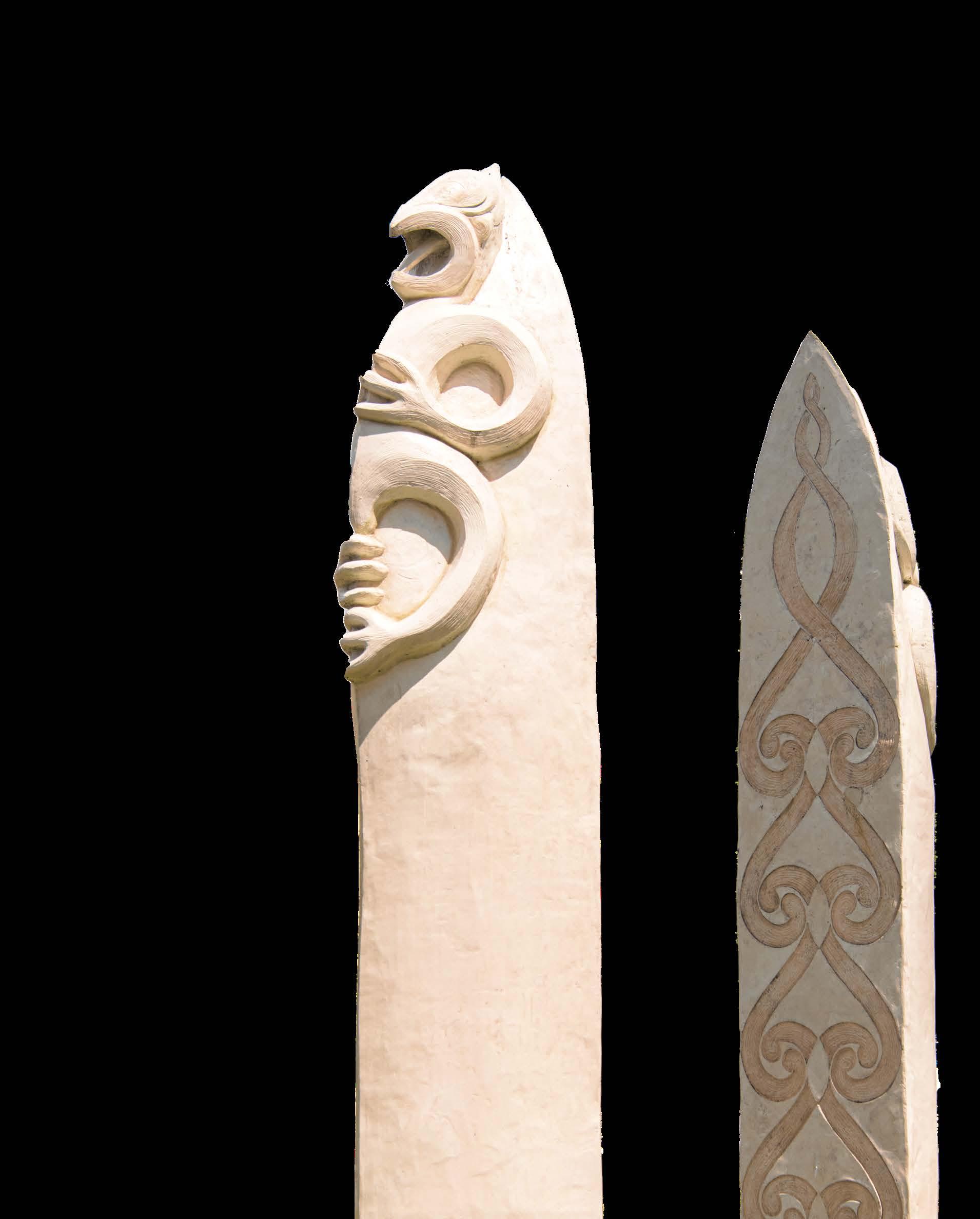

16 Victoria University of Wellington Law Students’ Society’s year at a glance
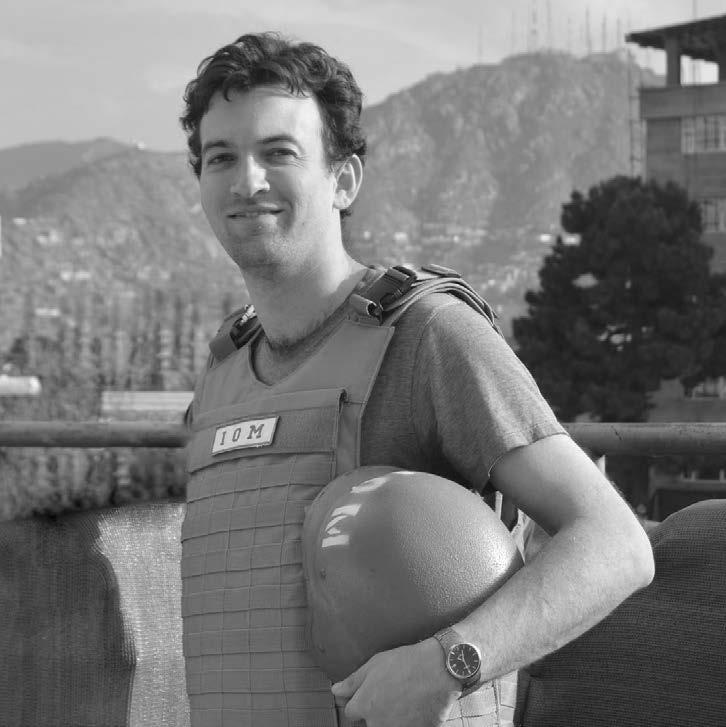

20 Graduating address: Billie Haddleton, class of 2021
22 New scholarship opens up opportunities for Māori and Pasifika law students
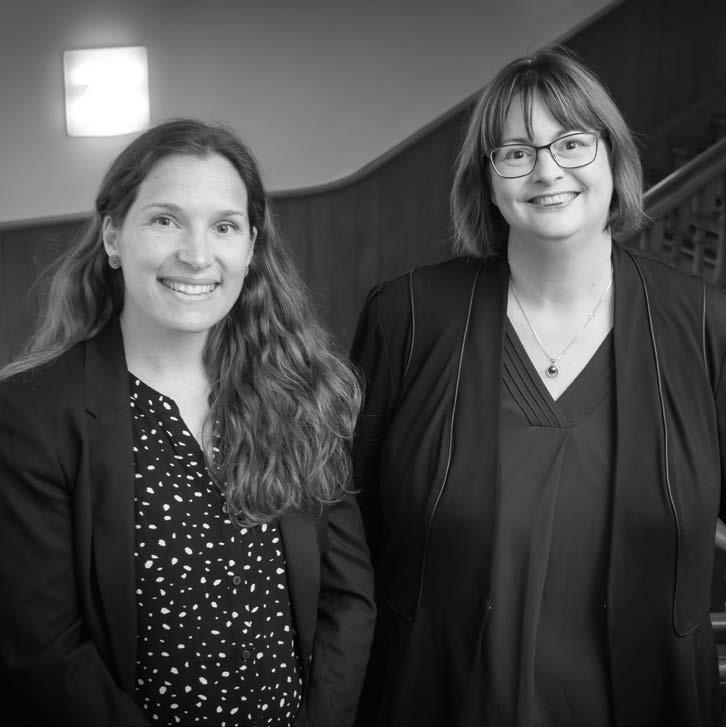
24 Disability rights on the national stage

Contents PAST, PRESENT, AND FUTURE 8 STAY AND DELIVER IN AFGHANISTAN 10 FACULTY OF LAW ANNOUNCEMENT 12 2 He mihi nā Te Toi Tātāriki—Welcome from the Pro Vice-Chancellor of Government, Law and Business 4 2021 report from the associate dean research 6 Learning and teaching in 2021: a year of academic resilience 8 Presidents of
University of Wellington Law Students’ Society 10 Stay and deliver in Afghanistan 12 Faculty of Law announcement 13 Law professor joins the international stage for conservation 14 Captured in the Lair of the film industry
Victoria
V.ALUM 2021


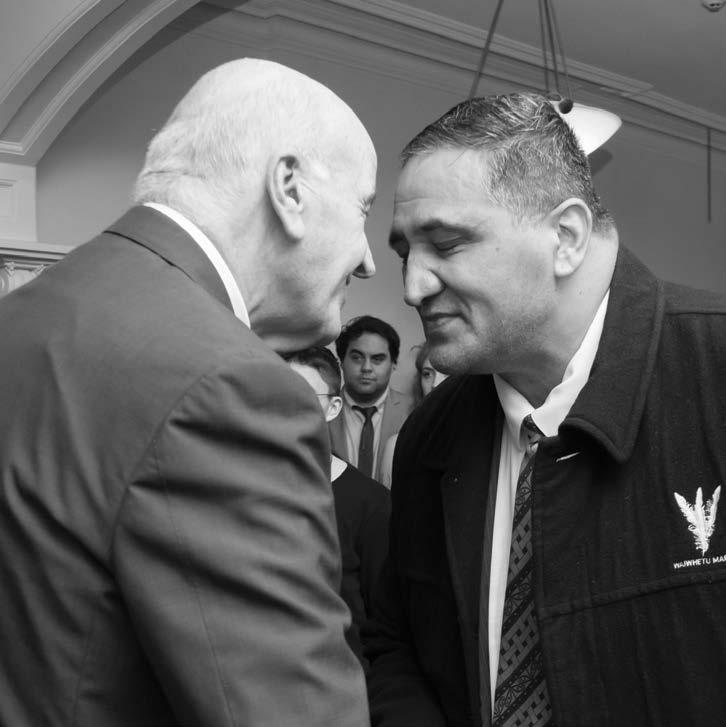
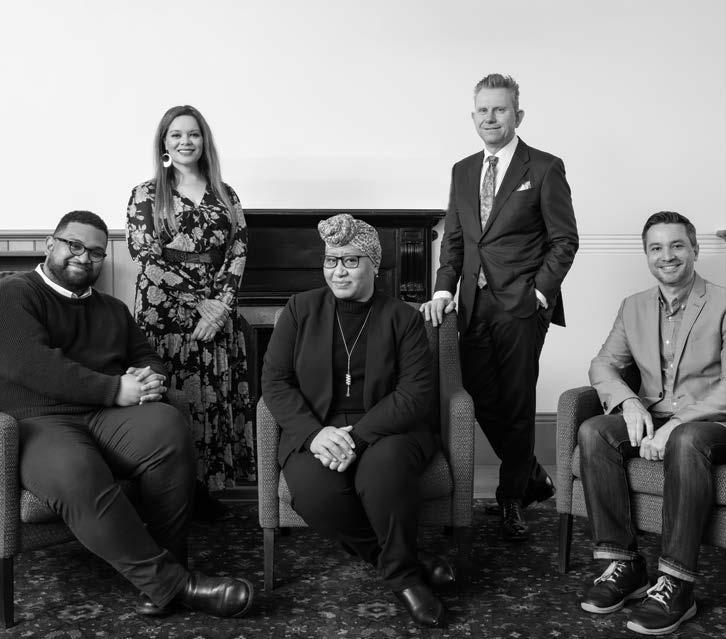
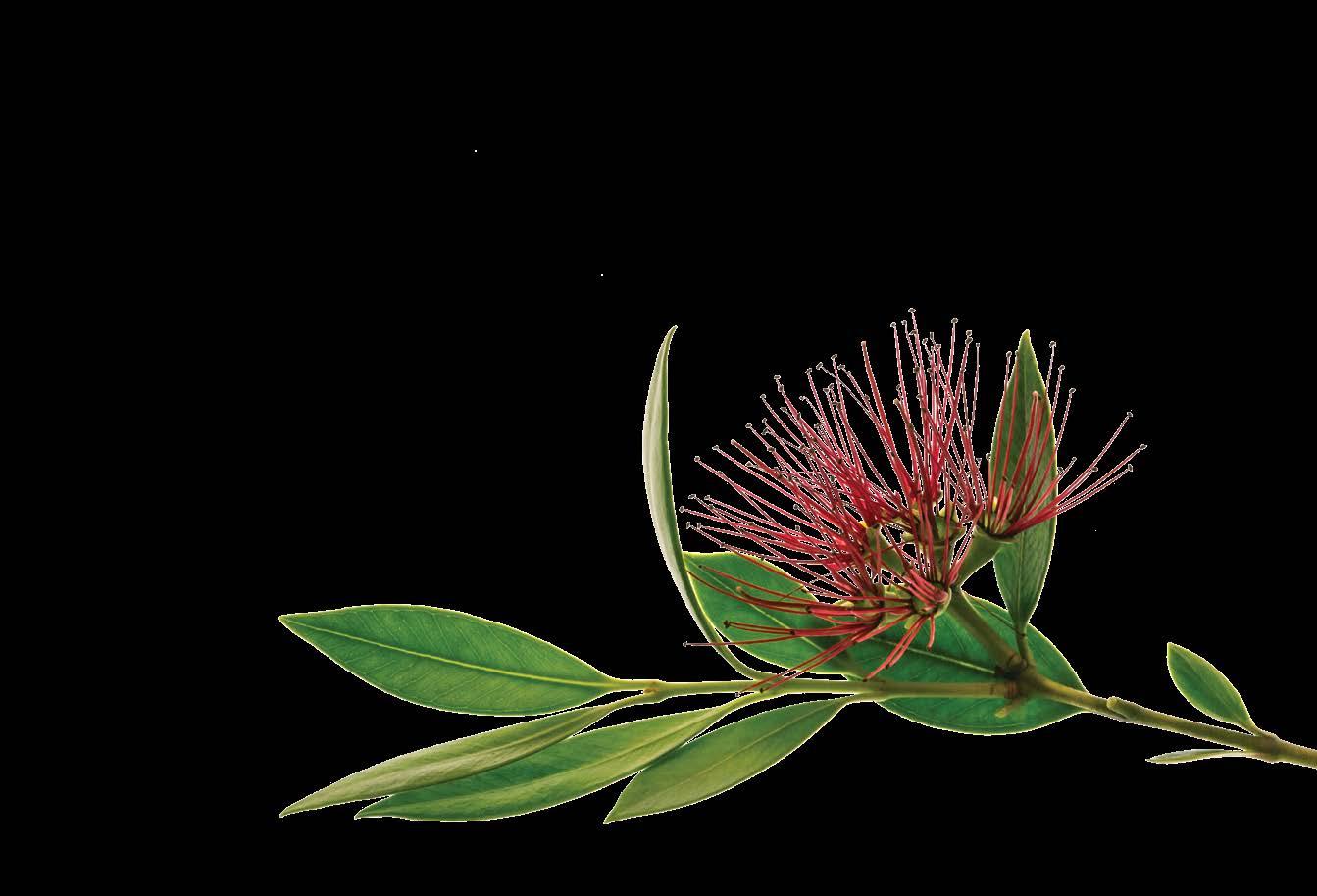
DISABILITY RIGHTS ON THE NATIONAL STAGE 24 A TIME TO CELEBRATE AND CHALLENGE 30 ENHANCING OPPORTUNITIES FOR OUR PASIFIKA TAUIRA 34 26 Law’s new distinguished fellows 27 New law commissioner 28 The rolling maul of the COVID-19 response 30 A time to celebrate and challenge 32 A legend retires 33 Two milestone lectures 34 Enhancing opportunities for our Pasifika tauira 36 Government, Law, and Business 38 Top-achieving law graduates honoured by University 39 Fifty years at the Faculty of Law 40 Endowment ensures Lecretia Seales Memorial Lectures can continue 42 A year in reflection 43 New acting dean of law 44 Awards, honours and appointments 46 Published in 2021 50 2022 postgraduate course timetable Te Herenga Waka—Victoria University of Wellington | Te Kauhanganui Tatāi Ture—Faculty of Law Page 1 V.ALUM 2021
Dear alumni and friends
Te Herenga Waka—Victoria University of Wellington has continued to prosper despite another year of challenges and adaptation due to the ongoing COVID-19 pandemic.

Ngā tūranga hou— pro vice-chancellor and dean appointments
I am delighted to advise that I have accepted the role of Pro Vice-Chancellor of Government, Law and Business / Toi Tātāriki for the Faculty of Law and Wellington School of Business and Government (Te Kauhanganui Tatāi Ture /Ōrauariki). My duties as dean of law and head of school have been assumed by the ever-capable Professor Petra Butler, while recruitment for a permanent dean of law takes place.

While I am no longer the dean of law, I am committed to maintaining my relationships within the legal community. I am also looking forward to the opportunity to engage more with stakeholders in the collaborative projects being undertaken by the Faculty of Law and the Wellington School of Business and Government. I will also be leading the development of the strategic key initiative ‘governing for the future’, one of the University’s areas of distinctiveness.
During the year we have had many successes, achievements, celebrations, and positive outcomes that give us
He mihi nā te toi tātāriki
an optimistic outlook on the future education of our students and ongoing development of our learning and teaching, research, and operations.
One of the positive outcomes that will lead to the ongoing development of the Law School is the work that has continued around ensuring our teaching and learning continues to adapt to important adjustments in the legal context of Aotearoa New Zealand. We have continued to explore the role of tikanga Māori in the law programme. Alongside our colleague Professor Rawinia Higgins, Deputy Vice-Chancellor (Māori), who has provided guidance and leadership, I have co-hosted further wānanga in addition to those hui kōrero and discussions held last year. It has been marvellous to see the support of law colleagues, such as Māmari Stephens and Dr Carwyn Jones, as these sessions were held. We continued the conversations around incorporating tikanga into the core courses of Aotearoa’s law degrees.
“We have continued to explore the role of tikanga Māori in the law programme”
These wānanga were attended by Indigenous members of the judiciary and legal profession, representatives of Ngā Rangahautira and staff from Te Kawa a Māui. Staff forums at the Faculty were also convened to assemble
feedback and contributions.
As a result of this work, and in conjunction with the New Zealand Council of Legal Education and colleagues at law schools across the country, we are now considering a New Zealand Council of Legal Education proposal to incorporate tikanga into the law degrees’ core subjects so it becomes an integral part of the legal education of our tauira. To support this important work at the Faculty of Law, we have approval to recruit up to five Māori and Pasifika staff at a range of academic levels up to and including associate professor. The approval is to recruit in a group or cohort to enable support for those coming into the academic setting. It is anticipated that some of these appointees would be able to assist with the changing context signalled by the New Zealand Council of Legal Education’s proposals regarding the teaching of te ao Māori concepts (including tikanga Māori) in the compulsory courses of the undergraduate law degree.1
Finally, I am delighted to share that the Te Ao Mārama/Le Ao Malama/ First Light Māori and Pasifika Futures in Law School-Leaver Scholarship to help students facing financial hardship and to cultivate opportunities will be available in 2022. In discussion with the Hon. Luamanuvao Dame Winnie Laban,
Page 2 V.ALUM 2021
Welcome from the Pro Vice-Chancellor of Government, Law and Business.
the Assistant Vice-Chancellor (Pasifika) and the Hon. Justice Sir Joseph (Joe) Williams, the scholarship has been named ‘Te Ao Mārama/Le Ao Malama /First Light’. I express thanks for their counsel and support. I am also very grateful to donors who have contributed to this important kaupapa thus far.
Te mate kowheori— the COVID-19 pandemic
It will be apparent to all of you that the ongoing effects of COVID-19 continue to be ever-present in Aotearoa. I want to thank our academic and professional staff who have worked with patience, perseverance, and having students top of mind as we navigate yet another year of disruptions to accessing the campus, learning and teaching, and students being unable to return for the final weeks of Trimester 2. Our staff have continued to ensure our highly regarded education and learning and teaching initiatives have continued despite the challenging environment. We are all hoping, I am sure, that the new year brings more continuity and certainty around what the future will look like, and I welcome the prospect of having our full cohort of students back on campus again in the near future— whether from around the different corners of Aotearoa or from abroad.
Whakanuia—celebrations

We were able to gather earlier this year to mark the Faculty of Law calling Old Government Buildings home for 25 years along with invited guests, including the Governor-General at that time, Dame Patsy Reddy.
I am looking forward to Te Herenga Waka—Victoria University of Wellington’s celebration next year to mark 125 years since the Victoria College Act 1897 was enacted, with teaching and research commencing at

the University a few years later in 1899. Although we have been unable to gather as a community of alumni, friends, and constituents of the Faculty of Law for much of this year due to alert-level restrictions, I hope this 2022 celebration will bring members of our community together in Wellington.
We are very proud to have alumni and members of our community achieving, succeeding, and exceeding expectations on a global stage as well as right here at home.
I would also like to extend my congratulations to Associate Professor Joanna Mossop and Dr Ruby Moynihan Magsig who have received funding from Te Pūtea Rangahau a Marsden, the Marsden Fund, for their research project, ‘Reimagining ocean law to achieve equitable and sustainable use of marine ecosystems’.
In total, 22 projects from the University have received more than $14 million from the 2021 Marsden Fund round.
Finally, I would like to thank you for your ongoing support and commitment to the Law School.
I am confident that in my new position as Pro Vice-Chancellor, the alignment of leadership across the Faculty of Law and Wellington School of Business and Government will bring about positive change for the Pipitea campus. There will be plenty of opportunities for our students, alumni, community, and stakeholders to collaborate and to share knowledge, while developing and progressing the University’s ‘governing for the future’ key initiative will aid us in continuing to foster the next generation of lawyers, government advisers, business leaders, and policymakers.
Ngā maanakitanga Mark
1. Specifically, those subjects listed in the first Schedule of the Professional Examinations in Law Regulations 2008.
Te Herenga Waka—Victoria University of Wellington | Te Kauhanganui Tatāi Ture—Faculty of Law Page 3 V.ALUM 2021
...our highly regarded education and learning and teaching initiatives have continued...
2021 report from the associate dean research
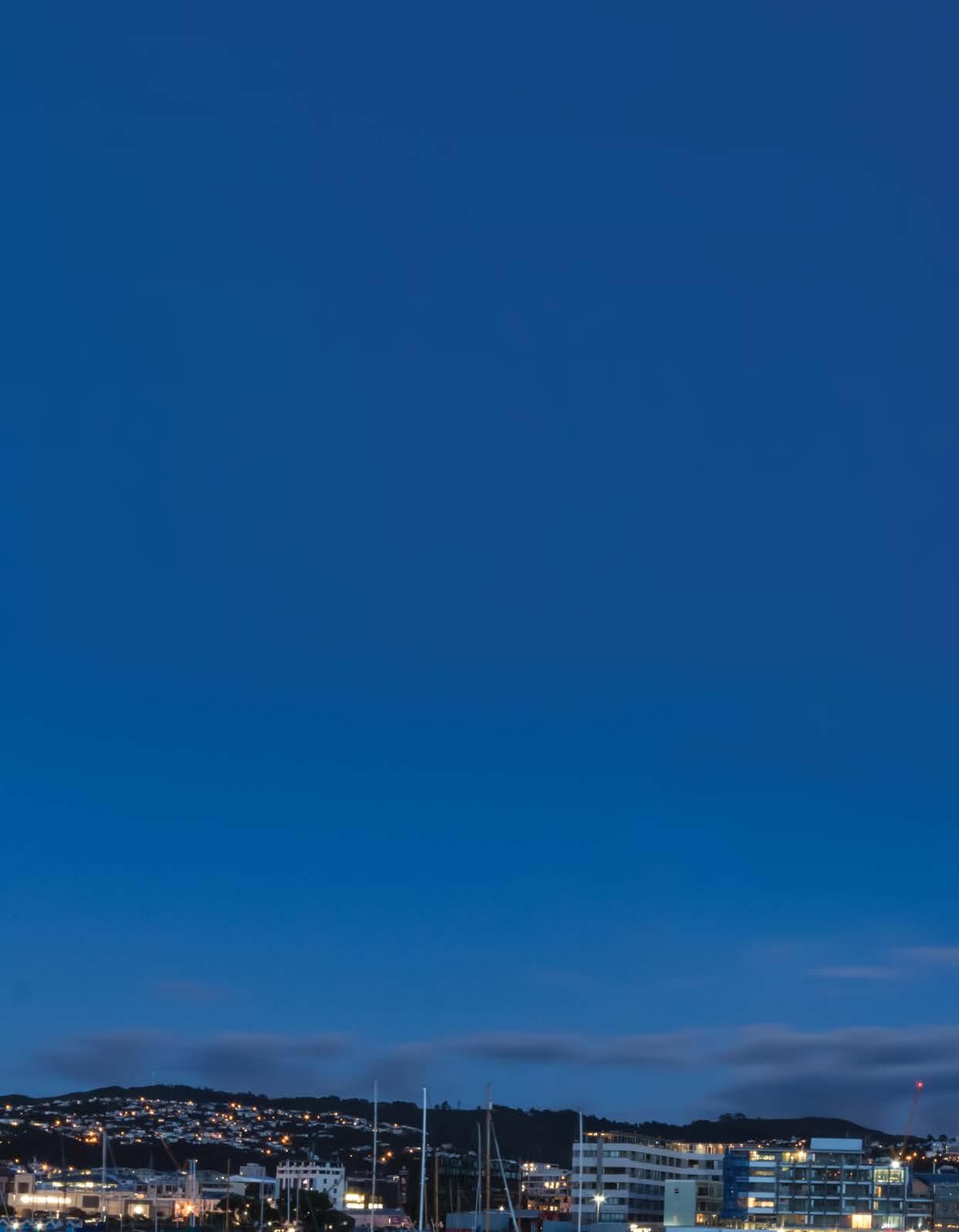
Last year I reported how our researchers were hard at work despite the interruptions and distractions from COVID-19.
Those disruptions have, of course, continued this year as we settle into a new ‘normal’ with teaching more complicated and time consuming than usual. As we have strong international connections, the inability to travel is forcing some of us to curtail our activities in some places, but ingenuity and the miracle of modern technology is reducing some of the barriers—although this often means attending meetings and conferences in the middle of the night. Despite this, I am continually astounded by the dedication of the Faculty to continuing with research (and I encourage you to peruse the research outputs listed later in this publication).
It is important to understand that our research is not only about producing books and articles for the sake of it. All of our staff contribute to developing the law both here and internationally. This year I am sharing with you just some of the incredible contributions that Te Herenga Waka—Victoria University of Wellington academics make to the legal community. Keep in mind that this is just the tip of the iceberg—in the
space provided I could never hope to cover it all. I am so proud to be part of a research community that is committed to making the law as good as it can be.
Law reform and contribution to government work
Law academics often make submissions to select committees considering legislation and reviews. For example, in April Dr Dean Knight, Professor Claudia Geiringer, Sir Ken Keith and Sir Geoffrey Palmer made submissions to the Privileges Committee regarding the Bill of Rights Declarations of Inconsistency Bill. Associate Professor Nessa Lynch was appointed chair of the Data Ethics Advisory Group, which advises government agencies on emerging uses of data. She also released a paper in October with Ian Lambie, Andrew Becroft and Tamara Wilson-Tasi, calling for urgent law changes for the youth justice system. Professor Richard Boast has been extremely active in conducting research and providing testimony to the Waitangi Tribunal. Our staff often provide subject matter training to government officials, including Dr Bjørn-Oliver Magsig, who recently ran training for the Ministry of Foreign Affairs and Trade on issues relating to climate change.
Influence on the law
Staff research is often cited in court judgements, often making an important contribution to the development of the law. Professor David McLauchlan’s work on the influence of prior negotiations and subsequent conduct in interpreting contracts was accepted by the Supreme Court in Bathurst Resources v L&M Coal Holdings [2021] NZSC 85. Professor Nicole Moreham’s work on privacy has been discussed or adopted in the Court of Appeal (Peters v A-G [2021] NZCA 355, Hyndman v Walker [2021] NZCA 25), the High Court (Henderson v Walker [2020] NZHC 2184) and the NZ Human Rights Tribunal (Marshall v Idea Services [2020] NZHRRT). Her work is also cited in English cases.
The profession is the subject of some important work being undertaken by Professor Yvette Tinsley and Dr Nicola Tyler (School of Psychology). Their project, ‘Legal Professionals’ Experiences of Working with Emotion and Potentially Traumatic Material,’ is being funded by a Faculty of Law Strategic Grant. In their work, the researchers will explore the psychological impacts of working as a criminal lawyer and produce recommendations for how to better support criminal lawyers.
Page 4 V.ALUM 2021
Associate Professor Joanna Mossop reflects on a year rich in research.
Professor Grant Morris was made a Fellow of the Arbitrators’ and Mediators’ Institute of NZ (AMINZ) by waiver at the August 2021 conference in recognition of his contribution to the study and practice of mediation.

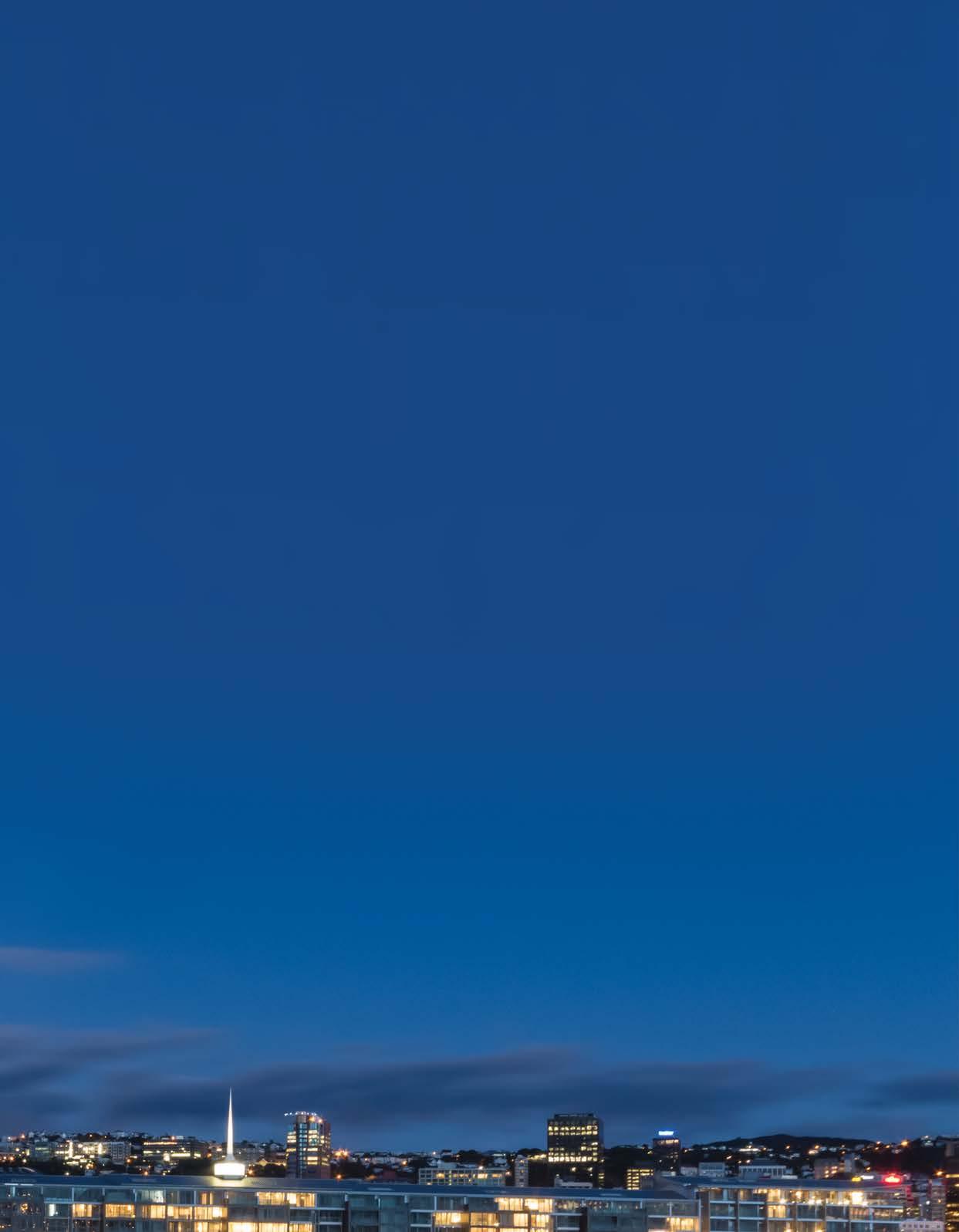
International contributions
Professor Campbell McLachlan was a member of the Institute of International Law’s 12th Commission on Epidemics, Pandemics and International Law, whose resolution was adopted by the Institute in August 2021. He was also invited to deliver the exclusive General Course on International Law at The Hague Academy of International Law in 2024. I was appointed as a legal adviser to a United Nations Development Programme (UNDP) project assisting Mauritius and Seychelles with establishing regulations for their joint continental shelf beyond 200 nautical miles. Professor Graeme Austin recently provided a paper to the Motion Picture Association of America (Asia Pacific) Seminar accompanying the 34th Tokyo International Film Festival. Professor Austin addressed the hot topic of the human rights implications of internet site blocking legislation, arguing that some limitations on accessing foreign pirate websites could be consistent with human rights guarantees. Professor Catherine Iorns was appointed as one of three councillors in the Pacific for the International Union for the Conservation of Nature.
Professor Alberto Costi was involved in two important online projects creating climate change resources for students, practitioners, and stakeholders. First, he participated in a project funded by the Pacific Islands Universities Research Network (PIURN) to produce a documentary film where
experts, including Professor Costi, were interviewed at length on a range of legal and policy climate change issues of interest to low-lying at-risk nations in the Pacific. Second, Professor Costi contributed a module on methods of international dispute resolution for an online course created by Wellington UniVentures and the Institute for Small and Micro States for anyone interested in gaining an understanding of dispute settlement in climate change.
I’d also like to acknowledge the support of the Environmental Law Initiative (ELI) over the past couple of years. The ELI has been very generous in funding a number of projects related to environmental law for researchers from the Faculty of Law and the wider university.
As you can see from even a small sample of the work of some of our researchers, the Victoria University of Wellington Faculty of Law is not just a place where we teach law to our best and brightest. Every day our staff are working to improve the law in New Zealand and beyond.
Every day our staff are working to improve the law in New Zealand and beyond.
Te
V.ALUM 2021
Associate Professor Joanna Mossop
Herenga Waka—Victoria University of Wellington | Te Kauhanganui Tatāi Ture—Faculty of Law
Learning and teaching in 2021: a year of academic resilience
Professor Graeme Austin, Chair in Private Law, finished his four-year term as associate dean (learning and teaching) at the end of October. He reflects on learning and teaching in 2021, and how the Law School community confronted the challenges of COVID-19.
The promise that “2021 would be better” was only partially fulfilled. After several months of relative normality, COVID-19 struck again. By mid-year, much of what we contended with in 2020 had returned. Online tutorials and assessments were back. For a time, heightened alert levels required lectures to move entirely online.

And yet, our Law School got through. Classes were taught. Students continued to learn—each day engaging with, and synthesising, new ideas and information. Tutorials were run. Tests and assignments were completed and marked. And all of this was achieved at a characteristically high standard.
for many in our community, these efforts came at a real cost to them and their whānau.
Our course administrators, expertly led by Rozina Khan, provided the technical support needed to achieve continuity in teaching and learning in the online environment.
Our students approached their responsibilities with admirable maturity and good grace—all the more impressive given the difficult circumstances in which some were studying. Crowded homes, unheated flats, limited internet bandwidth, separation from loved ones—these were just a few of the problems our students confronted.
Under the skilful and sensitive leadership of Lucy Keyzers, the Law School’s Student and Academic Services team helped our students stay on track, carefully identifying impediments to academic achievement, and providing help where needed or referring students to other support services.
The hard work of our adjunct instructors was crucial. Every small law school needs friends and colleagues in the legal profession who are prepared to share their practical knowledge and experience. In 2021, the challenge of teaching in the COVID-19 environment wasn’t quite what they signed up for.
Another explanation is what I’m calling “academic resilience”. That is, an unswerving commitment to the diverse, significant, and often humbling responsibilities that comprise the academic endeavour. For the Law School, no crisis, no matter how serious, was going to impede the academic mission to advance and produce new knowledge, challenge assumed truths, test emerging ideas, and share all of this through scholarly publications, public engagement, and research-based teaching.
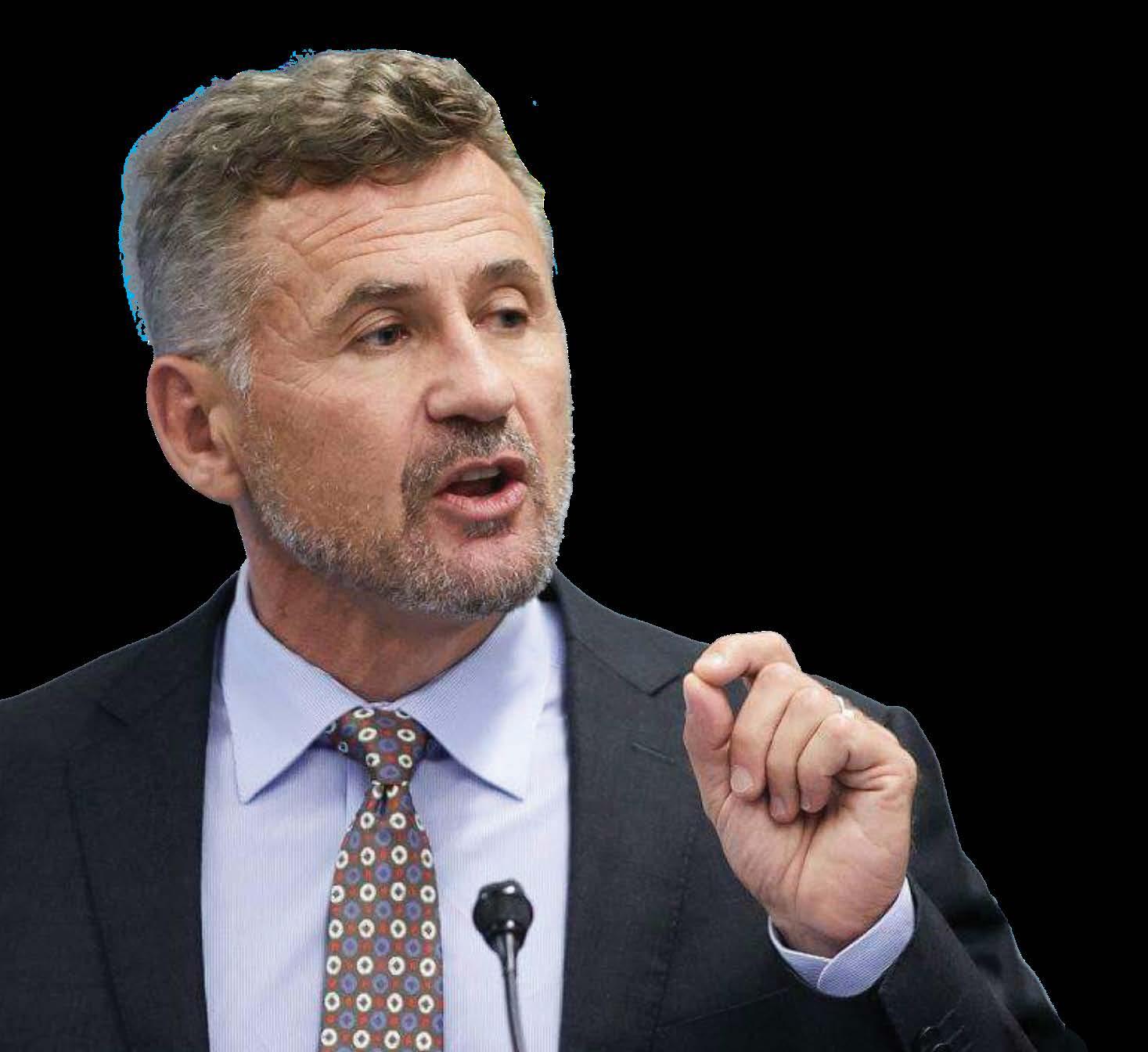
V.ALUM 2021
Section 268 of the Education and Training Act 2020, with its description of a university’s “characteristics”, includes a kind of academic mission statement. Parliament requires the principal aim of any university to be developing “intellectual independence”. It also requires most teaching to be done by “people who are active in advancing knowledge”. Universities must “accept a role of critic and conscience of society”. They are characterised by “a wide diversity of teaching and research” that, amongst other things, “maintains, advances, disseminates, and assists the application of knowledge”.
Like all good mission statements, this one crystallises pre-existing commitments. The work done in the Law School each day is animated by an urgent belief that productive exchanges of informed ideas can lead to better solutions to societal problems. The work sees intellectual independence as a bulwark against the affiliation-fuelled chaos of “alternative facts”. It respects and celebrates a diversity of ideas, but demands they be grounded in disciplinary expertise; the kind that comes from active involvement in advancing knowledge. Everyone who comprises the Law School community, in whatever role, is committed to these ideals. That commitment helped us get through 2021.
Section 268 doesn’t always distinguish clearly between research and teaching. We’re told that “research and teaching are closely interdependent” and that most university teaching is “done by people who are active in advancing knowledge”. To be sure, intellectual independence is implied by the “conscience and critic” role. But the legislation doesn’t specify whose “intellectual independence” is to be developed. Is it the students’ or the academics’?
In the Law School, the development of students’ intellectual independence happens every day through discussion-based learning—when, for example, students are asked to make sense of facially inconsistent statutory provisions or to test the logic of venerable common law principles in radically changed circumstances. It happens when students assess the effectiveness of consumer protection measures, or evaluate the externalities generated by new regulatory innovations in the financial advice sector. It happens when students argue that mana whenua provides a sufficiently distinctive basis for a public nuisance claim. It happens when students evaluate whether the Government processes adequately incorporate community voices, or consider how to construct a concept of queer identity that has enduring legal salience. It happens when students complete independent research essays on new family law initiatives. It happens when they debate whether the effects of climate change provide grounds for seeking asylum. It happens when students study Pacific ethnography,
and material focused on both the ancient history of the Pacific-state formation in the pre-European Pacific and contemporary Indigenous sovereignty movements, and then devise their own research projects in the Pacific legal studies field. It happens when students evaluate the criminal justice system in practice against legislative and policy aspirations.
Academics’ own intellectual independence is catalysed through the kinds of research and public service activities my colleague Associate Professor Joanna Mossop describes so well in this issue of V.Alum. But this also occurs with teaching.

A wise senior professor once said to me, “Unless academics are doing scholarship, they run out of interesting things to say in the classroom”. She wasn’t suggesting that academics must always be researching areas they’re teaching. Her concern was with the quality of mind that academic engagement in the classroom requires. Together with communication skills, good teaching requires intellectual curiosity, disciplined thinking, a determination to test the boundaries of ideas, an ability to critically evaluate established principles, and connect and synthesise complex concepts—all the ingredients of intellectual independence. Without them, there is a risk that classroom work will degrade into an unexamined rehash of others’ ideas, an unwitting recourse to groupthink, untethered from critique and conscience.
The qualities of mind required for teaching help academics be better scholars. The skills and knowledge needed to catalyse students’ intellectual independence in the classroom are the same qualities that academics model in scholarship and public service. Each animates the other.
This kind of connection between teaching and scholarship captures the deeper commitments implied by the term akoranga (the learner–teacher partnership). Akoranga is not about bureaucratic consultations between lecturers and students. Instead, the concept directs the attention of the whole Law School to the interlinked demands suggested by the Education and Training Act’s emphasis on intellectual independence.
That the Law School came through 2021 so well reflects this academic community’s determination to protect and advance the values and ideals that are inherent in the academic mission. Intellectual independence, the manifestation of conscience in expert societal critique, the advancement of knowledge: these qualities and activities define us. They are what society expects and entrusts us to have and to do.
In 2021, with the grit, determination, and resilience shown by our students, professional staff, and academics, we lived up to these expectations. We showed that we are more than worthy of this trust.
Te Herenga Waka—Victoria University of Wellington | Te Kauhanganui Tatāi Ture—Faculty of Law Page 7 V.ALUM 2021
Presidents of Victoria University of Wellington’s Law Students’ Society



1 What is important to you in leading VUWLSS?
Manraj: As past and current presidents of VUWLSS, we are acutely aware of the importance of working in partnership with our representative groups. While VUWLSS works to enrich the experience of law students, groups such as Ngā Rangahautira, Pasifika Law Students’ Society, Asian Law Students’ Association, VUW Feminist Law Society, and Rainbow Law also do incredibly valuable work.

Meghan: 2021 was all about community, for VUWLSS to bring students back together in the halls of Old Government Buildings (“OGB”) after a tumultuous 2020. This year we looked at the representative groups in OGB and strove to meet their level of excellence.
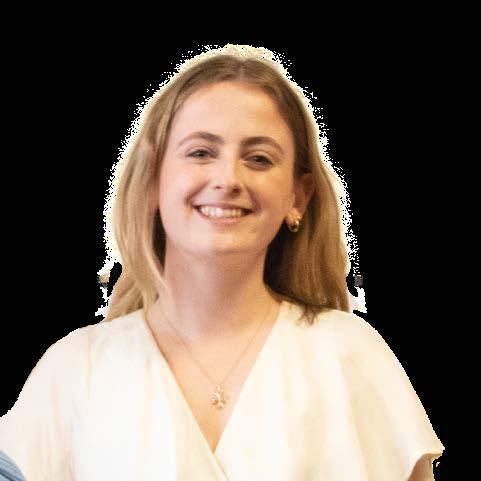
Jugjeet: It’s important that student leaders at Law School focus on lifting the voices of marginalised communities. As president of VUWLSS in 2020, when the Faculty and the University were trying

to adapt to COVID-19 on the fly, my priority was advocating for students from marginalised backgrounds, who were likely to be disproportionately affected by the pandemic. Law School can be a difficult journey at the best of times, but COVID-19 made things a lot harder.
My priority was making sure no student was left behind. This wasn’t a matter of the majority versus the minority. I knew most students would adapt to online learning and assessments. My concern was for students who, in ordinary times, were struggling to manage the pressures of Law School alongside personal responsibilities, such as family caring commitments, part-time jobs or cultural/religious priorities. We continuously reminded the Faculty that we cannot assume every student at Law School has their own device, stable internet, or quiet study space. It would be naïve to assume that every student had the same luxuries and was in the same position entering the pandemic.
Jugjeet Singh, Meghan Grant, and Manraj Singh Rahi discuss their views on what it means to be president of Victoria University of Wellington’s Law Students’ Society (VUWLSS) .
Page 8 V.ALUM 2021
Jugjeet Singh, president 2020 Meghan Grant, president 2021 Manraj Singh Rahi, president 2022
2 The COVID-19 pandemic has changed how we live, work, and study. What advice would you offer students, particularly those embarking on university study for the first time, in this new environment?
Manraj: COVID-19 has switched things up for all of us! Seek out people in your courses who you can reach out to when you need to—this might be by joining clubs, attending events, or speaking up in your tutorial. Take advantage of the online features available to you, such as re-watching lectures and learning innovative note-taking techniques. And I swear by it, always put your camera on in your Zoom tutorials!
Meghan: My Law School experience has been made better by the people I’ve met along the way. It’s important to find ways to reconnect with the Law School community when the pandemic has isolated us all into digital learning bubbles. I would encourage students to find ways to make friends, socialise, and study together. Go to your lecturer’s or tutor’s office hours. The worst thing you can do is get lost behind your screen.
Jugjeet: There is no substitute for the tight-knit and supportive community that can be found within OGB. While we are all used to working from home and can navigate a Zoom call with ease, don’t pass on the opportunities to make friends and build connections at the Law School. Your peers at the Law School will go on to be your colleagues in the workplace. You don’t need to go through the Law School alone. It can be difficult, scary, and exhausting at times. Reach out to the Law School community—your lecturers will listen, and your peers will relate. We are all going through this together!
3 Taking the step from law student to working as a lawyer can be a daunting experience. Is enough being done to ease that transition? What more needs to be done?
Meghan: As a final-year student, there’s a lot of information you have to find out for yourself or stumble across along the way. I’ve been lucky to have had mentors both formally (through the Wellington Young Lawyers Committee Bridging the Gap Programme) and informally who have answered my questions. Professional Legal Studies course providers do a lot of mahi in this area to support students but there are definitely students slipping through the gaps, especially as the job market continues to contract due to COVID-19.
Jugjeet: The jump from study to practice is significant. Five (or six) years at Law School teaches you how to find the ratio decidendi of a case but it won’t get you prepared for six-minute interval time sheet keeping or handling difficult clients or partner expectations. There is definitely not enough done to support students as they enter the profession, and that gap should be filled by law schools and workplaces collectively.
“A good lawyer understands and recognises the importance of their degree.”
One example is the added workload of students completing their Profs qualifications part time, while also working full time. The workload on these students or graduates goes unnoticed and leads to burnout. The onus falls on Profs providers and employers to work together to find a solution.
4 Do you believe the students in the Law School are representative of the New Zealand population? If not, whose faces are missing and what would you like to see done about it?
Meghan: No. There have been significant improvements but we still have a long way to go. The problem begins before law school. Most students who make it through to second year have received a private or high-decile public education. Steps need to be taken to address institutional problems in our education system that disproportionately disadvantage particular groups like our Māori and Pasifika tauira so that every New Zealander has the chance to succeed in tertiary education.
Jugjeet: While the representative groups at the Law School are getting busier with new events and initiatives to support their students, the Law School roll is not as diverse as it ought to be. Māori and Pasifika students are still a minority in our lecture theatres and when students do make it to the Law School, the bureaucracy does not make it an easy path for them.
Māori and Pasifika are systemically disadvantaged by New Zealand’s legal system. Law schools across the country need to increase their Māori and Pasifika student numbers and ensure they have the right support and resources to excel once they make it into law school.
5 Who makes a good lawyer?
Manraj: Anyone with a Victoria University of Wellington Law Degree. :)
Jugjeet: A good lawyer understands and recognises the importance of their degree. It is a privilege to have a law degree and to be a lawyer. It is my hope that all LLB graduates in Aotearoa recognise this importance and use their skills and knowledge to uplift the voices of marginalised communities and work to actively dismantle the racist and colonial structures that underpin our legal system.
Te Herenga Waka—Victoria University of Wellington | Te Kauhanganui Tatāi Ture—Faculty of Law Page 9 V.ALUM 2021
We are all going through this together
Stay and deliver in Afghanistan
When the Taliban swept into Kabul, Afghanistan on 15 August 2021, Te Herenga Waka—Victoria University of Wellington alumnus Christopher Foulkes was asked to “stay and deliver”.

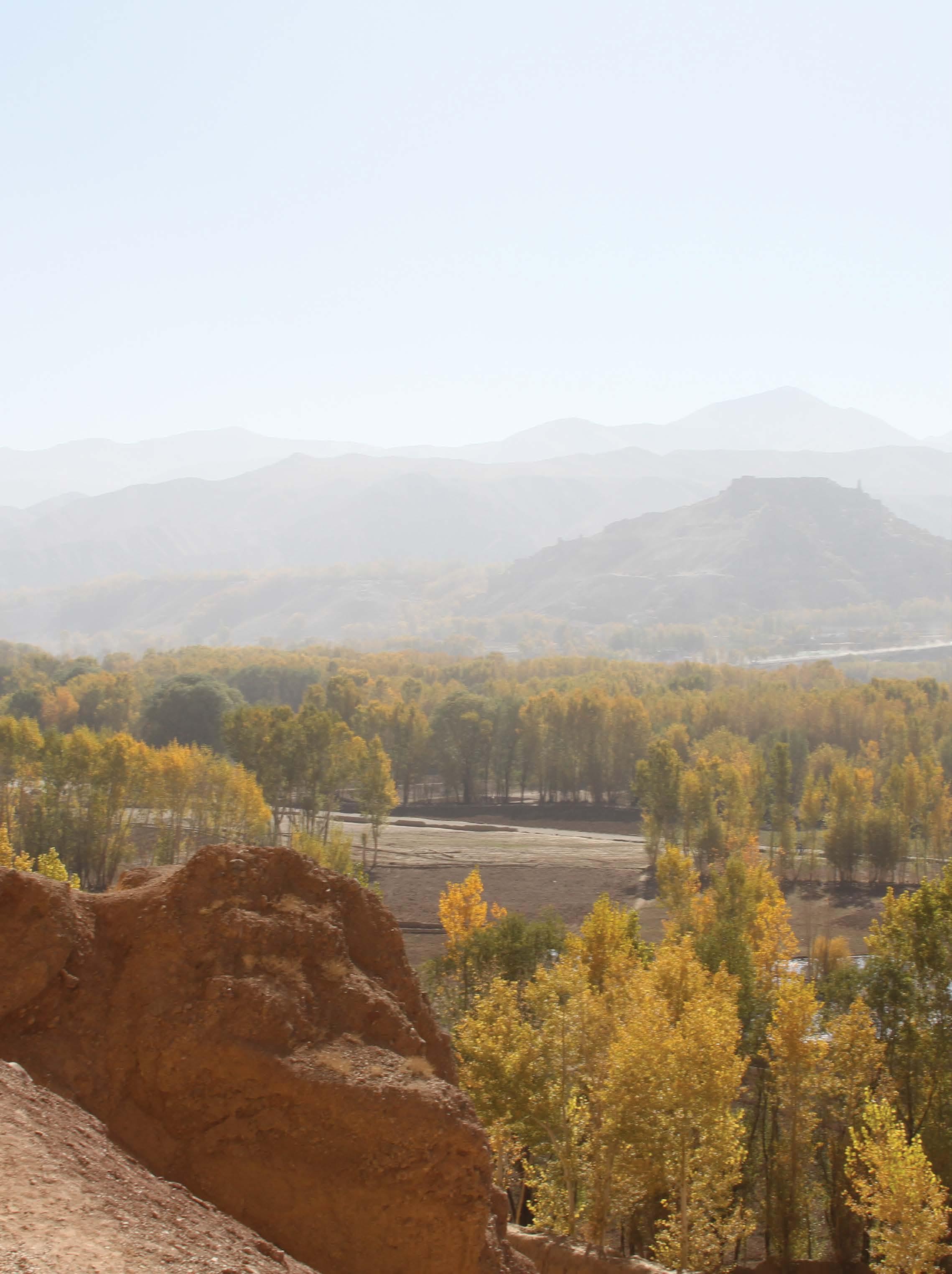
Page 10 V.ALUM 2021
Christopher Foulkes
Chris is a programme support officer for the United Nations’ International Organisation for Migration (IOM). His job is usually about drafting proposals, working with donors, and working on funding applications—but since the Taliban returned, he has been a jack of all trades as part of the temporary group of only five international staff of the IOM in the country.
We spoke to him two months after the return of the Taliban to Afghanistan as de-facto government.
“I was trying to ensure our 600 national staff didn’t feel abandoned, that they were safe and well. Because we have migration in our agency name, a lot of people have been asking us to migrate them somewhere—but we aren’t a government, and we need the government’s consent to grant visas. We’ve been liaising with our donors to convince them not only to accept our staff, but also vulnerable beneficiaries, or employees of the former government who may now be in danger.
“We’ve also been working out how we can engage with the Taliban,” says Chris.
Chris grew up in Brunei, where his Scottish mother and Kiwi father were both school teachers. He returned to Aotearoa for boarding school in Auckland in 2000, and began his degree at Te Herenga Waka in 2005, graduating six years later with a Bachelor of Laws and a Bachelor of Arts with Honours, majoring in political science and international relations.
“It just made sense to go to Wellington after I finished school. While I never imagined I’d end up in the job that I am in, I was always drawn to the public law and international relations areas. I thought I’d finish school and go to law school in Wellington, because it’s the place to understand how government works,” says Chris.
“It was interesting to see staff like Professor Petra Butler and Associate Professor Grant Morris go to select committees or present to Government— and the Government would listen to them, because they were the experts. I was learning from the experts.”
He enjoyed law school particularly for the camaraderie. “Once you are in third and fourth year you can feel the lecturers want you to succeed—they have your back.”
In the honours year of his political science degree, the University sent him to a conference in Korea through the Asia NZ Foundation. This saw him become a young leader with Asia NZ, which later facilitated his trip to Hawai’i for nine months to complete the East West Centre’s Asia Pacific Leadership Programme.
This start in Hawai’i gave Chris the network connections to move to Washington, DC. He then got an internship with the Migration Policy Institute, and later, a job with IOM in Bangkok. It was from there in 2014 that he moved to Kabul for the first time.
“My boss, the regional director for IOM, just happened to be a Kiwi, and he came over to my desk and said ‘Chris, we’ve got a 10-week position in Afghanistan, would you be interested?’ I said yes, and it turned into a two-year position.”
Chris did his Master’s in Migration Studies at Oxford University in 2016, then moved to Gaziantep in Turkey with IOM, before returning to Kabul.
While the decision in August to stay in Kabul was difficult, he can see how decisions being made now link to what he learned in international public law.
“My team is currently and continually grappling with the tension between the humanitarian imperative and the human-rights-based approach. I am used to having this discussion academically, but now it is being had with real lives and real people.
“The humanitarian imperative says we need to save as many lives as we can, regardless of principles—because life is the most important thing in the world.
The human-rights-based approach says ‘we can’t engage with this group unless they engage with, and respect, human rights’. For example, unless they allow women to be humanitarian workers, and allow us to serve women.
“These conversations happen between the UN humanitarian agencies— who tend towards the humanitarian imperative— and the international NGOs, who tend towards the human-rightsbased approach.”
Chris falls on the humanitarian imperative side in this case, but explains that obviously there is slightly more nuance to the debate than choosing one or the other.
“I like that my job makes a difference. Moving forward, I am super interested in being part of the space many in this field call the ‘missing middle’—where humanitarian response ends and development begins. I want to be involved in making sure humanitarian responders link in with development people, and design their programming in a way that allows them to pass it over more easily.”
He credits his time at university in Wellington with giving him the skills to do his job. “Being able to analyse situations quickly and draft responses and coming up with a coherent response, whether right or not. These are skillsets you gain from being a student of law and the humanities.
“A lot of my career has been about saying yes as much as I could.”
Te Herenga Waka—Victoria University of Wellington | Te Kauhanganui Tatāi Ture—Faculty of Law Page 11 V.ALUM 2021
...this discussion ... is being had with real lives and real people...
Faculty of Law announcement
Valued at $660,000 over three years, their project is “Reimagining ocean law to achieve equitable and sustainable use of marine ecosystems ”. Their project explores the unprecedented crisis that marine ecosystems and biodiversity are facing. The international legal architecture for ocean governance is failing because its jurisdictional structures and substantive rules are not aligned with the natural reality of ocean systems and do not distribute the benefits of ocean resources in an equitable way. This research investigates how to transform ocean law by challenging accepted paradigms, goals, and values of ocean law with the aim of constructing a new vision and approach to its development.
Their research will address both national and international ocean law, drawing on progressive legal concepts found in other areas of law as well as legal traditions and critical perspectives that have largely been excluded from mainstream ocean law discourse. These concepts will be applied to three thematic areas: fishing, marine protected areas, and the negotiations for a new treaty for marine biodiversity in areas beyond national jurisdiction.
Associate Professor Mossop has been researching in the law of the sea for over 18 years and is well known for her scholarship on a range of ocean issues as well as her award-winning book, The Continental Shelf beyond 200 Nautical Miles. Dr Magsig will join the Faculty of Law as a senior researcher after a decade abroad
working on international and national environmental law and human rights issues for universities and various United Nations organisations, most recently University College Cork in Ireland. Ruby will also lead the Oceans/Fisheries Portfolio at the New Zealand Government Department of Conservation as a senior international adviser providing collaborative opportunities between academia and government throughout the project.
Dr Magsig and Associate Professor Mossop will work together with a team of world-renowned international experts and institutions. These include prominent ocean experts such as Professor Richard Barnes at the University of Lincoln (Associate Investigator), the One Ocean Hub in Glasgow, and the Arctic University in Norway. They will also work closely with experts in Aotearoa and the Pacific,

Page 12 V.ALUM 2021
Associate Professor Joanna Mossop and Dr Ruby Moynihan-Magsig have been awarded a Marsden Grant in this year’s Te Pūtea Rangahau a Marsden.
Law professor joins the international stage for conservation
Professor Catherine Iorns has been appointed as a councillor on the International Union for Conservation of Nature (IUCN member-based environmental organisation in the world.
One of three council members from the Oceania region, which also includes a representative from Australia and another from Palau, Professor Iorns has more than 25 years’ experience in Indigenous rights, environmental law, and statutory interpretation. She has received awards for her environmental law teaching and research.

While she is yet to learn which sub-committee of the council she will be part of, she says her overarching focus is better protection of biodiversity in general.
“Most people don’t realise this, but the current loss of biodiversity around the world is a worse problem than climate change. One of the reasons it’s worse is because we know how to fix climate change; we just don’t have the will to do it. With biodiversity loss, we don’t even know most of the solutions because we haven’t figured out all of the causes. “For example, is wholesale spraying of Roundup on pasture killing all the worms and other good living things in the soil? Will this impact on our soils and food production in the future? We don’t know, because we haven’t studied it.”
Professor Iorns says the IUCN, which includes governments and NGOs, has a much larger influence throughout the world than is widely known about in New Zealand. It undertakes programmes on the ground, particularly in developing countries that do not have the resources to provide them. It is responsible for the Red List of threatened species and the newer Green List.
During her four-year appointment, Professor Iorns says her main goal is to normalise the concept of environmental limits on human activities and see that implemented in decisions, programmes, and policies.
“The world is not all about us at the top of the pyramid or food chain. We are a part of the natural environment and need to treat it with more respect,” she says.
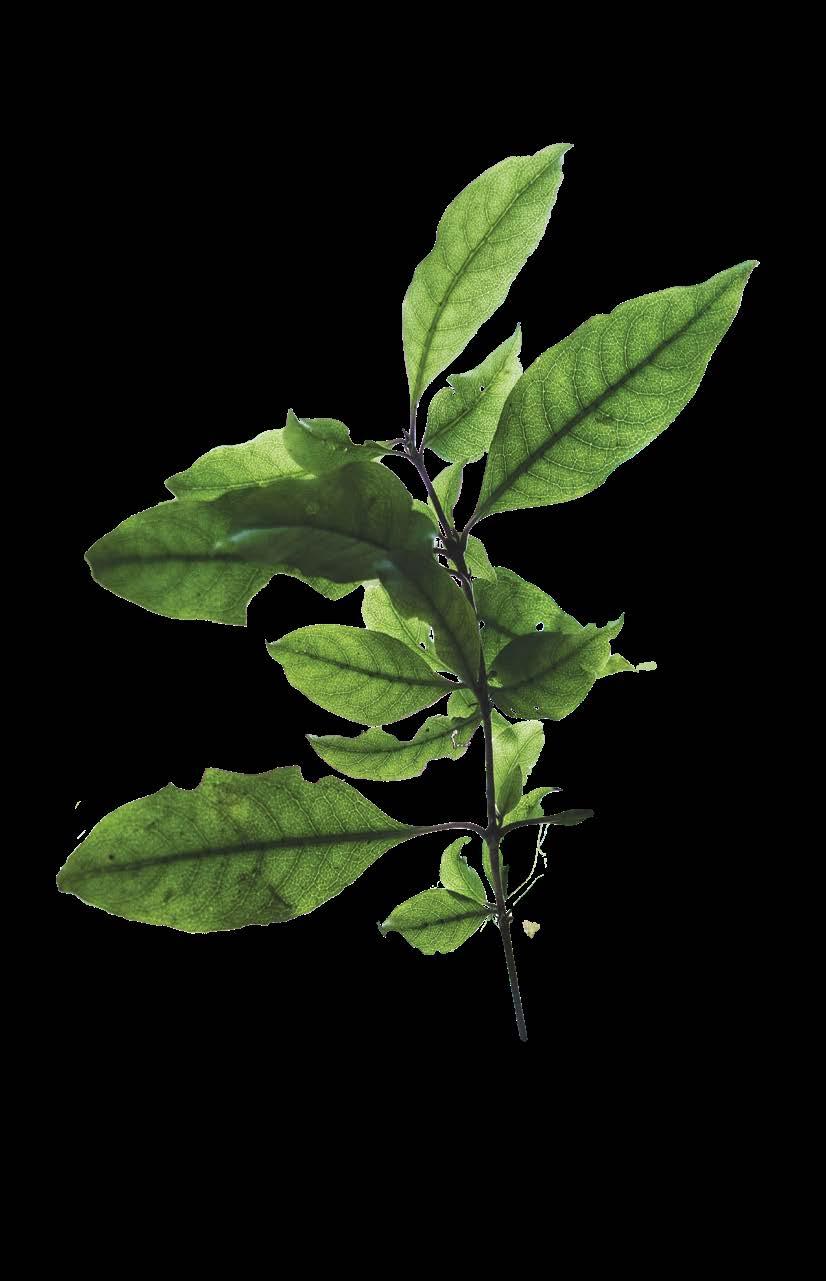
“I like the traditional views that nature should be regarded as an ancestor so that it means we will treat it with more respect. Recognising responsibilities over rights is a big goal and if I can help bring these perspectives into the council room, that would be great.”
Professor Iorns says it is difficult for individuals to know what to do to mitigate against climate change and environmental degradation, primarily because it is the “normal practices of our daily lives” that are degrading the environment. But, she says, individuals must call for systemic change.
We have to change the system...
“For example, if the options for bike riding and public transport are unavailable or simply not useful or attractive, then we won’t get people out of cars. We have to change the system and make a reduced emissions system more usable.”
While the COVID-19 pandemic has taken our focus away from what is needed in terms of environmental change, she says it has also shown that people’s priorities can change and we can do things differently.
“It almost makes bigger changes look more do-able.”

Te Herenga Waka—Victoria University of Wellington | Te Kauhanganui Tatāi Ture—Faculty of Law Page 13 V.ALUM 2021
Captured in the Lair of the film industry
Alumna Shelley Atkin’s career in film finance has taken her around the world and is set to continue blossoming as she releases her first feature film Lair with her production company Ditto Films, and begins a second, Bone Harvest.
It’s not an obvious path for most people who emerge from Te Herenga Waka—Victoria University of Wellington with a Bachelor of Law and Bachelor of Commerce, majoring in accounting. But it turned out to be the perfect combination for Shelley, who started in taxation at PricewaterhouseCoopers, before moving to the United Kingdom and after a couple of years, landing a job at media company 20th Century Fox.
“I count my blessings for this. As New Zealanders, we’re embedded with a great work ethic. However, having the combination of a law degree and an accounting degree, I feel set me apart from many other candidates, and helped open doors for me at the company.
“I began my time at the studio in a contracting role, moved to a permanent role within the second year, and after 16 years rose to the position of vice-president of EMEA (Europe, Middle East, and Africa) Theatrical Finance, and UK finance director, with around 40 countries reporting into me.”

Page 14 V.ALUM 2021
Shelley Atkin
Shelley enjoyed her time at university, and studied alongside people who remain friends to this day. “I was really fortunate with my education and the analytical skills I developed learning with the Socratic Method were not only helpful during my time at university, but also have remained useful during my career to date.”
Shelley specifically recalls Professors Bill Hastings and John Prebble. “John Prebble used to play baroque music which was soothing and he swore was magic for learning. He taught tax law and perhaps his musical approach worked as his was the best grade I received at university. To this day when it comes to tax law I can logic my way through it—which I swear is because of his teaching.”
“I was really fortunate with my education and the analytical skills I developed learning with the Socratic Method were not only helpful during my time at university, but also have remained useful during my career to date.”
Working in film you are expected to work hard, but there is a fun side to it. “I mean, let’s be honest, part of my job was going to movie premieres, and travelling loads. There was a bit of glamour, and fun. People in the media industry are really good fun, and I was never bored.
“In terms of the job itself, we didn’t have legal counsel in-house for the movie distribution side of the business, so that came through me. I had this great combo of business affairs, financial, and commercial management,” says Shelley. Her job was broken down into business development and financial forecasting. She would make commercial performance analyses of each of her territories, manage their budgets, make sure they were operating efficiently, negotiate deals with suppliers and regional media vendors, and report to the accounting function in the United States. “Whenever we had a film coming up, we were budgeting and managing
profit and investment at least six to 12 months in advance.

“We didn’t really have formal annual fiscal budget, it was more of a rolling live forecast responsibility, so a lot of my job was having common sense and experience about what type of films would perform well. If I could see issues cropping up, I flagged those to the people in the States as early as possible!
“It was a wild ride, and you only get it right maybe 80 percent of the time,” she says. Some films flop, and some overperform. “The Greatest Showman was a surprise hit, and Avatar—we knew it would do well, but we didn’t know it was going to be the biggest film ever. If you could bottle that magic up and make it happen every time, it would be great!”
While at Fox, a highlight was setting up a new box office in Russia. “In 2006, I found myself, age 30, on a plane going to Moscow to set up a distribution office, and at that stage, Russia didn’t translate anything into English so I was perpetually lost. But after six months and a lot of learning about how to deal with different cultures, I succeeded, and I’ve maintained those relationships to this day.”
When she learnt that Disney was acquiring 2oth Century Fox, Shelley felt ready to go. She and her fiancé were planning to return to New Zealand in early 2020, but COVID-19 has put those plans on hold for now.
She hadn’t planned to become a producer, but knew she wanted to stay in the industry and could see opportunities in production as well as in the expanding digital media distributors, like Netflix. She became a producer for her horror film Lair at the request of her fiancé, writer and director Adam Ethan Crow.
She was drawn to Lair, not only because of Adam’s involvement, but also because as a horror fan she could see its potential. The central characters are an LGBQTI+ all-female family “The way Adam pitched it, I could see what was unique about it— I consume a lot of horror, but much of
‘No, you can’t do this’. But this was more can I fix? How can I make this happen? The personal growth was immense,” says Shelley. “And finding out I can work with my partner and we don’t kill each other, was quite a nice bonus.”
“...the different experience of working on a film set compared to a corporate office is mind-blowing.”
While COVID-19 interrupted both the post-production and release schedule of Lair, it’s now being released around the world, including in New Zealand.
Shelley says that if you are interested in getting into the production side of film-making, “Go on your gap year—in New Zealand or overseas—get a job as a runner on any production and work out what the roles are, what you would like to do; work hard, say yes to everything, and you’ll move up the ladder.”
As far as the corporate side goes—don’t be shy, she says, get those credentials and then “just ask—hammer LinkedIn, and target the places you want to work. Of course, you must have an interest in film because that gives you the oomph to go the extra mile, but once you get your foot in the door, just work your ass off.”
Te Herenga Waka—Victoria University of Wellington | Te Kauhanganui Tatāi Ture—Faculty of Law Page 15 V.ALUM 2021
Watch the Lair trailer
Victoria University of Wellington Law Students’ Society’s year at a glance
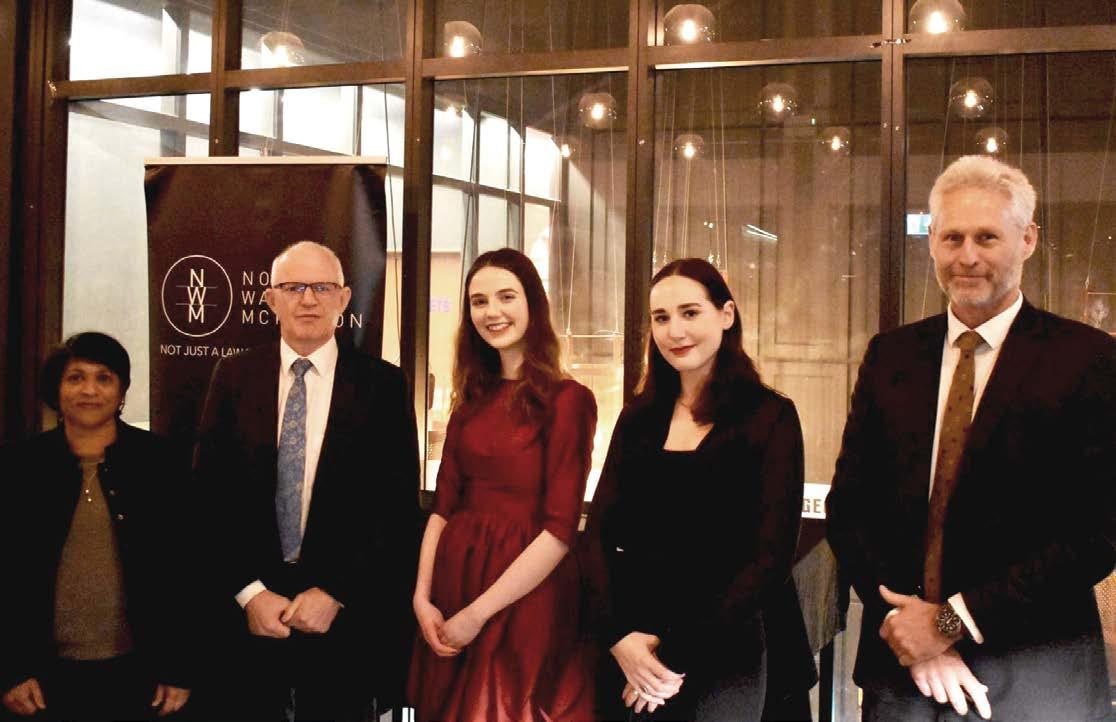



Students
start the year
enjoying an ice cream on the sunny day that was the Chapman Tripp Welcome Back BBQ to
Bell Gully senior mooting finalists pictured with Jenny Stevens, Dr Katie Elkin, and Justice Simon France
2021 Norris Ward McKinnon Family Law Moot winners Islay Aitchison and Susannah Harper
Page 16 V.ALUM 2021
At the IPLS Patron’s lecture, Cassie Nicolson, Sir Geoffrey Palmer, Meghan Grant and Natalie Vaughan
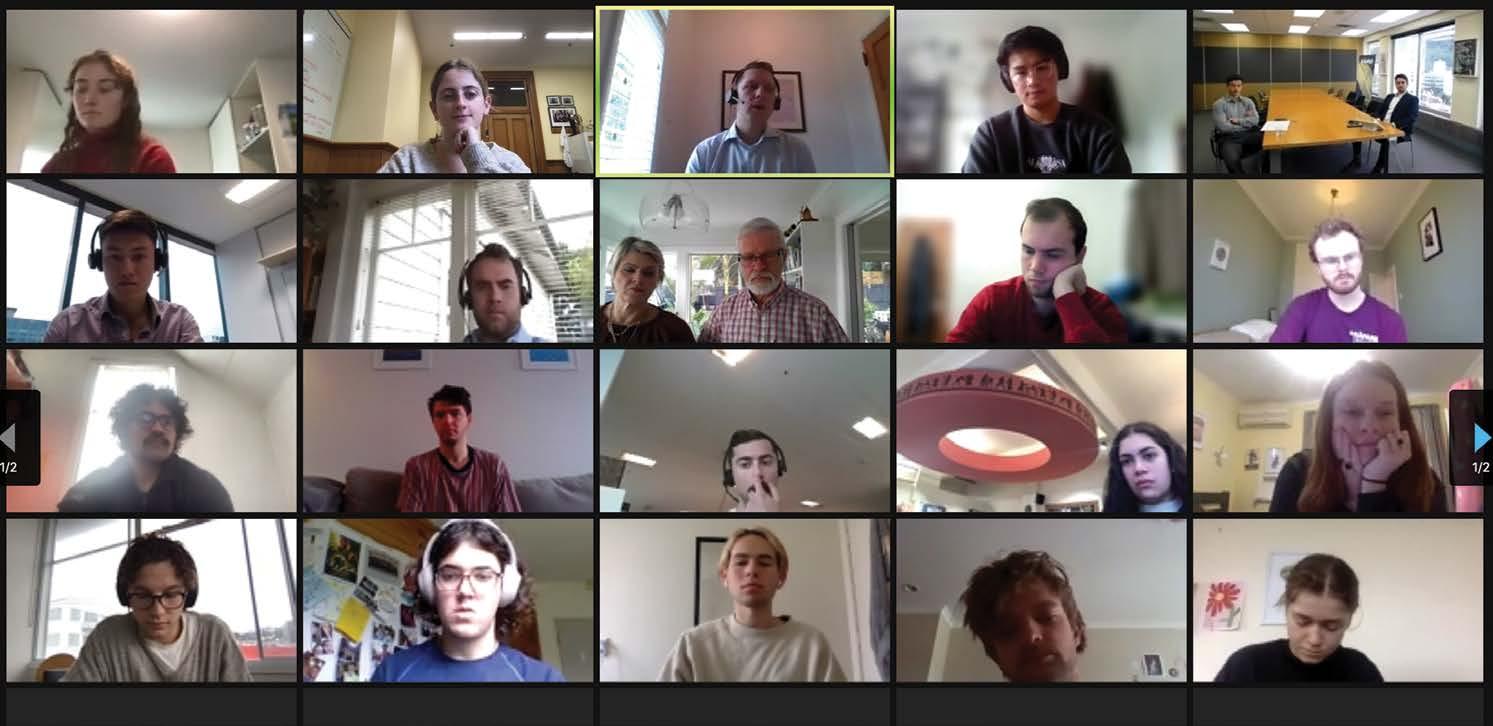
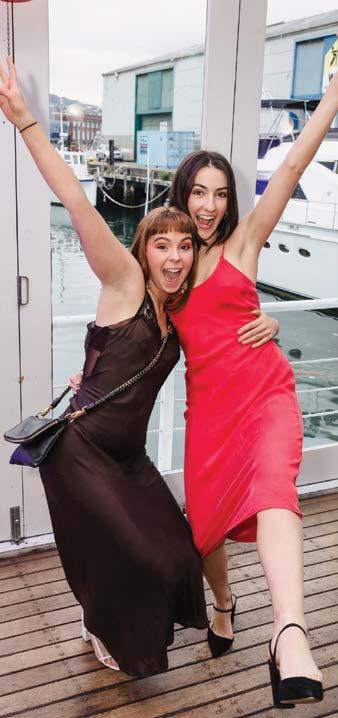
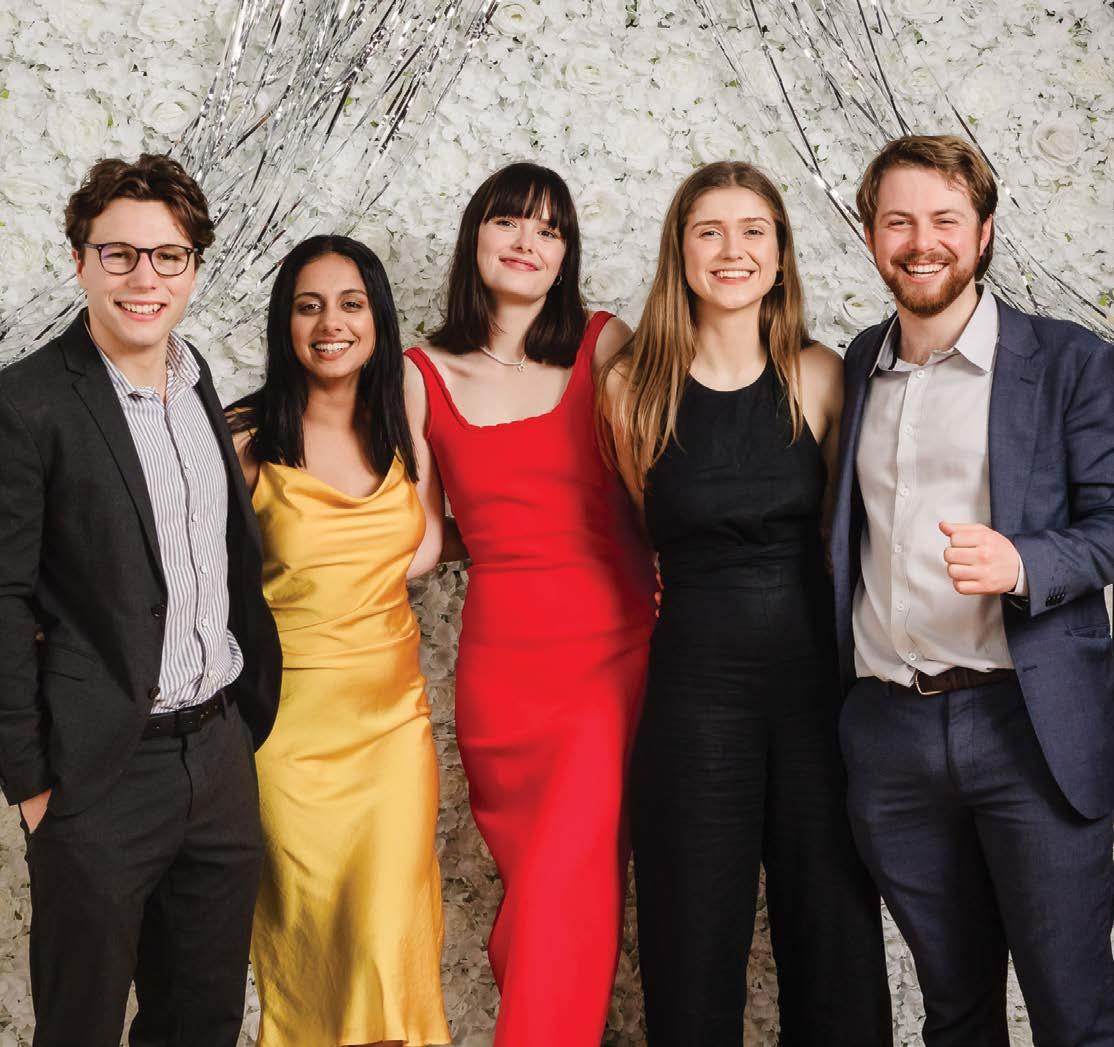

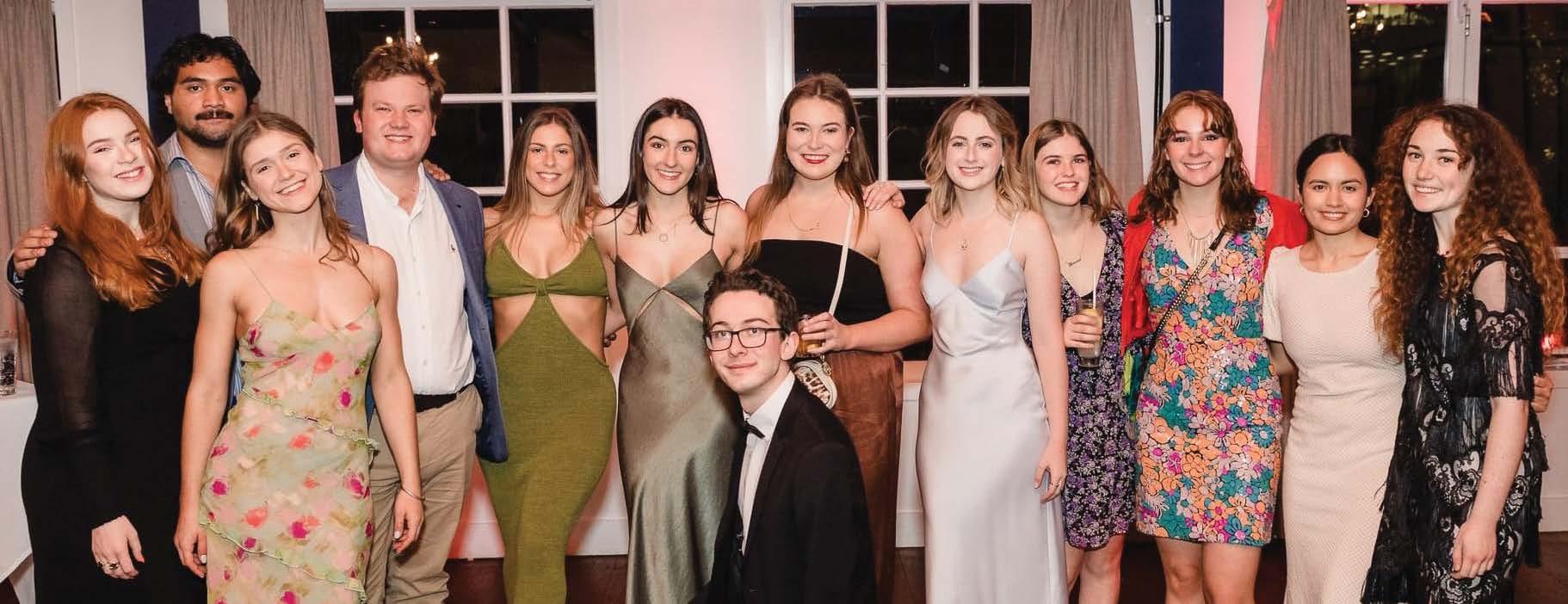
 All dressed up for ComplyWith Cocktail Night Simpson Grierson Men’s Mental Health Breakfast—Zoom edition
Meredith Connell Community Corner
At the IPLS Patron’s lecture, Sir Geoffrey Palmer, and Kristy McDonald QC
Our members at the College of Law, Law Ball
All dressed up for ComplyWith Cocktail Night Simpson Grierson Men’s Mental Health Breakfast—Zoom edition
Meredith Connell Community Corner
At the IPLS Patron’s lecture, Sir Geoffrey Palmer, and Kristy McDonald QC
Our members at the College of Law, Law Ball
Page 17 V.ALUM 2021
Wine and Cheese with big cheesy smiles from Kimberley Barker and Aoife Crumley
Te
Herenga Waka—Victoria University of Wellington | Te Kauhanganui Tatāi Ture—Faculty of Law
Starting the year with the Staff versus Students cricket fixture umpired by Sir Geoffrey Palmer
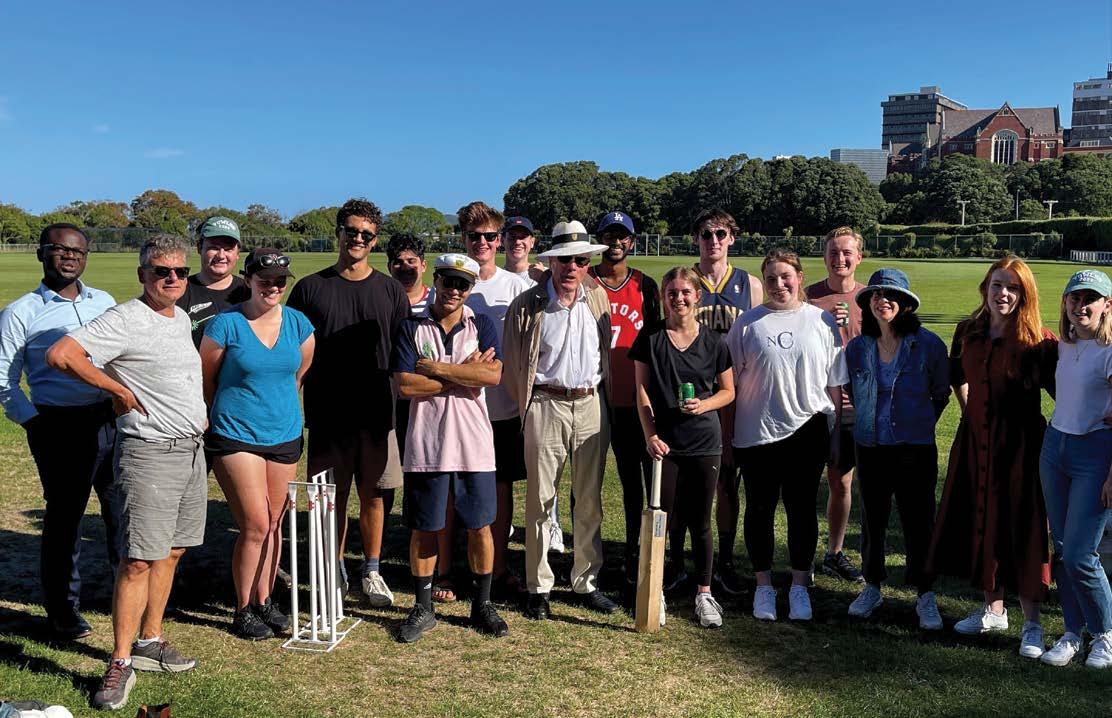
Our thanks to Chapman Tripp for hosting our Pink Breakfast
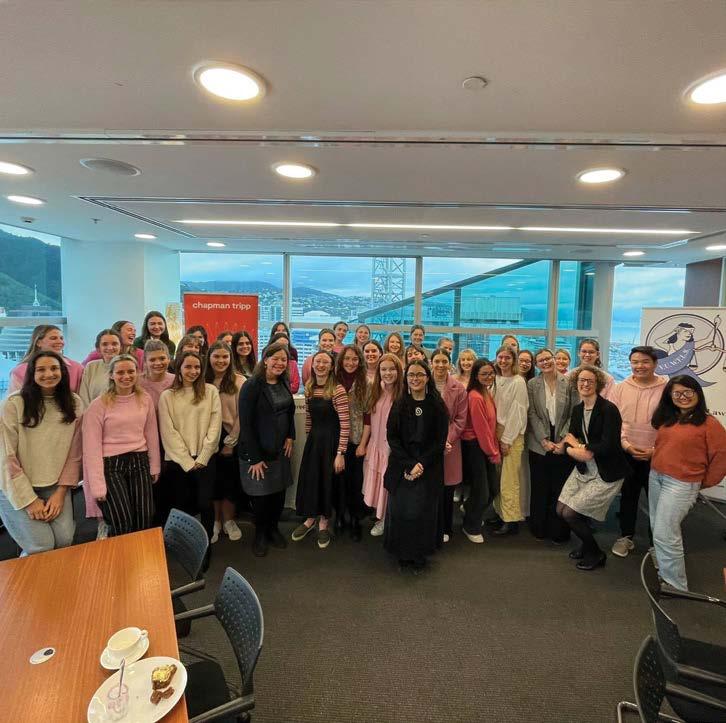
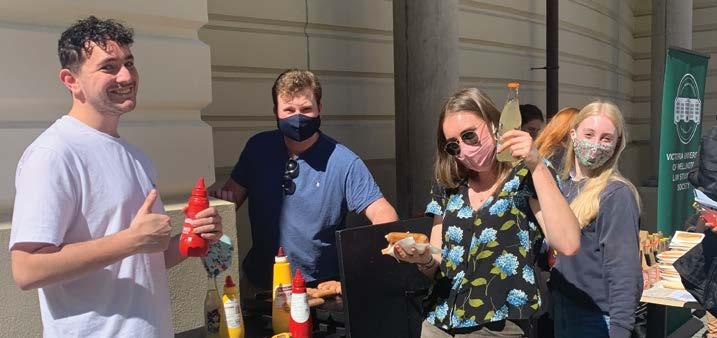
All representative groups at the Law School came together to hold an Equity Alumni Panel with the College of Law
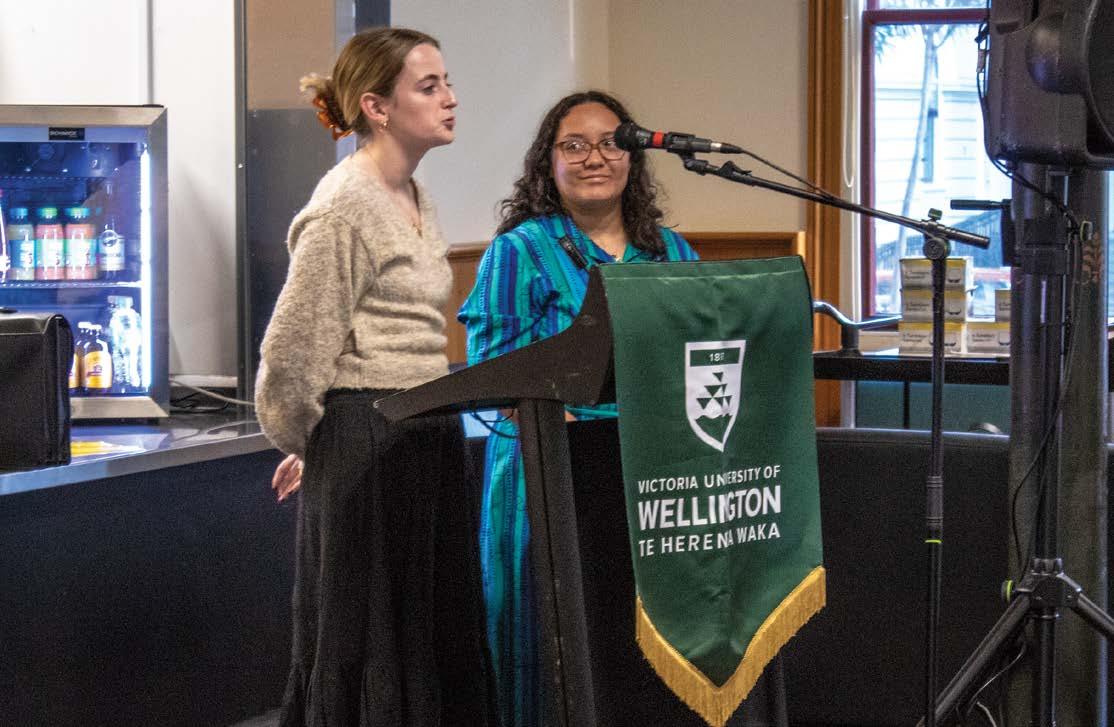
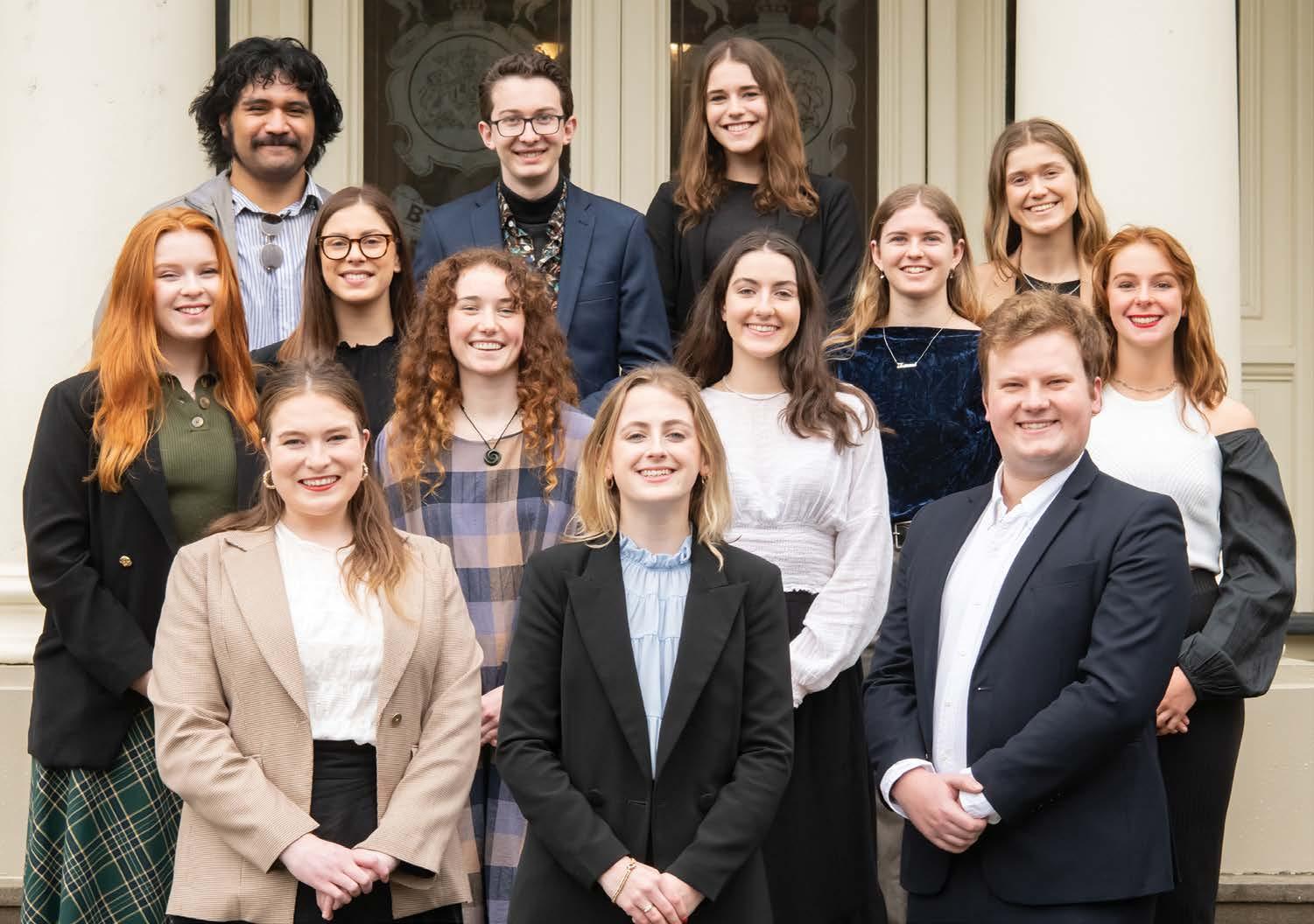
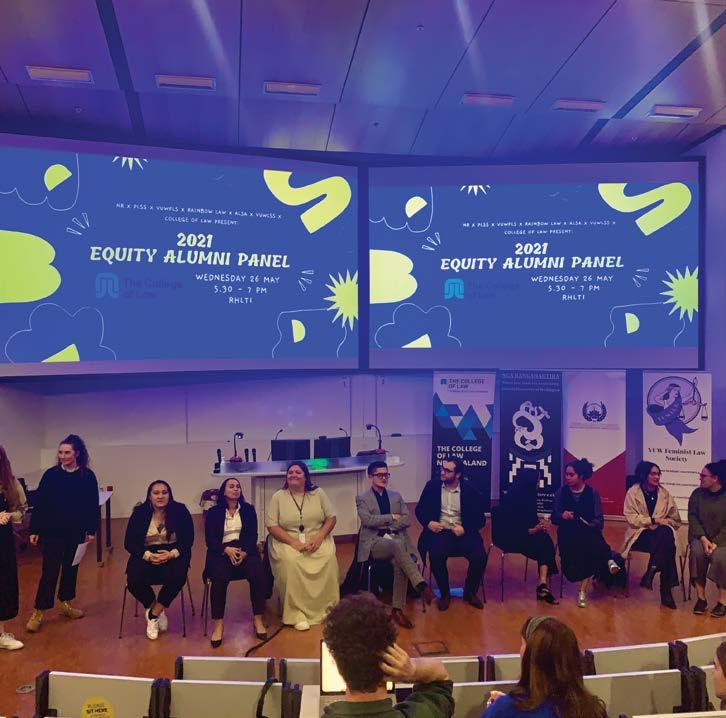 The 2021 executive team
Wellness Week enjoyed by Jono Sylvester, Ben Julian, Ellen Lellman, and Anna Dombroski
President Meghan Grant with one of Ngā Rangahautira’s co-tumuaki Rhianna Morar at the Clerkship evening
The 2021 executive team
Wellness Week enjoyed by Jono Sylvester, Ben Julian, Ellen Lellman, and Anna Dombroski
President Meghan Grant with one of Ngā Rangahautira’s co-tumuaki Rhianna Morar at the Clerkship evening
Page 18 V.ALUM 2021
Simpson
The Chapman Tripp Junior Negotiation took place via Zoom this year
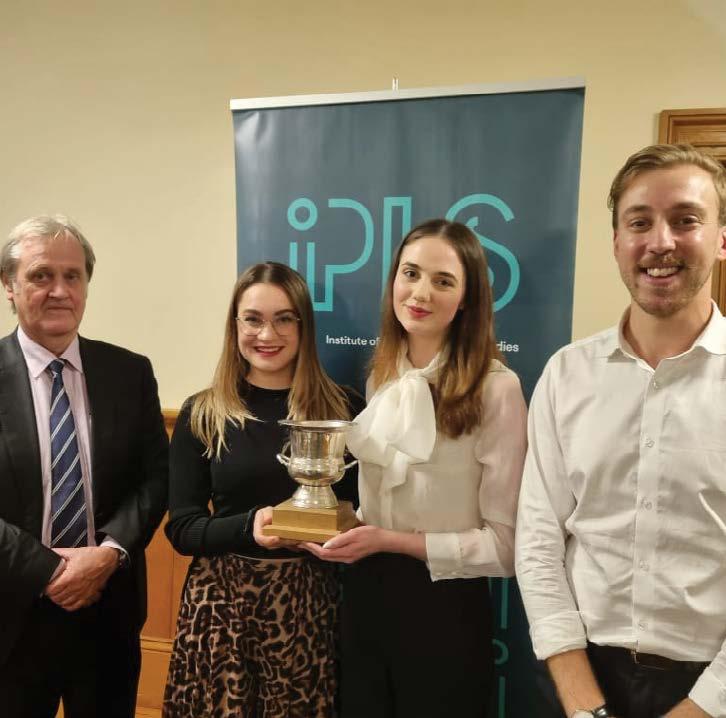
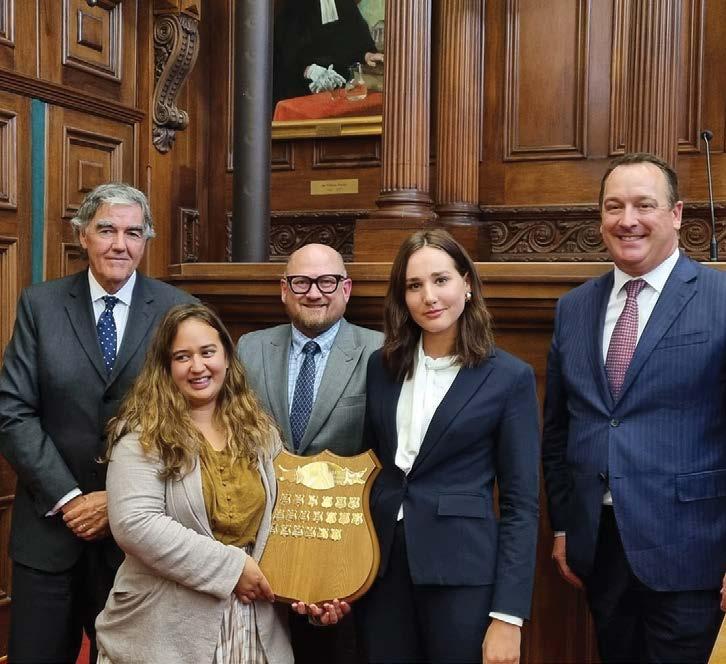
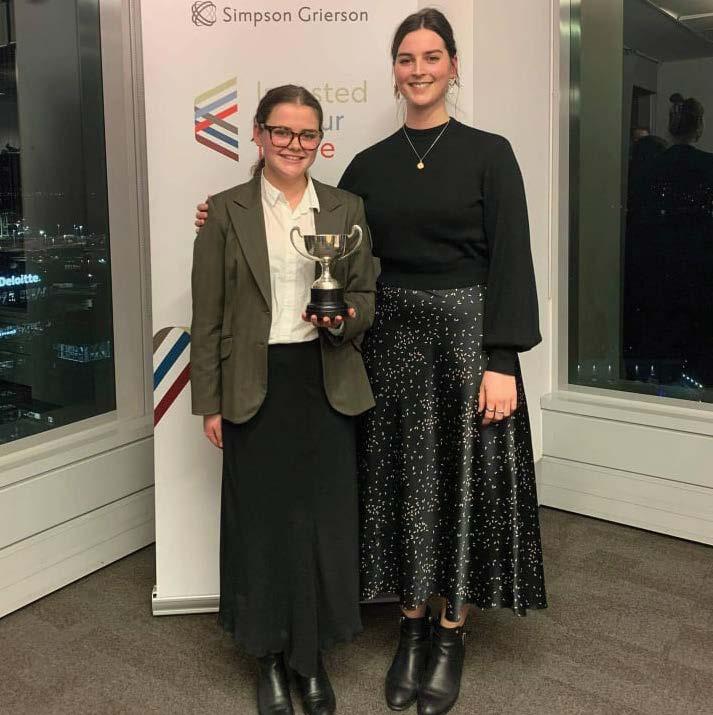



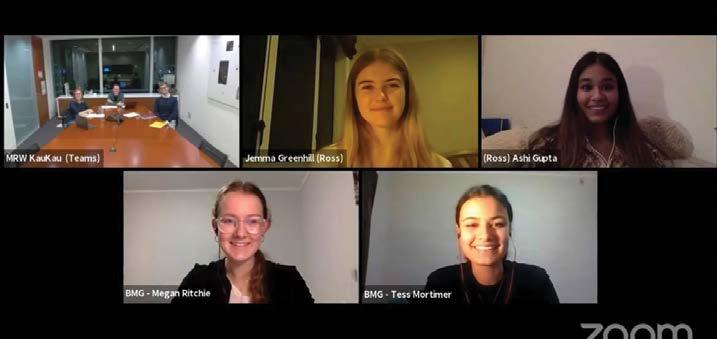 Grierson Client Interviewing winners Sophie Brokenshire and Emma Pullen
Bell Gully Junior Mooting finalists pictured with judges Justice Gwyn, Rachael Brown, and Professor Petra Butler
MinterEllisonRuddWatts Senior Witness Examination finalists with Associate Judge Johnston, Michael Bott, and Richard Gordon
Buddle Findlay Senior Negotiation winners with Professor Gordon Anderson, Scott Barker, and Professor Petra Butler
Grierson Client Interviewing winners Sophie Brokenshire and Emma Pullen
Bell Gully Junior Mooting finalists pictured with judges Justice Gwyn, Rachael Brown, and Professor Petra Butler
MinterEllisonRuddWatts Senior Witness Examination finalists with Associate Judge Johnston, Michael Bott, and Richard Gordon
Buddle Findlay Senior Negotiation winners with Professor Gordon Anderson, Scott Barker, and Professor Petra Butler
Page 19 V.ALUM 2021
MinterEllisonRuddWatts Junior Witness Examination finalists with Justice Churchman and Raphael Solomon The IPLS Senior Client Interviewing winners with our very own Gordon Stewart and Fayez Shabaz
Te Herenga Waka—Victoria University of Wellington | Te Kauhanganui Tatāi Ture—Faculty of Law
Graduating address: Billie Haddleton, class of 2021
It’s hard to know how to summarise a Victoria University of Wellington degree in just five minutes, because it is so much more than the assessments, the lectures, and the piece of paper that we’ve each received today. While writing this speech, I have had the pleasure of reflecting on what it means to study at Victoria, and have done so with a certain tinge of nostalgia.
Studying at Victoria is battling that chaotic wind which funnels down Featherston Street that makes us even more dishevelled for a morning lecture, it is attending that mid-week students’ society event which makes you slightly under-the-weather for the Friday morning tutorial, and it is running into the celebrity cat, Mittens (if you are having a lucky day). Studying at Vic is also about being surrounded by immense civic engagement. You can finish a lecture at 12.30 and be in a protest by 1.00, whether that be for School Strike for Climate or March on Midland.
So, on this trip down memory lane, I found three key things I’d like to address today. These are the things I’ve valued most—community; the thing I found most challenging—studying during the pandemic; and the biggest lesson I’ve learnt—the immense privilege I have as a degree holder.
Family, friends, classmates, lecturers, tutors, the Vic Books café staff… I don’t
think it is an exaggeration to say that community is key to completing a degree. For many of us, study formed just one part of our busy lives. And although sometimes it could feel overwhelming, it was in those moments that the people made the difference. The random people you kind of got to know in the library, the student memes, the friends from O-week that you might still be sitting next to today.
Of course, the university community would not be complete without its lecturers. We are truly lucky to have world-class academics teaching us at Victoria who are incredibly passionate about their field of research and so often go out of their way to engage with their students. And ultimately, anyone who marks 300 hand-written exams within a few weeks has my eternal gratitude.
This community has supported each of us through our studies and is something I’m excited to maintain in the years to come.
When I think of my greatest challenge at uni, it is the disruptions from the pandemic. I recognise that we are all extremely lucky to be able to be here today celebrating together, when so many communities around the world are not able to do so. But in saying that, the challenges posed by Covid were second to none, and I am so proud of the resilience shown over the past year by all graduates in this room.
Just three weeks into Trimester 1 in 2020, the pandemic hit Aotearoa New Zealand. The country went into lockdown, a trip to the supermarket became a luxury, and lectures were watched from bedrooms. I will be forever grateful for the tireless efforts displayed by teaching and professional staff to run online courses, all whilst experiencing a pandemic themselves. But, no one can deny that studying by distance was hard. The most challenging elements of university— the assessments—continued. But the pandemic had taken away the joys of university—the faces in the corridor, the coffee breaks, and the opportunity to intellectually engage with lecturers and other students. In short—COVID-19 took away our community. I think I eventually got so desperate to see my classmates again that I would have even turned up to an 8.30 lecture!
Despite these challenges, every graduate in this room achieved something amazing. You participated in Zoom tutorials, talking to students on the other side of a screen. Many of you would have been in cold and damp flats with dodgy internet but with no desk. Others did uni from lounges in crowded homes. Some of you were essential workers and students.
After being postponed twice, last year’s graduation ceremonies in December were billed ‘the covid
Page 20 V.ALUM 2021
Tēnā koutou katoa Chancellor, Vice-Chancellor, family, friends, university staff, and, of course, fellow graduates.
graduation’. I believe that this ceremony is equally, if not more deserving, of the name. Every graduate in this room can say that they studied through a pandemic, coming out the other side with a degree in hand. Each of you navigated your own unique challenges posed by covid with outstanding resilience. We all faced, dare I say it, an unprecedented situation. And for that, you should be immensely proud.
Finally, I’d like to reflect on what has been, for me, the key learning at university—that is, understanding the immense privilege we have as degree holders. Our Pipitea campus is between Parliament, the Wellington business district, and the Courts—truly an incredible location for anyone studying in the School of Business and Government or the Faculty of Law. But it is also where we have learnt of injustices committed in those very buildings—a system of property law founded on theft of land, seemingly ever-increasing inequality, and a justice system that hyper-criminalises Māori. I learnt from a recent graduate speaker that, worldwide, only seven percent of people have an undergraduate degree. That means that each graduate in this room is in an incredibly privileged position. As the newest Victoria graduates, we must not forget or ignore the learning from our degrees but aim to achieve a fairer society for all, not just for the seven percent this ceremony represents.
In the tradition of all graduation speeches, I’d like to end by thanking everyone who has supported us graduates through our degrees. We could not have made it here without the support of whānau, lecturers, university staff, friends, flatmates, and, of course, StudyLink. To the graduates, I encourage each of you to reflect on your three, four, five, or even six years of uni over the coming days. Be incredibly proud of what you have achieved. Be proud to be a Victoria University of Wellington grad, and congratulations!
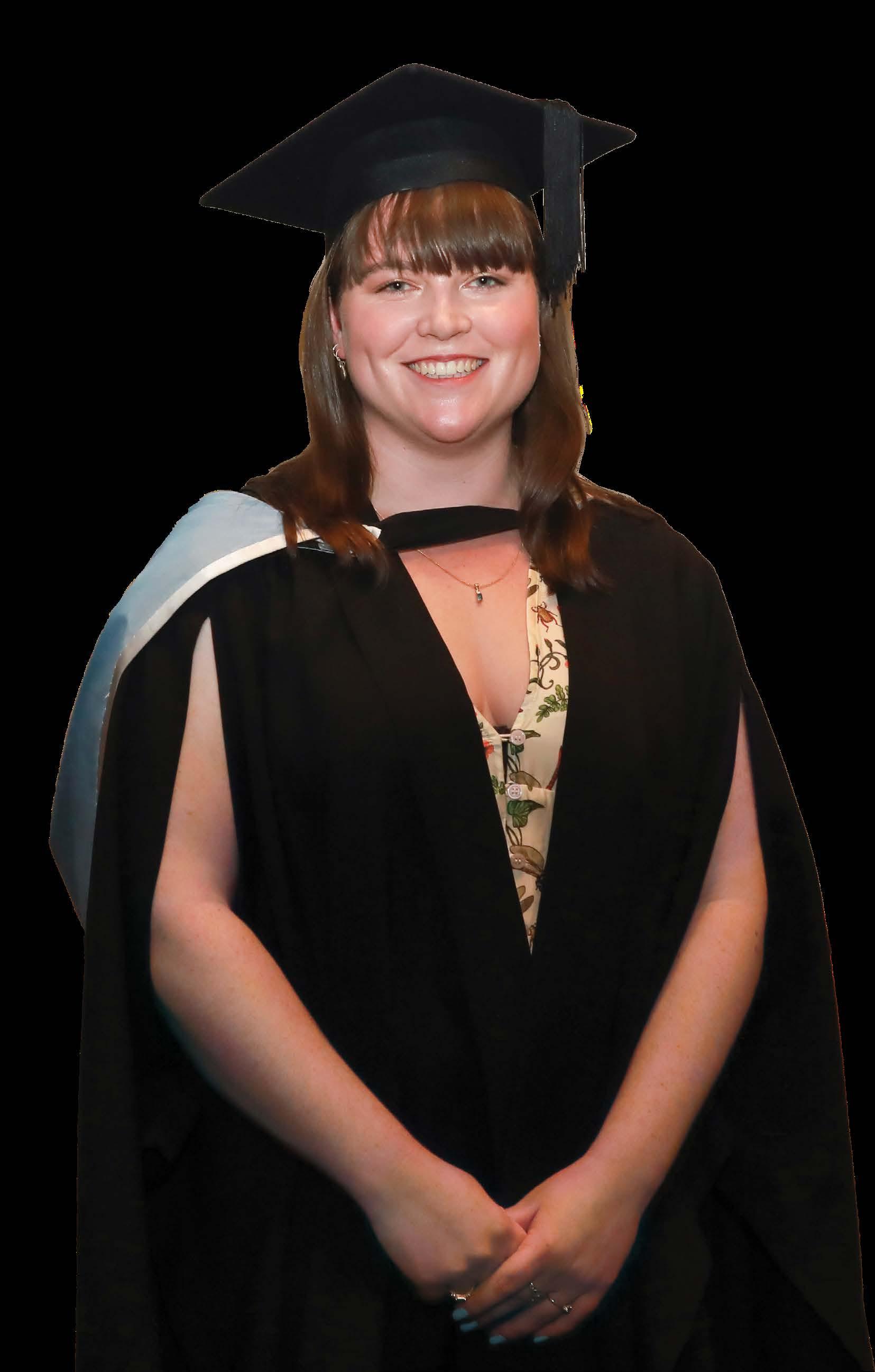


Page 21 V.ALUM 2021
Watch Billie’s address
New scholarship opens up opportunities for Māori and Pasifika law students
A desire to help more people fulfil their true potential through access to a university education is the motivation behind a new law scholarship at Te Herenga Waka—Victoria University of Wellington.

The Te Ao Mārama/Le Ao Malama/ First Light Māori and Pasifika Futures in Law School-Leaver Scholarship aims to not only cover the costs for a number of first-in-family Māori and Pasifika students to study Law, but to provide them with social and professional support, too.
The idea for the scholarship came about in 2020 during COVID-19 alert level four, when university staff were invited to voluntarily reduce their income by 20 percent through salary giving. Professor Mark Hickford, Pro Vice-Chancellor for Government, Law and Business, saw it as an opportunity to address an imbalance that persists in law schools.
“While the numbers of Māori and Pasifika students studying law have increased, law schools are still stubbornly elitist, as demonstrated by the small proportion of students of any ethnicity from decile one to four schools,” Professor Hickford says. “We asked ourselves how we can make a difference. We settled on a
fellowship package with financial support through scholarships—particularly for accommodation—and social and professional support for students, too. This will make the prospect of a career in law a realistic and attainable goal for these first-in-family students.”
Professor Hickford contributed a portion of his personal annual income to the scholarship fund. A friend and supporter of Professor Hickford’s objectives also anonymously contributed to the fund. Once the fund reaches $100,000 it can be endowed, securing the future of the programme in perpetuity.
“This will make the prospect of a career in law a realistic and attainable goal for these firstin-family students.”
“We want to ensure this scholarship is sustainable and reaches as many students as possible, so we need the generous financial and professional support of our community,” says Professor Hickford.
Page 22 V.ALUM 2021
Te Herenga Waka’s Assistant Vice-Chancellor (Pasifika), Associate Professor Hon. Luamanuvao Dame Winnie Laban, says the scholarships represent a fantastic opportunity to increase the participation of Māori and Pasifika students.
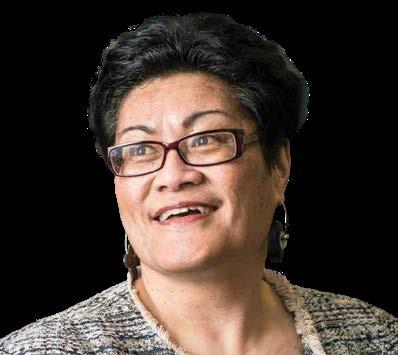
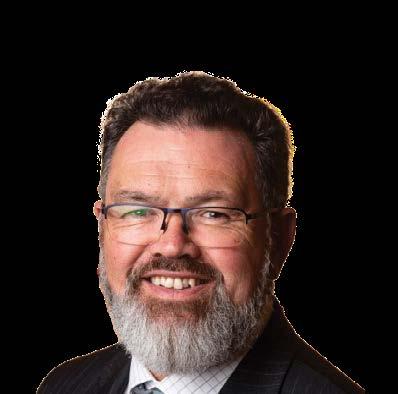
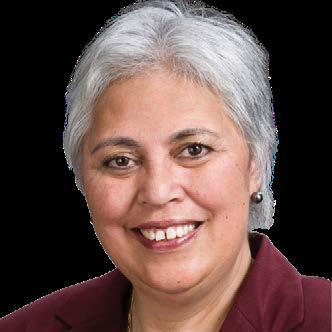
“We are proud to work with amazing and ambitious young people and we hope, with the support of our wider community, to make a small but significant difference to the lives of these deserving young people to succeed at university and make a difference to the future of their whānau,” she says.
Distinguished alumnus and distinguished fellow, Hon. Justice Sir Joseph (Joe) Williams, believes the scholarships will help address the issue of diversity in the legal community.

“In law schools, some progress has been made on gender and ethnic diversity in the past 30 years, but not nearly enough. And almost no progress is apparent with respect to socio-economic diversity. I believe that fellowship from the law community will help future students in the most positive way.”
We would be delighted to work with you to help us reach our goal of a more diverse and inclusive legal community. For more information about how you can support Te Ao Mārama/Le Ao Malama/First Light Māori and Pasifika Futures in Law School-Leaver Scholarship, please contact Victoria Beckett, development manager for Government, Law and Business at victoria.beckett@vuw.ac.nz or on +64 21 0254 1461.
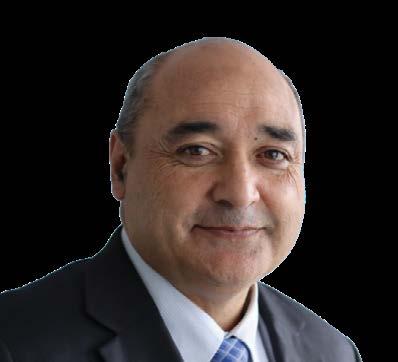
We asked ourselves how we can make a difference.
Professor Mark Hickford
Hon. Luamanuvao Dame Winnie Laban
Hon. Judge Heemi Taumaunu
Te Herenga Waka—Victoria University of Wellington | Te Kauhanganui Tatāi Ture—Faculty of Law Page 23 V.ALUM 2021
Hon. Justice Sir Joe Williams Judge Ida Malosi
Disability rights on the national stage
Leaving her safety bubble, advocating for others, living with a disability, and conquering Wellington’s Bachelor of Laws with Honours, Alice Mander hasn’t lost sight of elevating the voices of the disabled community—something that also hasn’t gone unnoticed.


Page 24 V.ALUM 2021
Alice Mander
Alice was recognised by the Young Women’s Christian Association (YWCA) as one of 25 inspiring women under 25 in 2021 for her work on advocating for disabled rights. She met the other 24 nominees in Auckland where it cemented that supporting one another and being inspired by other people is the biggest motivation and influence for her.
The YWCA is a global movement and feminist organisation working for women’s empowerment, leadership, and rights. Its ethos is based on supporting women and girls of Aotearoa who face inequalities and supporting the wellbeing, development and achievement of women and girls in a society where women are still not treated as being equal to men.
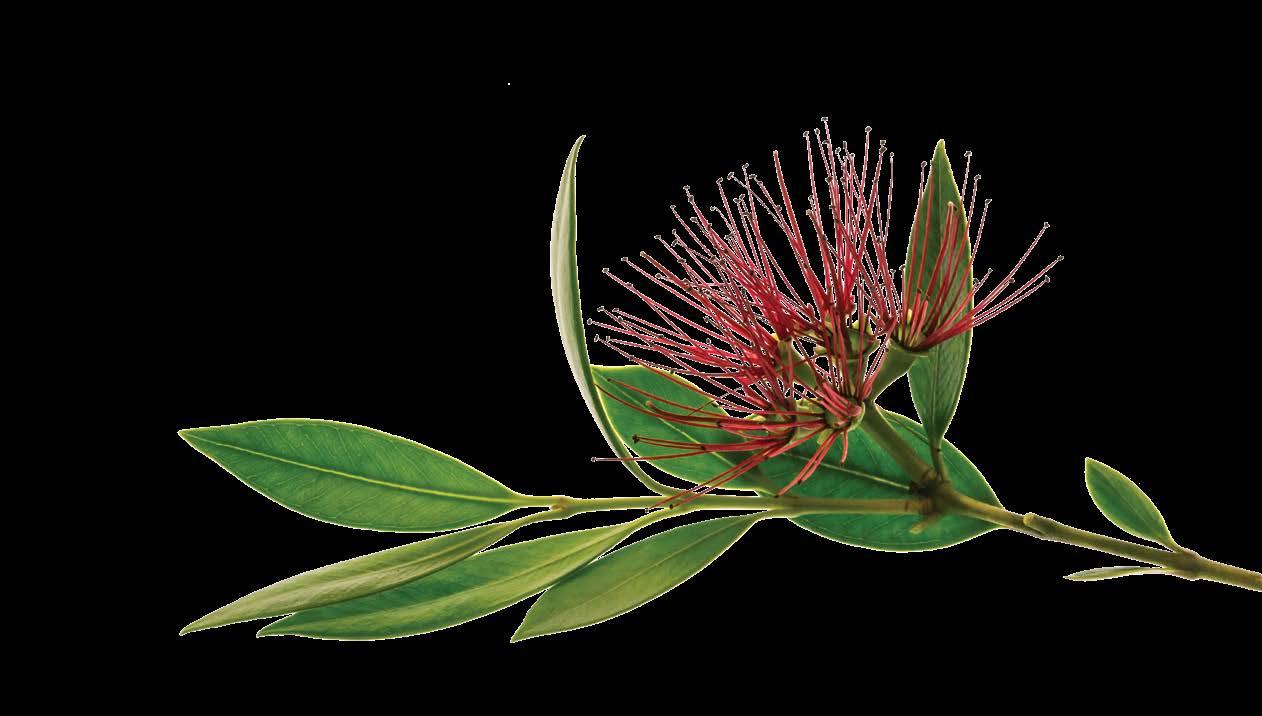
On being nominated, Alice says, “I was quite humbled because there are so many amazing young women and young people in general I come across every day who deserve recognition.”
Alice didn’t truly get immersed in being part of the voice for disabled people until she moved to Wellington as, she says, “It took me a while to become comfortable in my own skin.”
She says, “There is a lack of representation and people don’t really talk about disability in the same way they talk about other minorities. I have been inspired to change that.”
Alice has been involved heavily in student politics and channelled her passions into establishing the National Disabled Students’ Association in 2020, of which she is now president. She says, “The association represents disabled tauira at tertiary level nationally… we work with the Government to get the disabled voice into that space when it comes to certain policies or a new law that will affect students.”
“It is challenging being in a space where you have less power…and trying to balance work with university but it is really important.” Alice says she couldn’t do the work she does at a university level without the support from her peers—some of whom have different but similar kaupapa for elevating minority voices.
“I am very lucky with my education and background so I want to use that to create pathways for others and also just be a voice for those who feel disempowered or don’t feel they don’t have one, which would be very relevant if I became a lawyer.” Wellington could be the place where Alice can put those skills into practice.
“I’ve always loved Wellington. I love the place; I love the city with Parliament right here.”
Alice stands by the personal philosophy: “You’re not disabled by your personal impairment—rather by society.” Broadly, she’d like to see a society that doesn’t disable people, doesn’t create systems that exclude them, and where disabled people can have their integrity acknowledged.
The law makes a massive difference, but Alice believes it needs diversification. Alice wants to see more representation among the legal environment with disabled people included in that change to allow them to speak out about their rights or issues they face and hopefully create more leaders for disabled people—“when I leave university, that would be the dream.”
Te Herenga Waka—Victoria University of Wellington | Te Kauhanganui Tatāi Ture—Faculty of Law Page 25 V.ALUM 2021
“You’re not disabled by your personal impairment— rather by society.”
Law’s new distinguished fellows
In addition to our three distinguished alumni award winners, six other high-profile leaders in the legal community have recently accepted positions as distinguished fellows for the Law School.
Supreme Court judge the Hon. Justice Sir Joe Williams (Ngāti Pūkenga, Te Arawa) (LLB, 1986) became, at the age of 38, the youngest person to be appointed chief judge of the Māori Land Court. In 2004, he was appointed chairperson of the Waitangi Tribunal. After moving to the High Court in 2008 and the Court of Appeal in 2017, he became the first Māori to be appointed to the Supreme Court in 2019. He became a Knight Companion of the New Zealand Order of Merit in the 2020 New Year Honours.
Māori Land Court Deputy Chief Judge Caren Fox (Ngāti Pōrou) (LLB, LLM [First Class Honours], 1997) is the resident judge for the Tairāwhiti District of the Māori Land Court. Before becoming a judge, Deputy Chief Judge Fox was a lecturer in law at Te Herenga Waka, and a senior lecturer in law and director of Graduate Studies at the University of Waikato. She has acted as legal counsel for Treaty claimants and Māori land clients. She is also a Waitangi Tribunal member and has been a presiding officer for a number of claims.
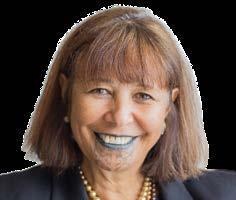
Dame Patsy Reddy (LLB, LLM [First Class Honours], 1979) is well known to the public as New Zealand’s most recent GovernorGeneral, having finished her five-year term earlier this year. She has a long connection to Te Herenga

Waka, having been a student, a lecturer and member of the University Council. Outside university life, she made an impact in corporate sector law and was involved in a number of high-profile mergers and acquisitions. She has extensive experience in governance and consulting roles for significant organisations across the private and public sectors, as well as not-for-profits. Dame Patsy was also a chief crown negotiator of Treaty Settlements.
Dame Sian Elias was the twelfth chief justice of New Zealand. She was the first woman appointed to that position and is also one of the first two women made Queen’s Counsel in New Zealand. She has represented claimants in a number of Treaty of Waitangi Tribunal hearings, has served as a law commissioner, and was appointed a QC in 1988. She was made a judge of the High Court in 1995. Dame Sian became chief justice in 1999, and in 2004 oversaw the establishment of New Zealand’s Supreme Court. She retired in 2019.
Hon. Justice Sir Terence

Arnold (LLB [Honours], 1970; LLM, 1972; LLD, 2018) is a Supreme Court judge, and a graduate and former lecturer at Te Herenga Waka. After time teaching at universities in Canada, he returned to New Zealand and became a barrister. After being made a QC in 1997, he became solicitor-general and chief executive of the Crown Law Office from 2000 until 2006. Sir Terence was then a judge of the Court of Appeal until

his appointment to the Supreme Court in 2013. He retired from the permanent bench in 2017 but has since been an acting judge, sitting as required.
Dame Susan Glazebrook studied and lectured in Law at The University of Auckland, before several years working in France helping with the resettlement of refugees. After returning to Auckland, she became a part-time lecturer in commercial law, then joined Simpson Grierson in 1986. In 2000, Dame Susan was appointed as a judge of the High Court, and to the Court of Appeal in 2002. In 2012, she was appointed as a judge of the Supreme Court. She is the president of the International Association of Women Judges.
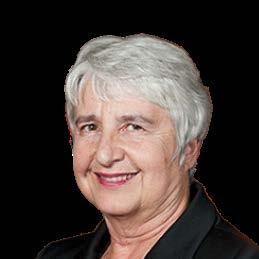
A distinguished fellow is first approached to see if they are agreeable to accept the position nominated by representatives from the Faculty of Law. The honorary roles are titular and there is no remuneration associated with them. They sometimes teach as an adjunct or teaching fellow. They can also provide stewardship and mentoring support, such as Justice Sir Joe Williams with Ngā Rangahautira. We are honoured that all six distinguished fellows have accepted this position, and we look forward to our continued association with these outstanding leaders of the legal fraternity.
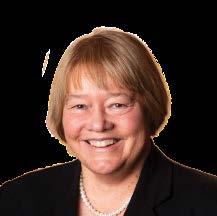
Page 26 V.ALUM 2021
New law commissioner
Professor Claudia Geiringer, Chair in Public Law at Te Herenga Waka— Victoria University of Wellington, has been appointed as a law commissioner and starts her new position in May 2022.
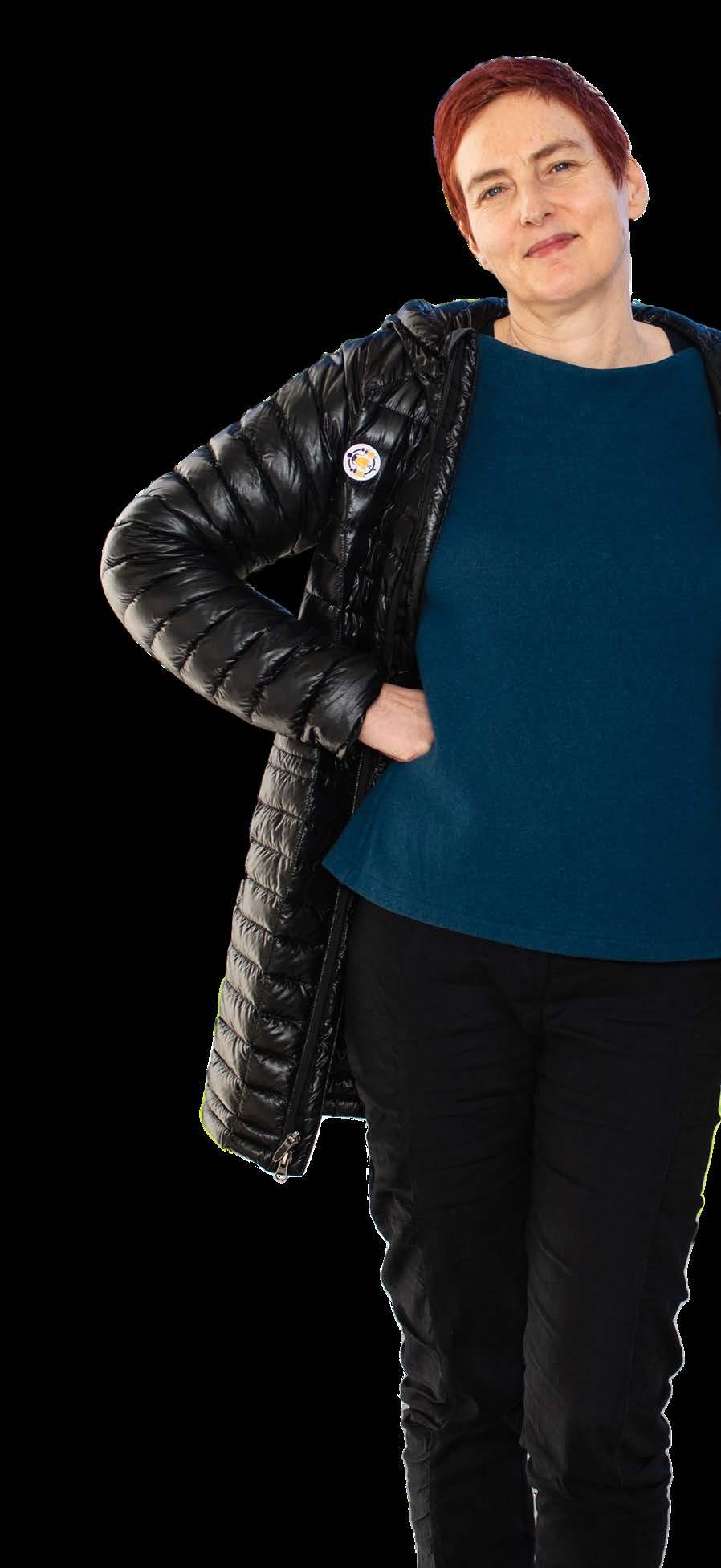
An expert in human rights, and constitutional and administrative law, Professor Geiringer is looking forward to the role at the independent Crown entity set up to review, reform, and develop New Zealand laws.
Professor Geiringer, who joined the Faculty of Law in 2002, says the Commission often takes on projects that are “particularly thorny or large scale”. Its current work programme includes projects on surrogacy, adult decision-making capacity, and the law of succession. More recently it commissioned a study paper on New Zealand’s legal and institutional framework for pandemics and other threats.
During her five-year term, Professor Geiringer hopes to follow in the path of other law commissioners, promoting the development of a high-quality, modern and accessible statute book.
“There is a long tradition of association between the Faculty of Law at Te Herenga Waka and the Law Commission. Two of the Faculty’s distinguished fellows— Sir Geoffrey Palmer and Sir Kenneth Keith—have served terms on the Law Commission as has Professor Geoff McLay, a current member of the Faculty.”
Professor Geiringer says that like its Māori name—Te Aka Matua—the Commission aims to provide a point of stability in the evolution of New Zealand’s laws.

“Te Aka Matua—refers to the stable parent vine that Tāwhaki used to climb up to the heavens to receive the three baskets of knowledge. His brother Karihi made the mistake of climbing up the aka taepa, or hanging vine, was blown around
violently by the winds of heaven, and fell to his death. Like the parent vine, the Commission aims to provide a point of steadiness or stability in the development of our laws.”
“A pressing challenge for New Zealand’s legal system at the moment is the better incorporation and reflection of tikanga Māori in all areas of New Zealand law,” Professor Geiringer says.
“The Law Commission is well placed to contribute to this kaupapa and has already begun to do so in significant ways. This makes it a particularly exciting time to serve a term on the Commission. I hope to stand alongside others in moving forward with this important project, which pervades all the Commission’s work.”
Earlier this year, Justice Minister Kris Faafoi announced a specific project reviewing the role of tikanga and te ao Māori concepts in law. The project will be led by High Court Justice Christian Whata, who has been appointed to the Commission for a one-year term.
Te Herenga Waka—Victoria University of Wellington | Te Kauhanganui Tatāi Ture—Faculty of Law Page 27 V.ALUM 2021
The rolling maul of the COVID-19 response
Since the start of the COVID-19 pandemic, the Faculty of Law’s Associate Professor Dean Knight has commentated on the legalities of pandemic-related restrictions in Aotearoa New Zealand.

The public and government law specialist has published on the democratic legitimacy of the elimination strategy, Aotearoa’s national legal response as part of Oxford University Press’s Lex Atlas COVID-19 encyclopaedia project, and the different ways the Government has been held to account for its work. He also frequently live tweets relevant court cases such as Borrowdale v Director-General of Health and recent challenges to vaccination mandates.
“Court watching has always been one of the bits of service the Faculty of Law has provided. It’s useful especially now because everything is so dynamic,” says Associate Professor Knight. We are all craving the up-to-date takes and analysis, he explains, and social media gives a vehicle to allow the experts to get to the audience quickly and directly.
The Government’s use of social media has also developed through the most recent phase of the pandemic, he says, and that engagement is to be welcomed. The pandemic has increased thirst for knowledge, data, reason, and justification.
“As well as more responsive social media, we are getting more timely access to cabinet papers—this is revolutionary in the common law world. But we need to keep the pressure on as there’s been some slippage recently.”
Aotearoa’s response to the pandemic has changed as the Government has needed to react to the most recent developments—and the legislation underpinning this response has changed as well.
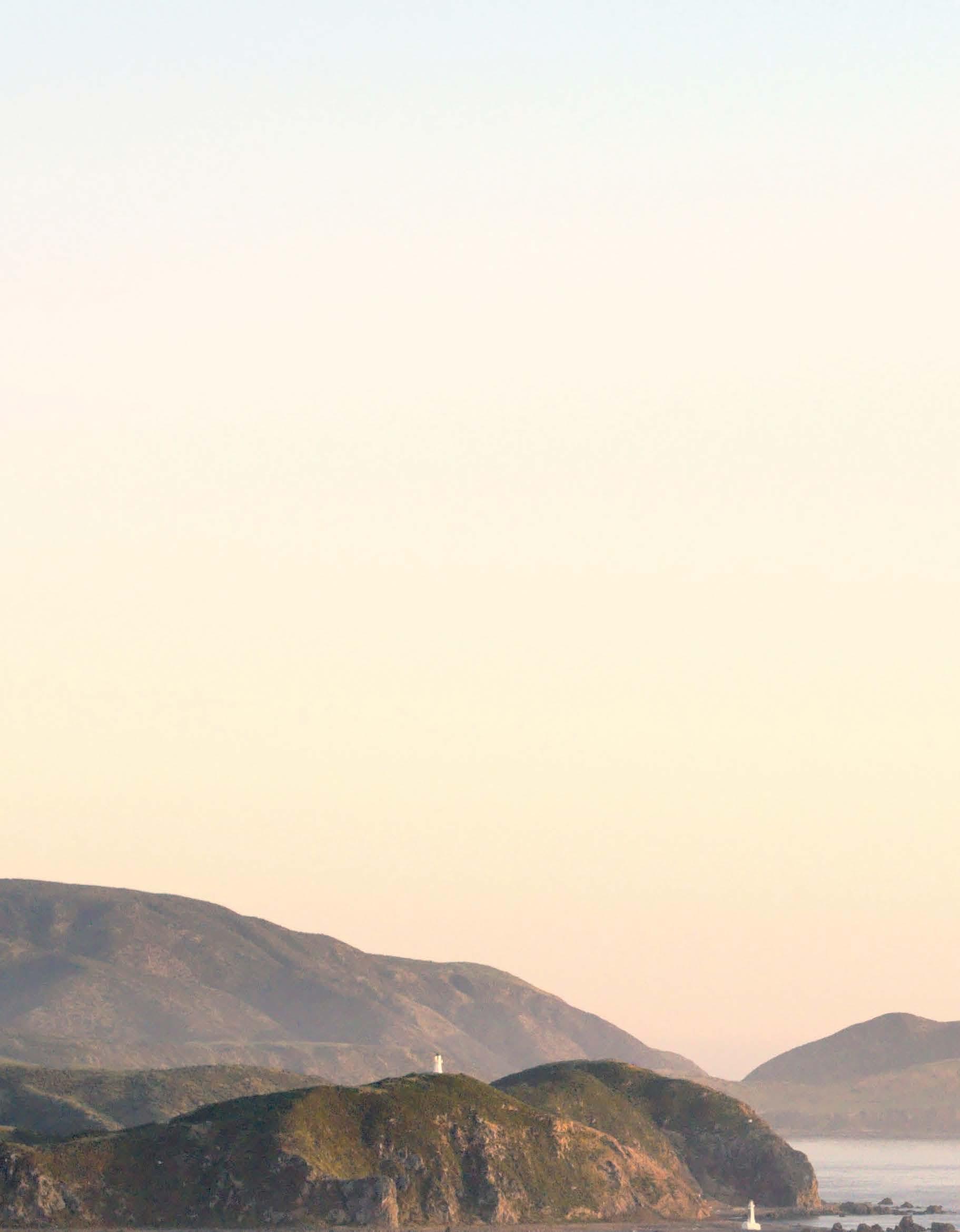
“I’ve always thought of the response as a rolling maul,” says Associate Professor Knight. “One of the most significant changes last year was ministerial dynamics following the election: a Minister for COVID-19 Response, changes to Cabinet committees, and changes to the faces sitting around the Cabinet table.
“Something I find interesting but not surprising is the fact Director-General of Health Ashley Bloomfield appeared at Cabinet 17 times this year, for instance. It’s unusual in the context of government as a whole, but in a pandemic it’s
V.ALUM 2021
a natural way for things to have evolved, to make sure the Cabinet is apprised of his position before making decisions on alert levels for instance.”
There have also been some questions asked about the accountability of ministers during the pandemic, especially the role select committees play in exacting accountability, which Associate Professor Knight and researcher Maisy Bentley have investigated . “We followed the first 20 select committees that happened while the House wasn’t sitting in August and looked at the time allocated to questions from the Opposition and the Government. We found that Opposition members were getting the bulk of that time, to interrogate ministers and key officials, and immediately shared those findings on Twitter.”
The Borrowdale case interested him because of what it tells us about the ‘rule of law’. He says the pandemic has challenged our established understanding of the nature of law and regulation, because the Government’s response used a mode and a magnitude of regulation we don’t normally see.
“During the pandemic, the way the Government regulates has had to change to reflect circumstances and has been extraordinary—all the nudges, the language, and the way in which guidance and commands were disseminated was fascinating,” says Associate Professor Knight.
“Law is about changing behaviour, and how law changes behaviour is complex. Are we following the law for the sake of it, or are we doing it because we trust Jacinda Ardern, for instance? And are our fundamental rights being unduly limited? It’s hard, because you can’t say the pandemic justifies everything. On the other hand, nor can you say that we wish things would been done the same way they’ve always been done.”
Since the COVID-19 Public Health Response Act 2020 commenced in May 2020, the Government has had a more forceful set of powers, but a clearer mandate to make sure those powers are used appropriately, he says.

“So the legal underpinnings are there. But the question of rights has always been left at large. While the Government has tried to make sure everything that’s done is defensible in rights terms, the latter part of 2021 has added more pressure to the mix. Managed isolation and quarantine is unravelling, and there are vaccination mandates coming in, making some of the rights questions even more complicated.”
He thinks we may see a few more successful legal challenges around the margins, but the core government measures are usually built on a solid foundation and balance individual rights, especially through the existence of exemptions for complex situations.
He thinks Aotearoa’s legal response and rule making are a lot clearer than that elsewhere in the world, where there have been more “unduly fine distinctions” about what you can and can’t do. “The Parliamentary Counsel’s office, which drafts rules that work, is a bit of an unsung hero of the pandemic. It is ensuring these are rules that average folk can comply with and deliver on.”
And, unlike in other countries, the New Zealand Police have been cautious about the exercise of coercive powers, he says. “While there have been more arrests and prosecutions since the August 2021 lockdown, this is to be expected as the Police have slowly escalated their response as time goes on.”
Associate Professor Knight thinks this is because Andrew Coster, the Police commissioner, recognises the need for social licence for lockdown and other measures. “I think this is why we haven’t seen police closing down the anti-vaccination, anti-lockdown protests.”
In October 2021, the Government announced that when 90 percent of eligible people in all district health boards are vaccinated, we will shift away from the current alert level system and into a traffic light system around COVID-19.
“The transition, and the arc of the Government’s response is crucial to understanding all the legal measures. We went from elimination across the whole motu, to aggressive suppression in Auckland and elimination elsewhere, and we will soon move to suppression nationwide. Those changes required the reassessment of the justification calculus for all the legal measures.”
As we move to a new period of COVID-19 legislation, says Associate Professor Knight, we move into the twilight zone of personal risk assessment.
“This highlights some of the pluralism within our society. There are some people who think they are bulletproof and will do whatever, and just don’t worry about others. But there are others who are cautious and crave the cotton wool. I don’t know how that’s going to play out, and while law will frame it, it won’t speak to it, because there will always be choices that need to be made by individuals.”
Te Herenga Waka—Victoria University of Wellington | Te Kauhanganui Tatāi Ture—Faculty of Law Page 29 V.ALUM 2021
...there will always be choices that need to be made by individuals.
A time to celebrate and challenge
Sir David Gascoigne being greeted by Kura Moeahu, the chairman of Waiwhetu Marae Trust, chairman of the Owhiti Urupa Trust, Te Runanganui o Taranaki Whanui ki te Upoko o te Ika a Maui Inc.
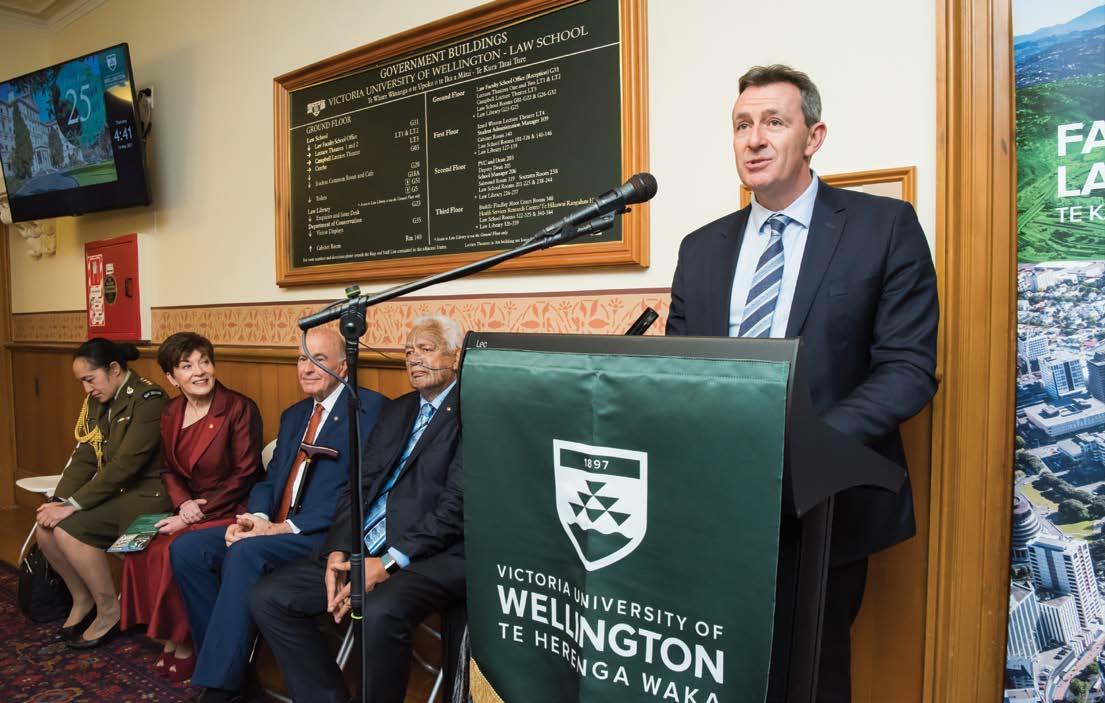


Current students joined the celebration Chancellor Neil Paviour Smith, making a formal address and welcome to invited guests
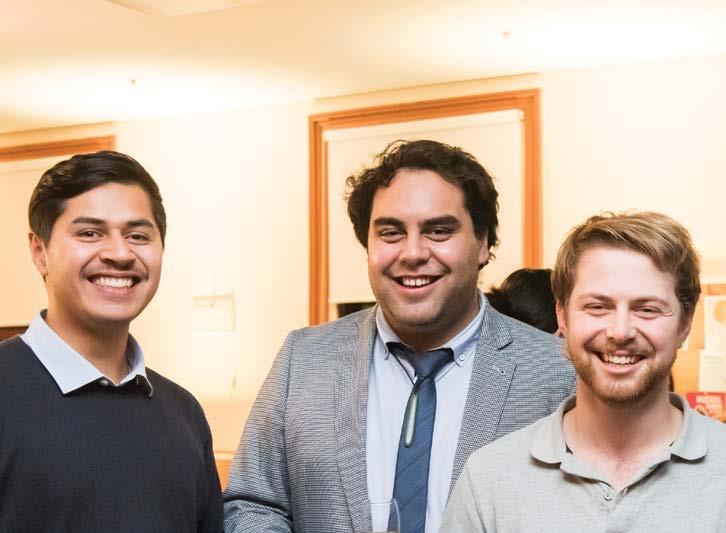
Pro Vice-Chancellor Government, Law, and Business, Professor Mark Hickford, making closing remarks to conclude the formalities of the event
Rhianna Morar, co-tumuaki—Ngā Rangahautira 2021, delivering her speech

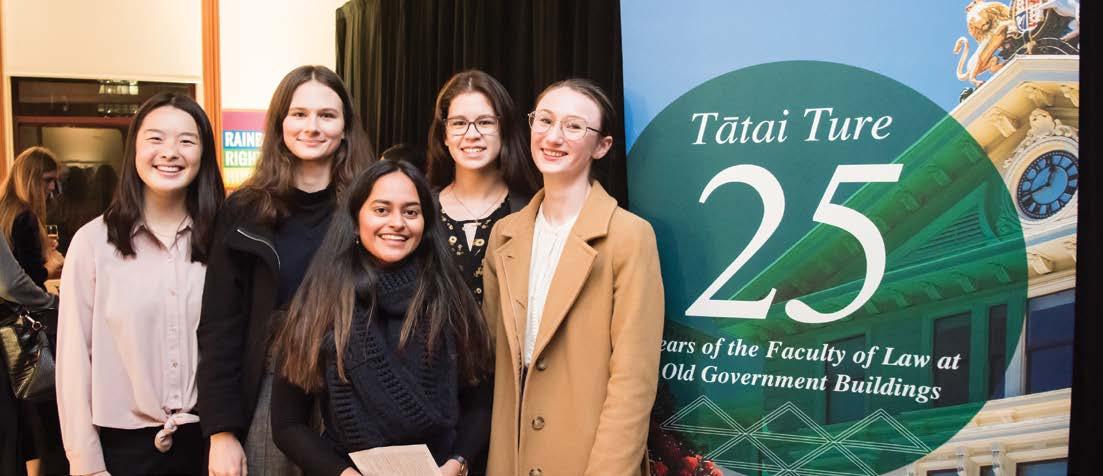
Page 30 V.ALUM 2021
Dame Patsy Reddy and members of Ngā Rangahautira
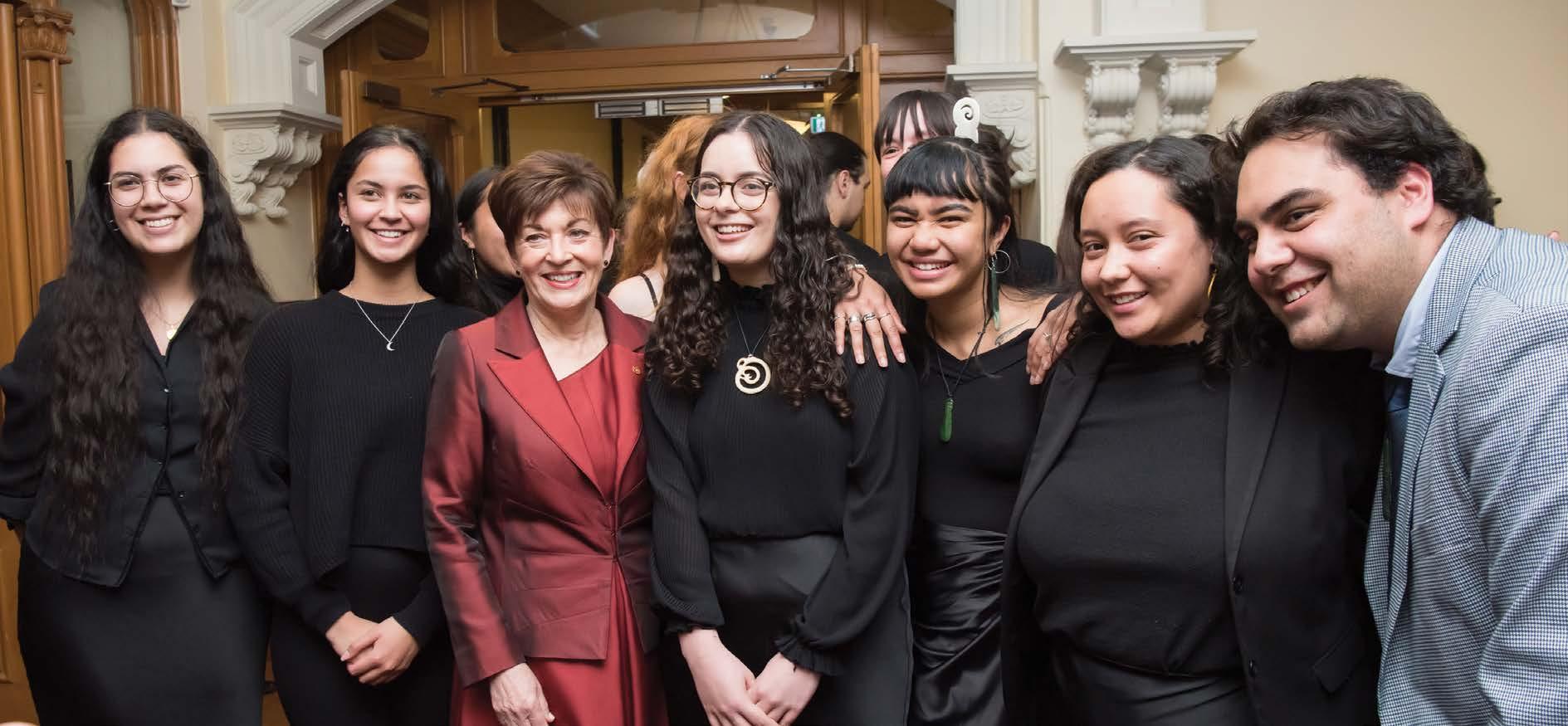
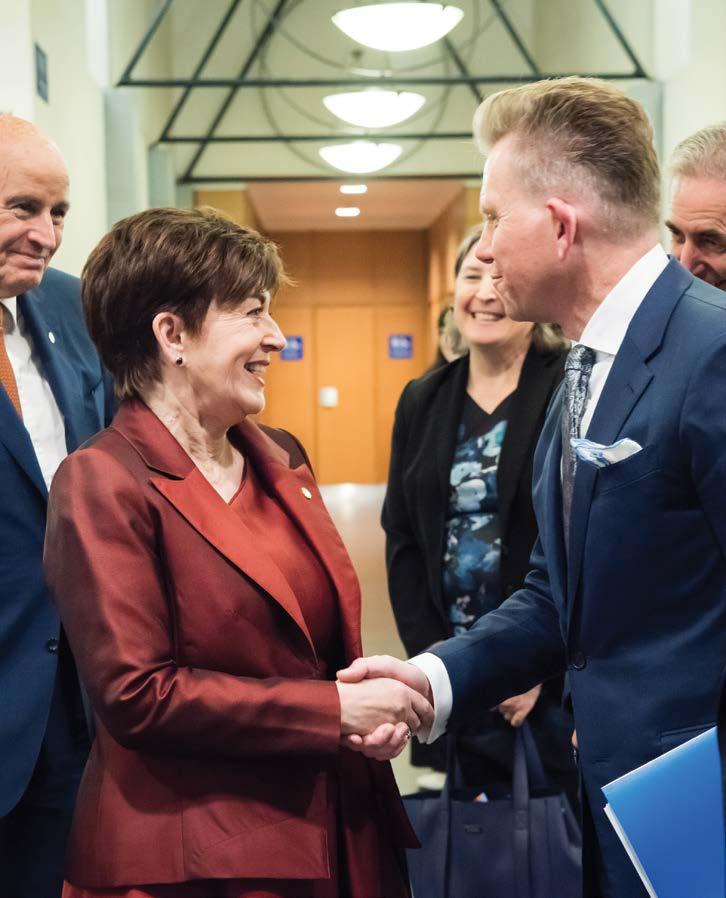
From left: Vice-Chancellor
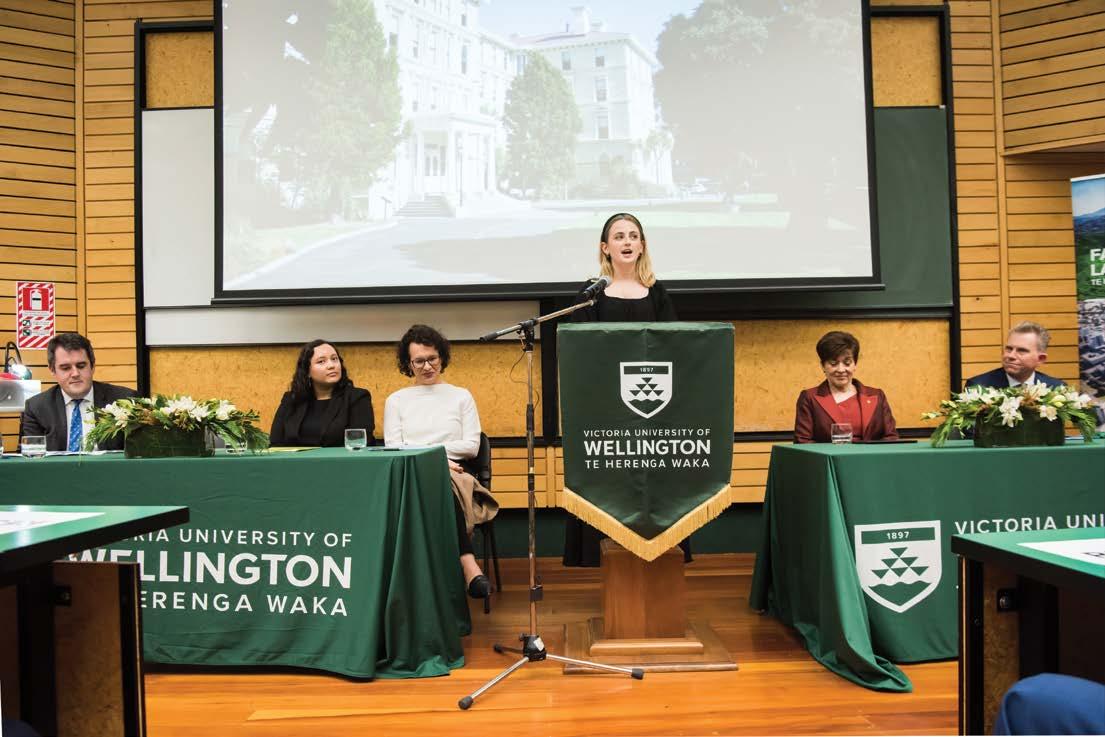
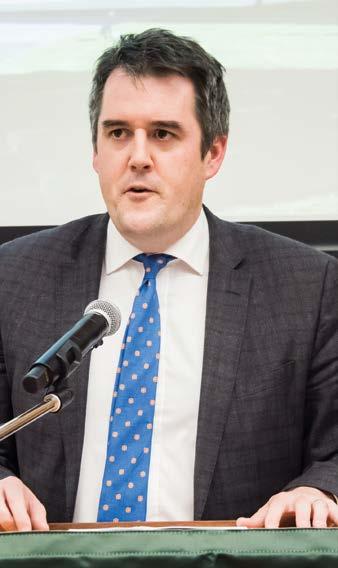

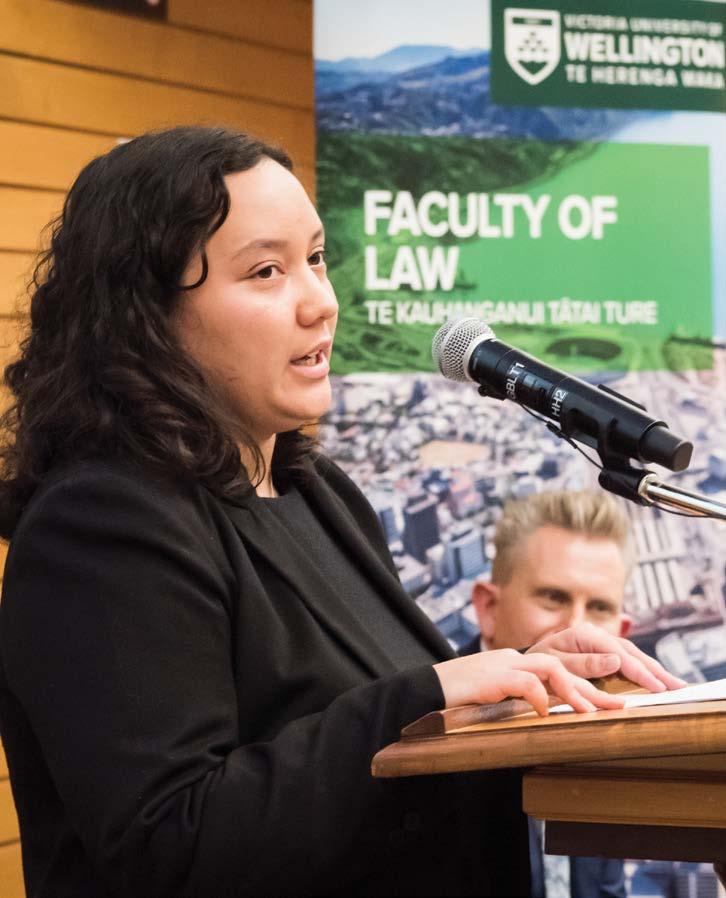
Professor
Kerensa
Grant Guilford; the Governor-General’s kaumātua, Mr Joe Harawira; Sir David Gascoigne; former Governor-General Dame Patsy Reddy; and Pro Vice-Chancellor Government, Law and Business, Professor Mark Hickford
Johnston (alumna LLB/BA 1998) speaking at the event
Professor Mark Hickford farewelling Dame Patsy Reddy
Meghan Grant, VUWLSS President 2021, presenting her speech Chris Bishop (alumnus LLB/BA 2009) addressing invited guests
Te Herenga Waka—Victoria University of Wellington
Page 31 V.ALUM 2021
| Te Kauhanganui Tatāi Ture—Faculty of Law
A legend retires
When Pauline Castle left the Law School in May this year, it marked the end of an era, and the start of a new chapter in her life—a relaxed retirement in the sunny Wairarapa.

Pauline began working at the Law School in 2003, taking a temporary position behind the front desk in the Law School office, where she managed student enquiries and administration. The role was supposed to last six months; she retired this year after 18 years. There aren’t many people who attended, or worked at, the Law School between 2003 and 2021 who don’t have their own Pauline Castle story.
Pauline completed the role she was paid to do with gusto, but she also went above and beyond to help students.
the Law School; she treated us like her own. We knew her interest in our wellbeing was genuine; you could feel it!
“When I returned as an adjunct, Pauline was so excited for the School to have a Pasikifa female fronting the class—and whenever I needed a hand, she was always on the other end of the phone. Her tireless efforts will be missed by many.”
Her support of, and advocacy for, students was unwavering throughout her Law School tenure. Although often overloaded with requests, she would always take time out if someone was in need of help. The first port of call in numerous emergencies (both real and imagined), the Law School office was a hub, and Pauline was truly the heart
“I know there are just so many people who are so grateful for the service that Pauline has given, and whether she knows it or not, she has made such a huge impact on our Pasifika students. She made my journey so memorable, and she has always had so much grace,” remembers former Pasifika Law Students’ coordinator, Lagi Tuimavave.
Something that also can’t be understated is Pauline’s dedication to the physical home of the Law School— the historic Old Government Buildings (OGB), built in 1876. If you ever tried to put sticky tape or thumb tacks on the walls of OGB, you will have undoubtedly seen this dedication up close.
“I think of Pauline as the kaitiaki (guardian) of the Old Government Buildings. She always looked after them with a real affection and that was so appreciated by staff, students, and visitors. I particularly enjoyed on Monday mornings seeing the flowers that she’d arranged from the flowers that [Emeritus Professor] Tony Angelo brought in,” says former Law School staff member Lib Coubrough.
“Pauline just really took care of us during our time at Law School; she treated us like her own. We knew her interest in our wellbeing was genuine; you could feel it!”
So while Pauline now has more time to focus on herself as she ventures into retirement, she will be long remembered by anyone who crossed the threshold of the Old Government Buildings in the past 18 years. And even though she will hate this suggestion, nobody has ever quite embodied the ideal of the “whaea (mum) of the Law School” like Pauline Castle.
V.ALUM 2021
Elizabeth Cherry (Communication and Marketing Advisor), David Jones (Rongowhakaata/Ngāti Kahungunu), Pauline Castle at David’s graduation, 2013.
Two milestone lectures
Inaugural lectures mark a major milestone in the careers of academics. They are a platform for newly appointed professors to celebrate their research by sharing their ideas and insights with the public and the wider academic community.
Two freshly minted professors from the Law School at Te Herenga Waka delivered their inaugural lectures in 2021.
In her lecture, ‘Conversations with the Common Law: Exposure, privacy, and societal values,’ Professor Nicole Moreham discussed the interweaving of her own career as a privacy academic with the rapid expansion of privacy protection in English and New Zealand common law.
She explained that the protection of privacy has been at the vanguard of common-law development for the past two decades as courts in New Zealand, England, and Wales have developed new privacy torts protecting against unwanted exposure of private information and activities.
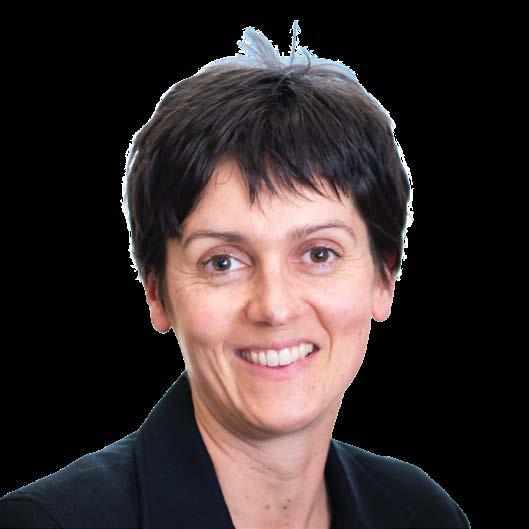
She considered the way in which judicial recognition of privacy interests both influenced and reflected wider societal conversations about privacy and its importance and examined the role that academics played in that process.
You can watch a recording of Professor Nicole Moreham’s inaugural lecture online
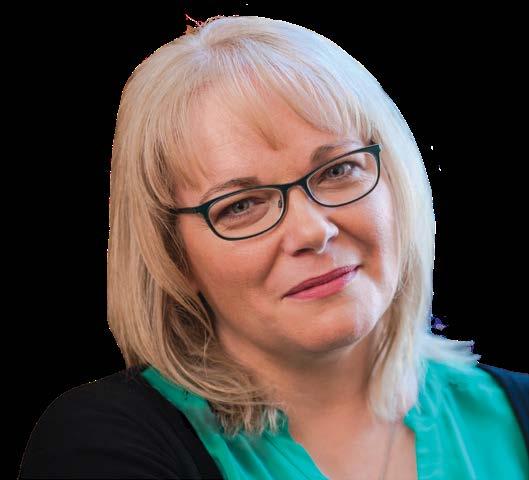
Professor Yvette Tinsley delivered her inaugural lecture in May, focusing on the limitations of the legal reform model in acknowledging and addressing the harms caused by the criminal justice process. Professor Tinsley examined how, in its attempt to be objective about deeply personal aspects of people’s life stories, the criminal law harms individuals, their whānau, and their communities.
In doing so, she drew on her empirical research with juries and prosecutors to illustrate the impacts of the process—both negative and positive—on criminal justice professionals and lay people.
In her lecture, ‘Pale Shelter, Cold Hands: Making Criminal Justice Better’, she reflected on her own journey with criminal law, both professional and personal. She outlined that there has recently been an increasing focus on the failures of the criminal justice process, yet the complexity of reform means that little has changed.
“We’re stuck in a particular type of approach to criminal law reform,” she said. “Reform efforts are largely siloed from other matters of social justice. Law reform is therefore necessary, but not sufficient.”
Introducing ideas for a reform agenda that locates criminal justice within the broader social justice needs of offenders, victims and communities; that respects Indigenous knowledge by empowering Māori and other communities; and that openly acknowledges the positive role for emotion, she argued that accepting the limitations of the legal reform model can help to address the challenge of making criminal justice ‘better’.
You can watch Professor Tinsley’s inaugural lecture online
Watch Professor Nicole Morehham’s lecture
Te Herenga Waka—Victoria University of Wellington | Te Kauhanganui Tatāi Ture—Faculty of Law Page 33 V.ALUM 2021
Watch Professor Yvette Tinsley’s lecture
Enhancing opportunities for our Pasifika tauira
The ‘Equity, Belonging and Authority/Power—How can Law, Policy and Practice support Pasifika in Aotearoa New Zealand— Improving Pasifika Legal Education’ project is a research project that aims to identify barriers to the success of Pasifika law students and law practitioners.
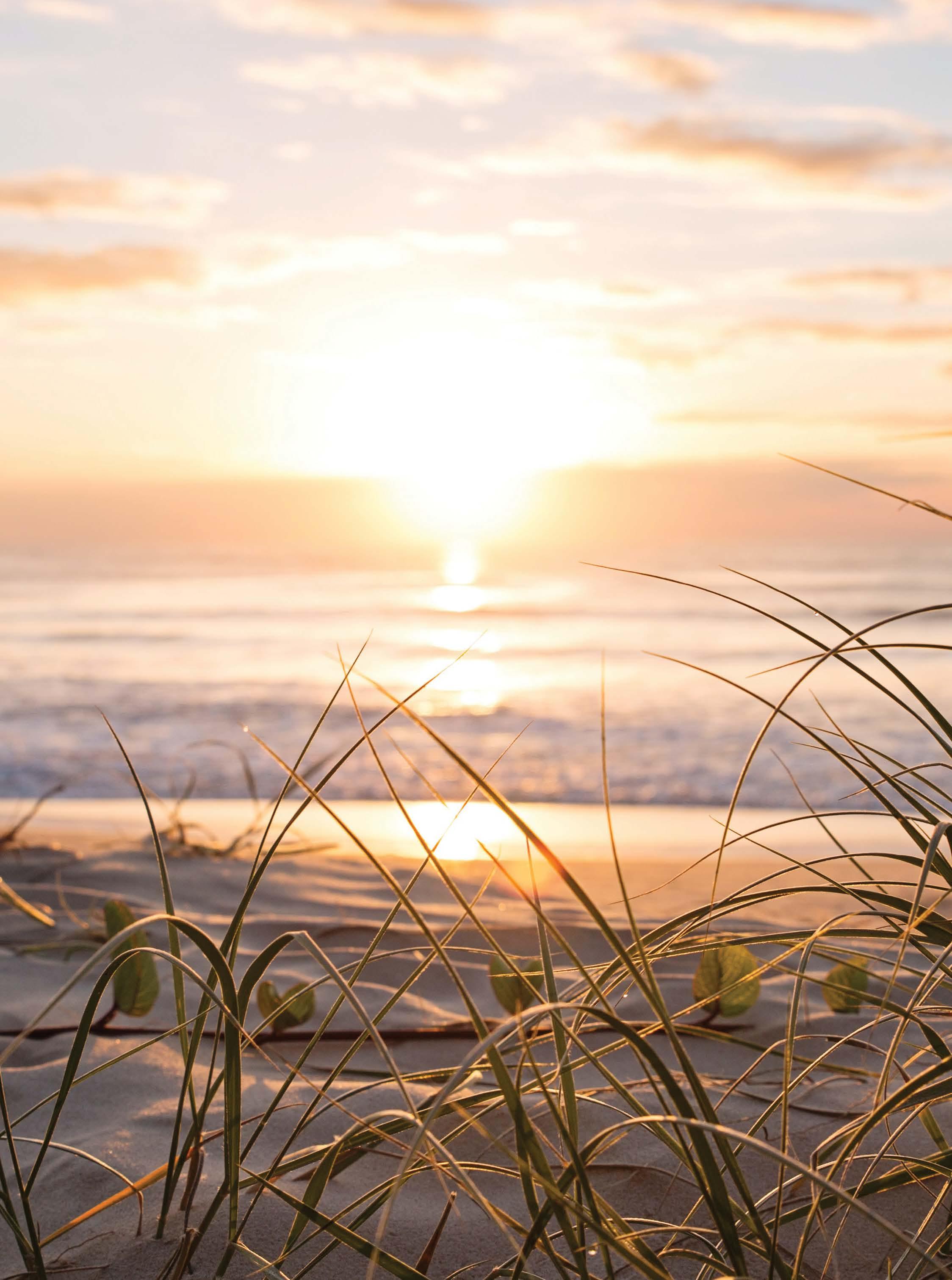
The overarching goal is to increase the number of Pasifika students enrolling and graduating with law degrees by systematically removing the barriers to success.
The project is funded by the Michael and Suzanne Borrin Foundation and is led by Hon. Luamanuvao Dame Winnie Laban from Te Herenga Waka—Victoria University of Wellington, with the support and participation of law schools across New Zealand.
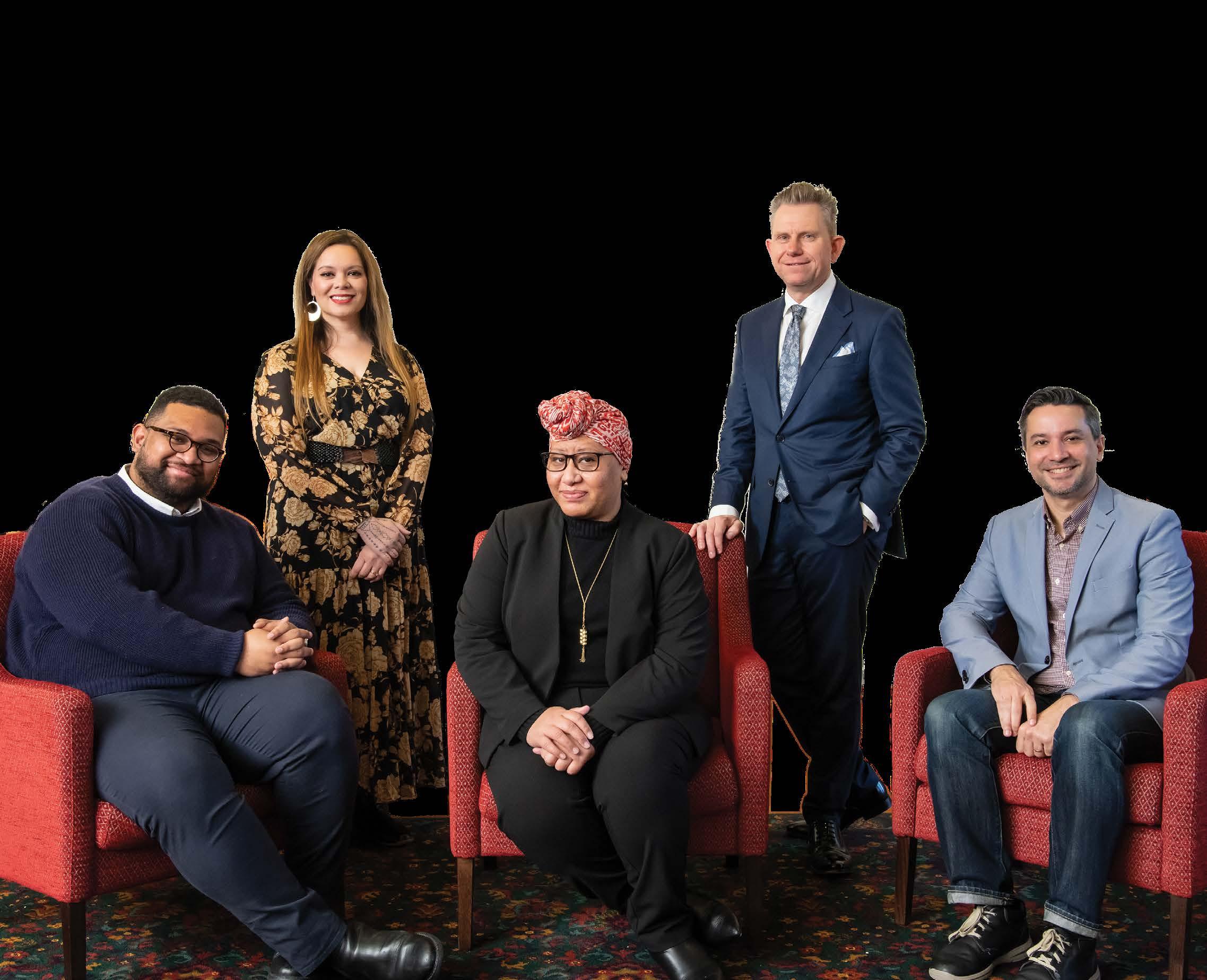
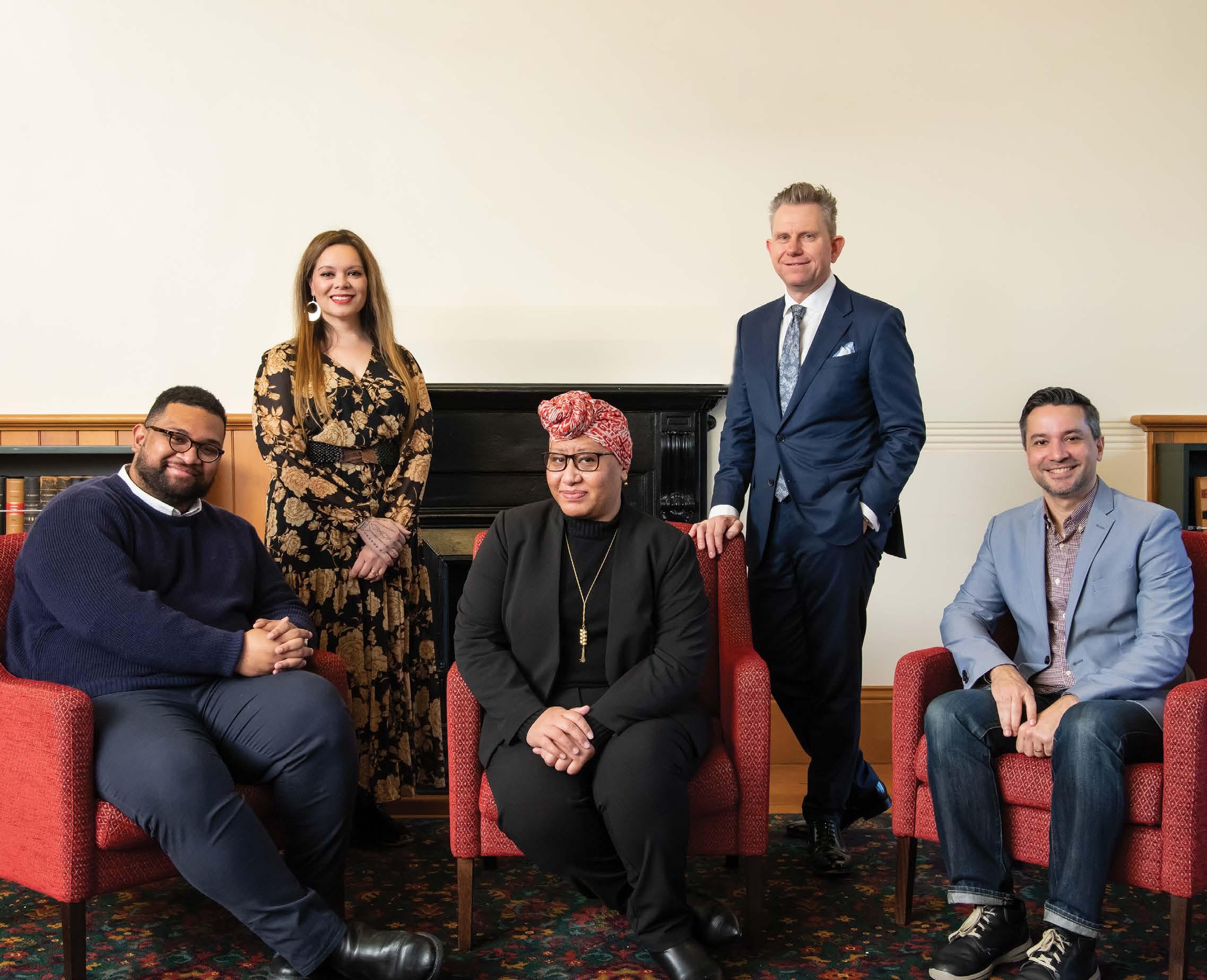 From left: Mr Wiliame Gucake, Ms Tupe Solomon-Tanoa’i, Dr Mele Tupou Vaitohi, Professor Mark Hickford, Associate Professor Guy Fiti Sinclair
From left: Mr Wiliame Gucake, Ms Tupe Solomon-Tanoa’i, Dr Mele Tupou Vaitohi, Professor Mark Hickford, Associate Professor Guy Fiti Sinclair
Page 34 V.ALUM 2021
The research work will involve a literature review and analysis of data collected from talanoa (conversations) in New Zealand that will be compiled into a final report. The process will capture the ‘lived experience’ of Pasifika students’ learning journey towards becoming Pasifika legal professionals by way of talanoa. It will also build our capacity for generative dialogue to create knowledge and envision new possibilities and solutions by way of a virtual hub that will connect students, graduates, and lawyers with academics and policymakers through a series of virtual talanoa. The hub will focus on themes of equity, belonging, and authority relating to Pasifika in Aotearoa. The research is supported by two advisory panels. The Academic Advisory Panel is chaired by Associate Professor Guy Fiti Sinclair from Auckland Law School, and the Students and Law Practitioners Advisory Panel (Komiti Poto) is chaired by Ms Tania Sharkey. Each university’s Faculty of Law is represented in the advisory panels as well as Pasifika law practitioners.
“The hub will focus on themes of equity, belonging and authority relating to Pasifika in Aotearoa.”

This collaborative project was launched on 30 October 2021 by the Minister for Pacific Peoples and Courts, and the Associate Minister of Justice, Foreign Affairs, Health (Pacific Peoples), and Education (Pacific Peoples), Hon. Aupito William Sio. The Improving Pasifika Legal Education Project is complemented by a range of research, including, for example Legal Systems of the Pacific—Introducing Sixteen Gems, edited by Emeritus Professors Tony Angelo QC and Jennifer Corrin; and the Comparative Law Journal of the Pacific, Volume 26 (2021), which launched simultaneously on 30 October 2021.
The Project’s website will not only be a medium for information relating to the project but also serves as a multidisciplinary research network and a tool to connect students, graduates, and lawyers with academics and policymakers through virtual talanoa. In the short term, the project hopes to establish coordinated action across Aotearoa’s universities and bring together students, practising lawyers, academics, and policymakers to collectively work out the barriers and interventions to Pasifika students’ and lawyers’ success.
...experiences and realities of the Pasifika law students...
The Pasifika Law Research Fellow of the project, Dr Mele Tupou Vaitohi, says, “We hope this research will shed light on the voice, experiences, and realities of the Pasifika law students and law professionals in order to bring about informed and meaningful changes.”
The long-term vision of this project is to improve legal education to increase the number of Pasifika in the legal profession, and to improve the experience and success of Pasifika students who pursue a legal degree. Ultimately it will build a pathway for Pasifika into the legal profession and legal academia.
Te Herenga Waka—Victoria University of Wellington | Te Kauhanganui Tatāi Ture—Faculty of Law V.ALUM 2021
Government, Law and Business
The newly established role of Pro Vice-Chancellor of Government, Law and Business for the Faculty of Law and the Wellington School of Business and Government (Te Kauhanganui Tāti Ture / Ōrauariki) is being assumed by Professor Mark Hickford, former Pro Vice-Chancellor and Dean of Law.
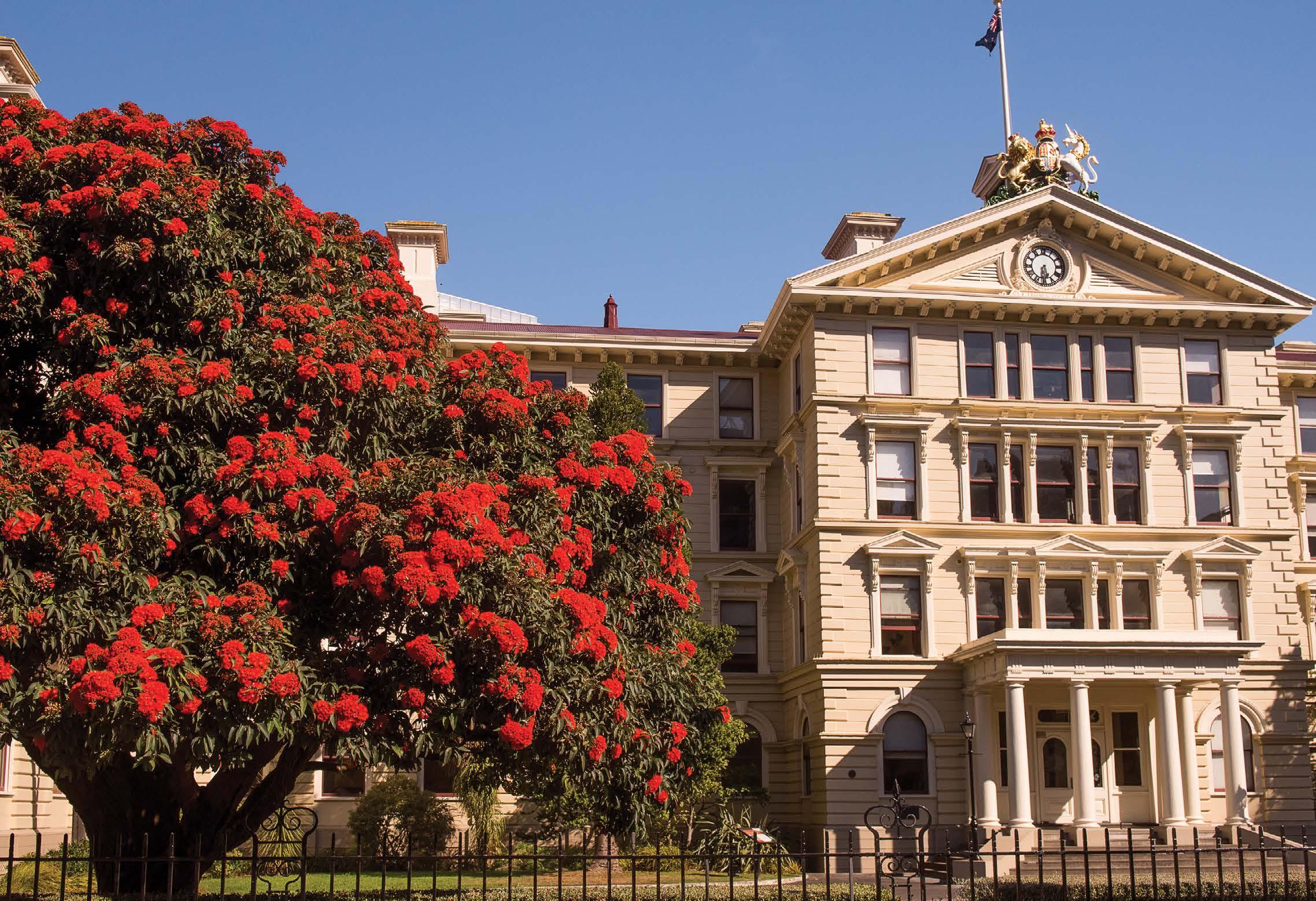
For the Faculty of Law, Professor Petra Butler will assume the position of acting dean and Professor Jane Bryson will be the acting dean of Wellington School of Business and Government (WSBG) while recruitment for permanent appointees in each faculty takes place.
This is an exciting new opportunity to align the strategic values of both WSBG, and the Faculty of Law. It is anticipated that this new Pro Vice-Chancellor role will lead the development of one of the University’s key areas of distinctiveness, ‘governing for the future’, to be supported by the academic disciplines within both
Page 36 V.ALUM 2021
Law and WSBG at the Pipitea campus along with the other faculties based at the Kelburn and Te Aro campuses.
Aligning the leadership of both faculties will provide an opportunity to leverage the Pipitea location through the strategic thinking, values, and mana each faculty has. The faculties will maintain and strengthen the strong relationships with government, local and international businesses, iwi, the legal profession, accounting professions, the country’s top scientific, cultural, and creative organisations and our communities.
Victoria University of Wellington Law Students’ Society (VUWLSS) president of 2021, Meghan Grant, says, “The separation of the pro vice-chancellor and dean roles in the Faculty of Law creates an exciting opportunity for VUWLSS to build relationships across the road at Rutherford House with both the WSBG and student groups. Further, the distinction gives both the Pro Vice-Chancellor of Government, Law, and Business and the dean of law increased capacity to focus on the re-indigenisation occurring in both legal education and the governance of Aotearoa New Zealand.”
“...the distinction gives both the Pro Vice-Chancellor of Government, Law, and Business and the dean of law increased capacity to focus on the re-indigenisation occurring in both legal education and the governance of Aotearoa New Zealand.”

This alignment will also enable the dean roles to respectively hone their expertise in a specific area. This will see the deans focusing on providing academic leadership to their faculty, including academic strategic direction and oversight of all matters pertaining
to research, learning and teaching, engagement, and national and international stakeholder relations.
Sam Taylor and Rhianna Morar, co-tumuaki—Ngā Rangahautira say, “The Pro Vice-Chancellor role creates a new opportunity for a distinctive lens to be applied across Law, Government and Business focused on connecting the pae to the iho of Te Herenga Waka. As former dean of law, Professor Hickford’s critical understanding of the relationship between tikanga and State law is exemplary and an example of the leadership qualities necessary to bring the Faculty of Law and the Wellington School of Business and Government into the Te Herenga Waka era.”
With Professor Hickford’s understanding and commitment to tikanga and its relationship with State law, reader Māmari Stephens says, “I, for one, have appreciated Mark’s significant contribution in initiating and facilitating several fruitful hui kōrero held here and at Te Herenga Waka marae with a view to us being better able to chart a course for introducing and strengthening tikanga as a part of the LLB as a response to the requirements of the New Zealand Council of Legal Education. These valuable conversations with Māori experts, including practitioners, academics, and judges have been very important, and are ongoing. Mark’s continued support will be critical, even more so in his new role, as we all prepare for the changes to come.”
As many Bachelor of Commerce and Bachelor of Laws students undertake a double degree across both faculties, there will be useful alignments evolving and feeding into the ‘governing for the future’ area of distinctiveness across the Pipitea campus. There are also postgraduate students across both faculties who are studying for a Master’s, doctorate, or postgraduate diploma.
New Zealand Law Students’ Association president for 2021 and VUWLSS’s 2020
president, Jugjeet Singh says, “For students, who occupies the role of dean can often go unnoticed. However, who occupies this position dictates the staff and student experience. VUWLSS has a strong, longstanding relationship with the dean and during my term as VUWLSS president, I was incredibly fortunate to have support and guidance from Professor Hickford, in his role as dean, as we navigated COVID-19 for the first time.
...governing for the future...
“I look forward to Professor Butler bringing a fresh and exciting new perspective as acting dean. With her appointment, all six law schools across the country are now led by women, highlighting how far the profession has come. Tino rawe, Professor Butler! I hope the search for a new permanent dean will also prioritise the diversity and equity that is sorely needed in our law schools.
“...all six law schools across the country are now led by women highlighting how far the profession has come...”
“The creation of the new PVC role will be seen as largely structural for most students. However, it has potential to prompt a culture change at Pipitea campus. Traditionally, the tight-knit community at the Law School has stayed firmly there. I look forward to Professor Hickford’s approach to the role of PVC and bridging the gap across the Pipitea campus.”
Te Herenga Waka—Victoria University of Wellington | Te Kauhanganui Tatāi Ture—Faculty of Law Page 37 V.ALUM 2021
Top-achieving law graduates honoured by University
Each year, Te Herenga Waka—Victoria University of Wellington acknowledges a number of its top-achieving alumni. Of the six distinguished alumni recipients for 2021, we are very proud that three are graduates of Wellington’s Law School.
Stacey Shortall (BCA 1994, LLB 1995) is an internationally recognised litigation lawyer and a strong advocate for a more equitable Aotearoa New Zealand. She has spearheaded projects designed to create social change and has received numerous awards for both her legal and social work.
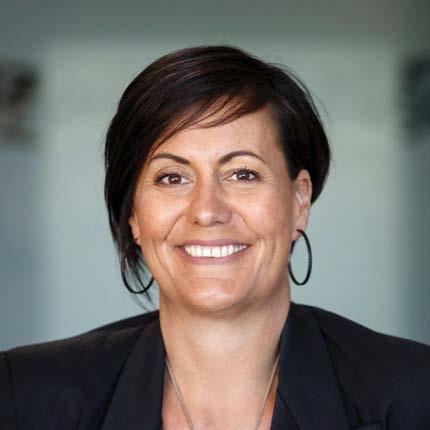
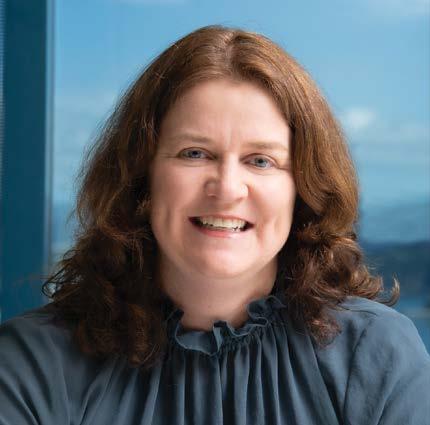
Stacey is widely regarded as one of the country’s top lawyers, with 25 years of experience successfully representing a range of corporate and public sector clients in significant litigation and regulatory matters. She is a vocal advocate on issues concerning gender diversity and inclusion in the legal professions, and has established a number of social programmes that aim to prevent violence and develop children and women to their full potential.
She is the deputy chair of the Capital and Coast District Health Board, and has been recognised with numerous formal awards and international accolades.
Rachel Taulelei (Ngāti Raukawa ki te Tonga, Ngāti Rārua, LLB 1998) is a prominent business leader, particularly in the food and beverage industry, and a strong advocate for sustainability and the Māori economy.
She is a former trade commissioner, having been based in Los Angeles for New Zealand Trade and Enterprise.
She is also the founder of sustainable seafood company Yellow Brick Road. The innovative company makes a demonstrable commitment to kaitiakitanga. Ms Taulelei has brought this ethos to her current role as chief executive officer of Kono, a Māori-owned food and beverage company.
Ms Taulelei has received numerous awards, honours, and scholarships for her work and leadership. She has held a range of directorships, and currently chairs the Wellington Regional Stadium Trust.
Judge
(Ngāti
1993) has been Chief District Court judge since September 2019. Born in Gisborne, he is the first Māori to be appointed to the role and is fluent in te reo Māori.
He was the first person from Ngāti Konohi to gain a law degree and practise as a barrister and solicitor. He has worked as a solicitor with the Immigration Service and Te Puni Kōkiri, and was appointed a District Court judge in 2004 after a decade practising law in Gisborne, and a previous career in the New Zealand Army.
Through his various leadership roles, Judge Taumaunu has promoted the value of culturally responsive justice, including encouraging the District Court to embrace tikanga as a way to enhance Māori engagement and confidence in the court. He led the development of marae-based rangatahi courts, and his leadership was recognised internationally in 2017 when he received the Veillard-Cybulski Award.
 Heemi Taumaunu
Pōrou, Ngāti Konohi and Ngāi Tahu, LLB
Heemi Taumaunu
Pōrou, Ngāti Konohi and Ngāi Tahu, LLB
Page 38 V.ALUM 2021
Fifty years at the Faculty of Law
Since his appointment as a professor in 1981 at the age of 33—one of the youngest in the history of the University—Professor McLauchlan has become one of the leading figures in private law, especially the law of contract and commercial law.
He has taught and inspired five generations of students. Many have gone on to become leaders in business, government, the legal profession, and the judiciary. He has published two books and 170 journal articles or book chapters, many of which have led to important developments and debates about where the law should be heading.
Professor McLauchlan is one of the most cited authors on issues concerning the law of contract by the New Zealand High Court, Court of Appeal, and Supreme Court. His work across the whole field of private law has also been favourably cited in the House of Lords, the Privy Council, the Supreme Court of Canada, the English Court of Appeal and High Court, and the Australian Federal and State Courts.
He has presented at major international conferences, given numerous lectures and seminars for colleagues, members of the legal profession, and the judiciary. He has also provided voluntary continuing legal education for the legal profession and judiciary in New Zealand, Australia, England, and Hong Kong.
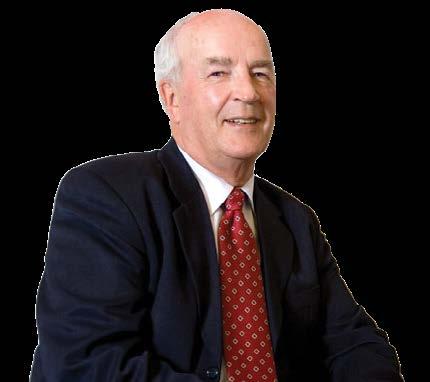
He has been an honorary professor at the University of Queensland since 2004
and a professorial fellow at the University of Melbourne since 2012. In 2008, he was the McWilliam Professor in Commercial Law at the University of Sydney and in 2018 the Cheng Yu Tung Visiting Professor at the University of Hong Kong.
Professor McLauchlan says he has one of the best jobs he could possibly have had.
“I say this for two main reasons. First, the teaching of a new crop of young people every year has been rewarding and enjoyable and, secondly, there are not too many jobs that enable you to set your own agenda—in my case for research and writing—for almost half of your time.”
He believes the key to being a good teacher is enthusiasm and simply wanting to be in a classroom to challenge the students.
Student and tutor Seb Ellice says the passion, enthusiasm, and expertise Professor McLauchlan brings to contract law is inspiring.
“What impresses me about David’s teaching is that he strives to ensure that the contract law course remains fresh and up to date, which I think is a testament to his ability not only as a teacher, but as a scholar as well.”
In fact, Professor McLauchlan regards the words of American Professor Harold J. Berman, on the notice board outside his office as his motto: “If a scholar is not a teacher, his scholarship will be sterile. If a teacher is not a scholar, his teaching will be superficial.”
Te Herenga Waka—Victoria University of Wellington | Te Kauhanganui Tatāi Ture—Faculty of Law Page 39 V.ALUM 2021
Law teacher and legal scholar Professor David McLauchlan celebrates 50 years at Te Herenga Waka—Victoria University of Wellington in 2021.
Endowment ensures Lecretia Seales Memorial Lectures can continue

A lecture series memorialising a Wellington lawyer who was instrumental in changing the country’s end-of-life laws will be held in perpetuity thanks to the generous support of donors.
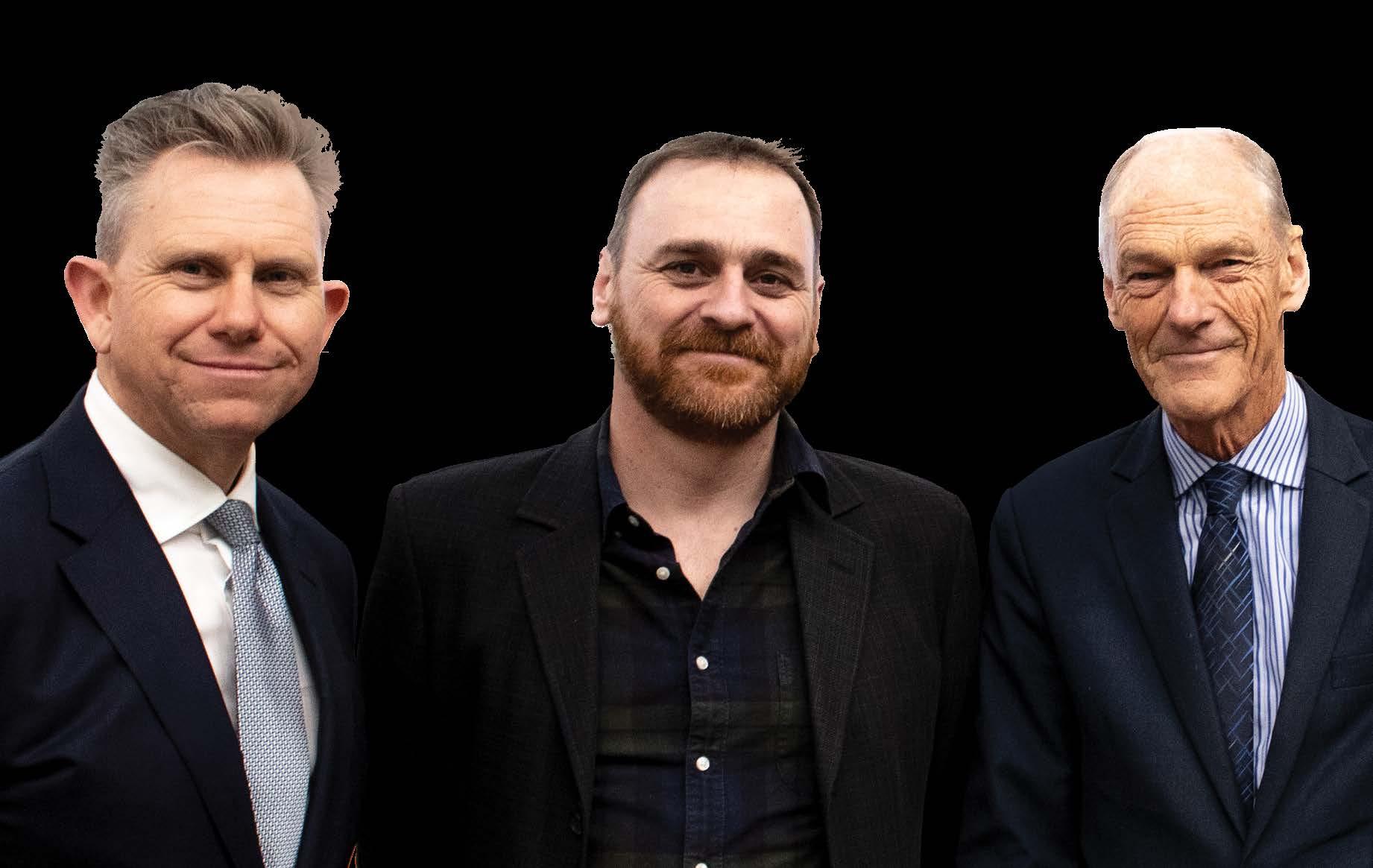
Lecretia Seales was a Te Herenga Waka—Victoria University of Wellington Law School alumna who in 2015, following a terminal brain tumour diagnosis, went to the High Court to seek a ruling that would protect her doctor from prosecution if they assisted her to die with her consent.
Ms Seales passed away in 2016, on the same day the judgment was delivered. Although she didn’t get the ruling she sought, Ms Seales’s court case sparked a national debate and helped bring about a parliamentary inquiry and referendum on the issue.
V.ALUM 2021
Professor Mark Hickford, Matt Vickers, Dr Warren Young, QSO
Assisted dying will be legal in New Zealand from November 2021, with more than 65 percent of voters supporting the End of Life Choice Act in the 2020 referendum. It means terminally ill adults with fewer than six months to live will have the option of legally asking for medical assistance to end their lives.

“Lecretia cared about a number of issues, including assisted dying, and this forum provides an intelligent and thoughtful forum for many important issues around law reform to be explored.”
The Lecretia Seales Memorial Lecture in Law Reform , hosted by the Law School at Te Herenga Waka, is held annually. It was established by Ms Seales’s widower Matt Vickers, and Andrew Butler, who led the team from Russell McVeagh that worked pro bono to bring her case to court.
The lectures are themed around the subject of law reform and the constitution of New Zealand. Past speakers include former prime minister Sir Geoffrey Palmer and Professor Doug Sellman. The 2021 lecture was given by Dr Warren Young, QSO, on the ‘Trials, Tribulations, and Occasional Triumphs of Criminal Justice Reform’. A recording of his lecture can be viewed online
Initially funded for at least eight years, the lecture series has received ongoing support from a small number of generous donors. In 2021 the Law School is delighted to report that it has been able to create an endowment that guarantees the lecture will take place annually, in perpetuity.
Matt Vickers says his aim has always been to ensure the lecture series is able to continue. “Lecretia cared about a number of issues, including assisted dying, and this forum provides an intelligent and thoughtful forum for many important issues around law reform to be explored.”
The lectures provide an opportunity for the legal community to gather annually to remember Ms Seales’s life and to ensure her passion for law reform remains a vital part of the ongoing life of that community. If you’d like to be part of continuing the legacy of Ms Seales, please consider contributing to this. All donations, no matter what size, are greatly appreciated and will collectively enable us to continue this lecture series in Ms Seales’s memory.
To discuss ways in which you can contribute to the fund or to suggest ideas you have about future speakers for the Lecretia Seales Memorial Lecture in Law Reform, please contact Victoria Beckett, development manager, Government, Law and Business on Victoria.beckett@vuw.ac.nz or +64 21 0254 1461.

Ms Seales’s court case sparked a national debate
Donor’s personal connection inspires support
A Wellington couple who have been major donors to the campaign for the Lecretia Seales Memorial Lecture in Law Reform say a personal connection to Ms Seales motivated them to get behind the cause.
Sir Bruce and Lady Lyn Robertson first met Ms Seales, and later Mr Vickers, through their daughter, when she and Ms Seales started working together at Kensington Swan in 1998.
Sir Bruce, who is a well-known figure in New Zealand’s legal community, is the chief commissioner of intelligence warrants for the New Zealand Security Intelligence Service, a role he’s held since 2013. He was appointed a High Court judge in 1987, was president of the Law Commission from 2001 to 2005, and then sat on the Court of Appeal until he retired in 2010.
The Robertsons have donated to the lecture series since its inception. Sir Bruce says that beyond Ms Seales’s friendship with their daughter, he and Lady Lyn strongly supported the stance she took on end-of-life issues.
“As the lecture series turned to focus on other important areas of law, we continued to support it as we think there is considerable value in a lecture series that challenges thinking on a range of legal issues,” he says.
“Raising awareness of a range of legal issues and prompting people to engage in a dialogue about those issues is of vital importance.”
Te Herenga Waka—Victoria University of Wellington | Te Kauhanganui Tatāi Ture—Faculty of Law Page 41 V.ALUM 2021
Watch Dr Warren Young, QSO’s lecture
A year in reflection
We started with our annual half-day seminar, the Government Law Year in Review. The seminar featured a keynote lecture from Dr Carwyn Jones, updates on judicial review by Associate Professor Dean Knight, on the Bill of Rights by Professor Petra Butler, and on Te Tiriti o Waitangi and Māori issues by Mihiata Pirini (Otago).
The updates on New Zealand public law were complemented by brief video vignettes discussing new developments overseas, this year featuring Thomas Poole (LSE), Kate Glover (York U), Fiona McDonald (QUT), Sergio Verdugo (U Desarrollo, Chile), and Mark Graber (Maryland). The day concluded with a panel entitled Reflections on the Pandemic, chaired by Professor Geoff McClay with Dr Eddie Clark, Reader Māmari Stephens, Associate Professor Nessa Lynch, and Phil Knipe (chief legal adviser, Ministry of Health).
In June, we hosted a discussion on disarmament facilitated by Professor Alberto Costi and led by Phil Twyford, Minister for Disarmament and Arms Control. In July, we held a seminar in which Coleen Flood (Ottawa) presented a paper titled ‘The Law, Policy and Ethics of Vaccine Passports’ and organised a public lecture titled ‘The Samoan Constitutional Crisis: An Analysis’, in which a panel consisting of Iati Iati, Dylan Asafo (Auckland), and Anna Powles (Massey) offered different perspectives on the events that followed the April 2021 general election in Samoa.
In September and October, we held three public officeholders’ public lectures. The first featured the chief ombudsman Peter Boshier, whose lecture was ‘On the Value and Future of the Office of the Ombudsman’. The second, ‘Kaikōmihana Ture—The Changing Roles and Responsibilities of Law Commissioners’, was given by Amokura Kawharu, president of the Law Commission. Finally, children’s commissioner Andrew Becroft spoke about ‘Five Missing Pieces in the Youth Justice Jigsaw’, and was joined by Associate Professor Nessa Lynch, who presented specific reform proposals for the youth justice system. At the end of November, the Centre co-sponsored, along with the International Committee of the Red Cross and the New Zealand Association for Comparative Law, the annual International Humanitarian Law Seminar in Memory of Henry Dunant, where experts from academia, government, and civil society discuss current issues in the law of armed conflict.
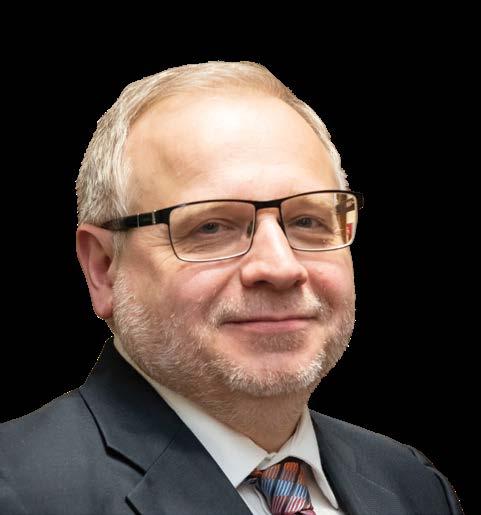
The Centre also inaugurated the Lives in New Zealand Public Law series, where individuals who have contributed to the shaping of New Zealand’s public law are interviewed. The interviews are partly biographical and include discussions about contemporary public law issues. The first episode features Sir Kenneth Keith, who talked about his early life, his role in the judiciary, and experience in law reform, and sovereignty and the Treaty of Waitangi. In the second episode, we interviewed Tony Angelo, who talked about his early education, experience in
the teaching of comparative law, work in small island states in the Pacific and beyond, and his views on New Zealand’s constitutional future.
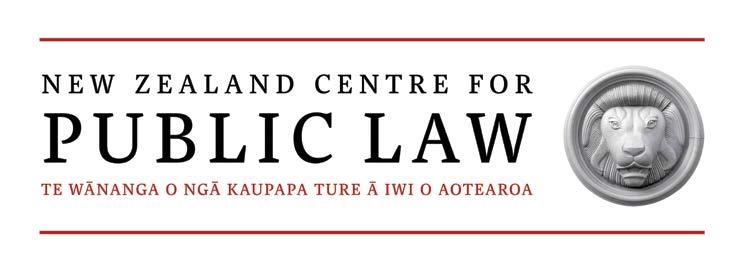

These two episodes, as well as most of the seminars and lectures mentioned above, are available on the recently revamped Centre’s website
In addition to its public events, the Centre publishes every year two issues of the New Zealand Journal of Public and International Law (NZJPIL). Recent issues have included contributions from former chief justice Dame Sian Elias and Justice Sir Joe Williams. Forthcoming are a couple of special issues bringing together New Zealand and overseas authors. From this year onward, the journal is only accessible online , although, from time to time, we will publish printed copies for special issues. We thank all the subscribers for the many years of loyal support and look with great confidence at the future as we approach the 20th anniversary of the NZJPIL
Last but not least, we are happy to report that Marnie Lloydd was appointed associate director of the Centre and Joel Colón-Ríos was reappointed as director, as we continue to prepare to host the meeting of the International Society of Public Law in 2023.
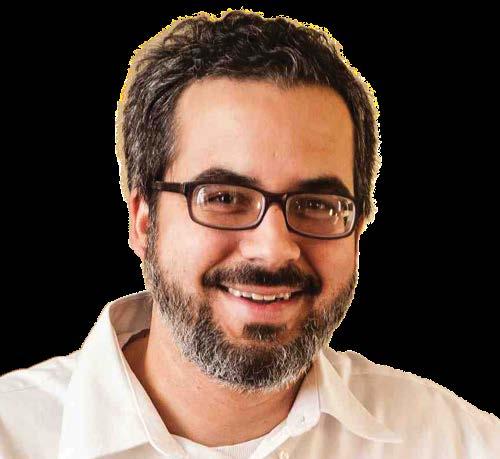
V.ALUM 2021
This was a busy year for the New Zealand Centre for Public Law.
New acting dean of law
Kia ora koutou katoa
I am pleased to address you in my first official correspondance as acting dean of law at Te Herenga Waka— Victoria University of Wellington for Te Kauhanganui Tātai Ture—Faculty of Law. I trust that, even though this year was for many as equally—albeit often differently—unsettling as last year, you have still been able to reach some, if not all, of your resolutions and aspirations for the year. I also hope that you were able to connect with us by participating in our public lectures, listening, for example, to our podcast series Lex and Lore, or meeting a friend from the Law School and reminiscing about old times.
The new leadership structure across the Pipitea campus will not alter the Faculty of Law’s distinctive iho. On the contrary, the University’s emphasis on the new area of distinctiveness ‘governing for the future’, led by the newly established office of the Pro Vice-Chancellor of Government, Law and Business, will allow the Faculty of Law and its students to be part of, and influence, the cross–university discourse of questions that are inherently important to us and our constituencies. I hope you will agree that V.Alum showcases already our engagement with pertinent issues of today’s society.
V.Alum attests to the busy year the Faculty of Law had: the many achievements of my colleagues and our students and, behind it all, the
commitment and support of our professional staff. We had to say farewell to colleagues in 2021 but also welcomed some new faces into the Faculty of Law whānau—this included the appointment of our distinguished fellows.
Looking ahead to 2022, I am anticipating engaging with the profession and judiciary to create a vibrant hub of legal discourse in which we will include colleagues not only from the Wellington School of Business and Government, but from all parts of the University.
a vibrant hub of legal discourse
We hope to continue establishing ourselves as a partner in Wellington’s legal endeavour by offering interesting and career-enhancing postgraduate courses. We also plan to offer professional courses in 2022, further enhancing our impact in Aotearoa New Zealand’s seat of law and government.
All the best, Noho ora mai.
Professor Petra Butler
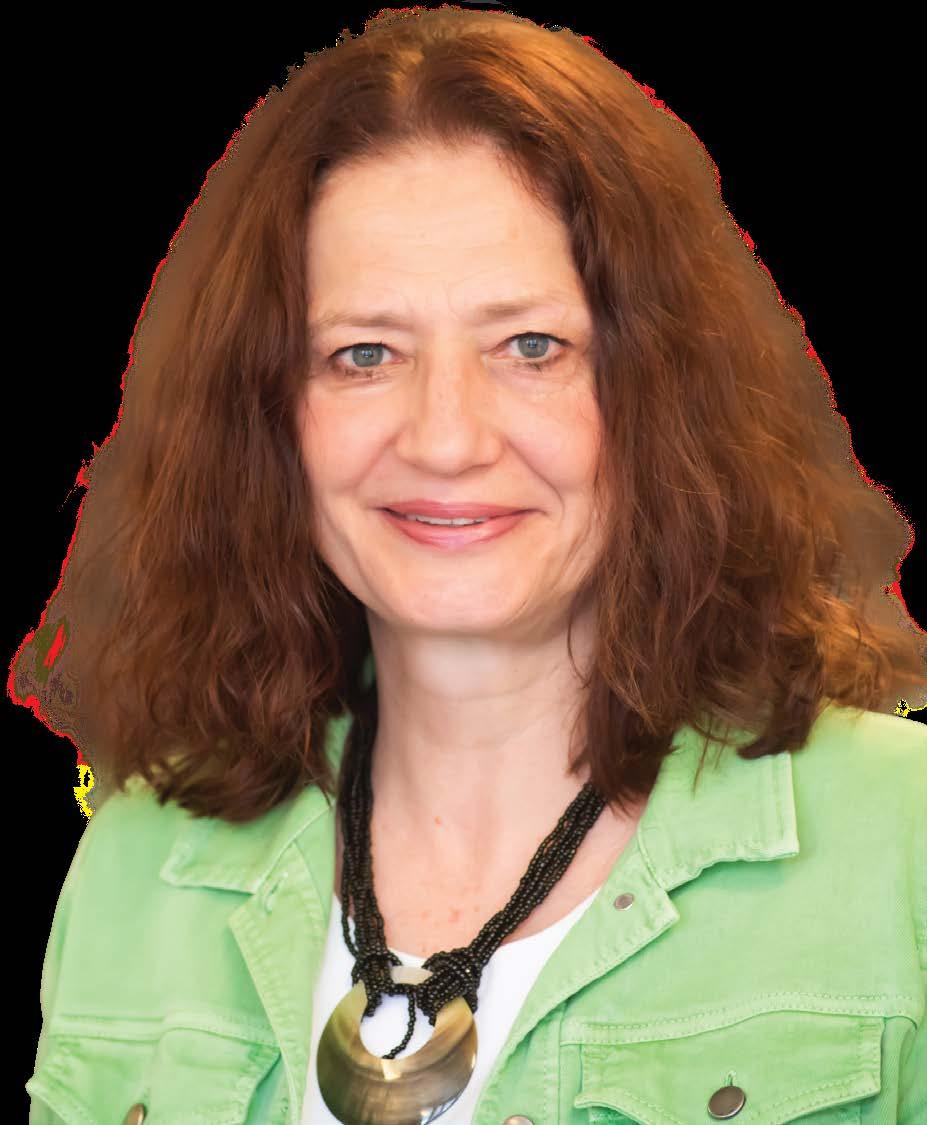 Professor Petra Butler takes on new leadership position.
Professor Petra Butler takes on new leadership position.
V.ALUM 2021
Awards, honours and appointments
Congratulations to all those in our community— students, staff and alumni—who have been recognised with awards, honours, and appointments this year.
Alumni Students
Shelley Atkin’s film Lair has won a number of awards since its release including Best Picture at the Action on Film International Film Festival, United States of America and Hex After Dark Film Festival Winner Best Picture (view more awards here ).
Mr Leo Michael Donnelly (LLB 1981) received an ONZM for services to Karate.
Associate Professor Jessica Lai (LLB 2008 and BSc 2009) was a recipient of one of the Royal Society Te Apārangi’s prestigious Rutherford Discovery fellowships.
Alice Liddell (LLM current) and Abby Hutchison (LLB 2020) won awards at the Environmental Defence Society Essay Competition, Alice winning the Long Essay prize and Abby winning the Short Essay prize.
Stacey Shortall (LLB 1995), Rachel Taulelei (LLB 1998), and Judge Heemi Taumaunu (LLB 1993) were recipients of 2021 Te Herenga Waka Distinguished Alumni Awards.
The Hon. Justice Sir Joe Williams (LLB 1986) was recently appointed as Aotearoa’s first Supreme Court justice of Māori heritage.
Faculty
Professor Gordon Anderson was elected as the vice-president for the Asian Region of the International Society of Labour and Social Security Law.
Professor Richard Boast gave evidence at the Waitangi Tribunal’s premises in Wellington as an expert witness on Māori land purchasing in the Kāpiti region in the 19th century.
Professor Petra Butler was awarded an inaugural fellowship for the 1000 Voices Programme, a competitive fellowship programme organised by the Every Woman Treaty. The 1000 Voices Programme will bring together leaders to discuss leadership in the area of domestic violence.
Professor Claudia Geiringer was appointed law commissioner for five years commencing in 2022.
Judge Bill Hastings, a former deputy dean, was appointed Chief Justice of Kiribati: www.mfat.govt. nz/en/media-and-resources/kiribati-chief-justiceappointed/
Professor Catherine Iorns has been appointed a councillor on the International Union for Conservation of Nature.
Sir Kenneth Keith Sir Geoffrey Palmer Associate Professor Dr Dean Knight, and Professor Claudia Geiringer appeared before the Privileges Committee in April, submitting on the Bill of Rights Act (Declarations of Inconsistency) Amendment Bill.
Associate Professor Dr Dean Knight gave evidence to Canada’s House of Commons committee on Health, as part of its inquiry into the COVID-19 pandemic.
Associate Professor Dr Dean Knight is a recipient of a Te Herenga Waka Teaching Excellence Award for 2021.
Dr Marnie Lloydd was appointed to New Zealand’s National International Humanitarian Law Committee. Dr Bjørn-Oliver Magsig was invited to join the expert panel on ‘Climate Change Related Legal Risk’ during the Environmental Law Summit in Auckland.
Dr Bjørn-Oliver Magsig and Dr Ruby MoynihanMagsig were appointed as international experts to China’s new Wuhan University Institute of Boundary and Ocean Studies, International Water Law Academy. As part of this role, Ruby was invited as a panel speaker to the Global Water Partnership (GWP) Massive Open Online Course (MOOC) on Governance for Transboundary Freshwater Security.
Professor Campbell McLachlan was appointed as a member of the New Zealand National Group in the Permanent Court of Arbitration; was a member of the Institute of International Law’s 12th Commission on Epidemics, Pandemics and International Law, whose Resolution was adopted by the Institute in August 2021. Associate Professor Dr Grant Morris was made a Fellow of the Arbitrators’ and Mediators’ Institute of New Zealand (AMINZ) by waiver at the August 2021 conference.
Associate Professor Joanna Mossop and Dr Ruby Moynihan-Magsig were awarded a Marsden Grant in 2021’s Te Pūtea Rangahau a Marsden, the Marsden Fund.
Dr Zoë Prebble received a Te Herenga Waka Early-Career Teaching Excellence Award. Senior lecturer Victoria Stace received a Te Herenga Waka Research Impact Award.
Islay Aitchison and Susannah Harper won the 2021 Norris Ward McKinnon Family Law Moot.
Jasmine Cox was involved in, and spoke at, the International Union for Conservation of Nature World Conservation Congress.
Seb Ellice was announced in 2021 as the recipient of the Flacks and Wong Prize for Company Law for 2020. The award recognises, and encourages, excellence in company law.

Meghan Grant was elected Education Vice President for New Zealand Law Students’ Association.
Cate Hensen and Jono Sylvester won the New Zealand Law Students’ Association (NZLSA): Bell Gully Mooting representing Te Herenga Waka—Victoria University of Wellington.
Tiana Jakicevich attended the COP26 as an Indigenous delegate.
Taran Molloy Jono Sylvester and Lottie Thompson as a team represented Aotearoa New Zealand and won the 19th Annual Hong Kong Red Cross International Humanitarian Law Moot Court Competition for the Asia-Pacific region. Taran was awarded the title of best individual mooter of the competition. This is the third time a team from the Faculty of Law has won the international competition and we are the only New Zealand university to have won the competition in Hong Kong.
Natalie Vaughan and Anna Ou represented Aotearoa New Zealand at the annual International Negotiation Competition (INC).
Natalie Vaughan and Katie Vodanovich won the New Zealand Law Students’ Association: Buddle Findlay Negotiation representing Te Herenga Waka—Victoria University of Wellington.
Students representing Te Herenga Waka—Victoria University of Wellington at the New Zealand Law Students’ Association Institute of Professional Legal Studies (IPLS) conference won the NZLSA: President’s Plate for most wins throughout conference.
Page 44 V.ALUM 2021
Student prizes for the 2020 academic year
A. H. Johnstone Scholarship in Law—Alexandra Briscoe
A. H. Johnstone Scholarship in Law—Alice Mander
Archibald Francis McCallum Scholarship in Law—Navroz Singh
Bernard Randall Prize in Family Law—Russell Busby
Chapman Tripp Prize—Jessica Sutton
Chris Highfield Memorial Prize in Judicial Review—Portia Baine
Chris Highfield Memorial Prize in Public Law—Claire Rees
Chris Highfield Memorial Prize in Public Law—Alice Mander
Coleman-Brown Memorial Award—Jessica Sutton
Colin Patterson Memorial Prize—Arielle Tracey
Colin Patterson Memorial Prize—Seb Ellice
Faculty of Law Prize in Legal System—Misha Nesbitt
Flacks and Wong Prize in Company Law—Seb Ellice
Gordon Orr Prize—Beth Murfitt
Gordon Orr Prize—Raukura Doyle
I.L.M. Richardson Prize—Kate Haszard
I.L.M. Richardson Prize—Natalie Vaughan
I.L.M. Richardson Prize—Pete McKenzie
John Miller Award in Social Justice and Community Devt (Undergraduate)—Alice Mander
John Miller Award in Social Justice and Community Devt (Undergraduate)—Nisha Novell
Lord Cooke of Thorndon Prize—Alexandra Briscoe
New Zealand Law Review Prize—Alexandra Briscoe
New Zealand Law Review Prize—Alice Mander
New Zealand Law Review Prize—Alister Hughes

Quentin Baxter Prize in International Law—Taran Molloy
Quentin Baxter Prize in International Law—Alexander Sinclair
Quentin Baxter Prize in Public and International Law—Wiliame Gucake
Robert Orr McGechan Memorial Prize—Taran Molloy
Sir Edward Taihakurei Durie Student Essay Prize—Elliott Harris
Sir John McGrath Distinguished Prize in Public Law—Charlie Cox
Thomson Reuters Prize in Jurisprudence—Arielle Tracey
Thomson Reuters Prize in Jurisprudence—Jack Liang
Thomson Reuters Prize in the Law of Contract—Alexandra Briscoe
Val Gormly Memorial Prize—Navroz Singh
Vic Books Award for Best Tutor—LAWS 121, Sapphire Petrie-McVean
Vic Books Award for Best Tutor—LAWS 122, Jono Sylvester
Vic Books Award for Best Tutor—LAWS 123, Natalie Gillies
Vic Books Award for Best Tutor—LAWS 211, Tom White
Vic Books Award for Best Tutor—LAWS 212, Ella Brownlie
Vic Books Award for Best Tutor—LAWS 213, Karan Venter
Vic Books Award for Best Tutor—LAWS 214, Riana Te Ngahue
Vic Books Award for Best Tutor—LAWS 301, Billie Haddleton
Victoria Medal for Academic Excellence—Jessica Sutton
Dean’s List 2020
Congratulations to the following students who are included on the Dean’s List for academic excellence in 2020.
Phoebe Allan
Jack Apperley
Lauren Argyle
Maddy Ash
Caitlin Ashby
Portia Baine
Emerald Bendall
Maisy Bentley
Jordan Berry
Kathleen Best
Stella Bismark
Sam Bray
Alexandra Briscoe
Ella Brownlie
India Bulman
Sarah Burton
Lara Cable
Clair Caird
Anna Chambers
Sean Chan
Vijay Chand
Ben Clark
Matthew Clark
Sam Coad
Sophie Colson
James Cowan
Aimee Cox
Charlie Cox
Louis Daysh
Finlay Dempster
Sophie Dixon
Anna Dombroski
Liv DonovanGrammer
Sarah Downs
Aidan Economu
Seb Ellice
Phoebe Ellwood
Rebecca Farquhar
William Ferris
Devon Fisher
Hunter FlanaganConnors
Claudia Green
Billie Haddleton
Emily Handyside
Patrick Hansen
Alana Harrison
Kate Haszard
Evie Henderson
Grace Henley-King
Cate Hensen
Michaela Hing
Grace Holden
Cait Hollywood
Lia Horsley
Caleb Houghton
Hannah Houghton
Alister Hughes
Toby Hunter
Rebecca Jacobs
Hannah Jones
Maddy Judd
Danielle Karl
Honor Kelly
Noah Kerbers
Rebecca Kimpton
Lothar Krumpen
Rosa Laugesen
Sarah Lawrence
Catharina Lee
Zack LimbrickJones
Collette Lochore
Jessie MacEwan
James Macey
Katie Mackenzie
Kris Main
Hanna Malloch
Alice Mander
Holly Manning
James McCrea
Pete McKenzie
Zach McLachlan
Jack McNeill
Anna McTaggart
Sera Milbank
Taran Molloy
Rhianna Morar
Ariana MorrisCootes
Thomas Morrisey
Nicole MossmanYoung
Hannah Nathan
Zoe Nathan
Misha Nesbitt
Marcus Noakes
Catie Norman
Nisha Novell
Florence Oakley
Delaney Parfitt
Emily Polak
Chris Poole
Thomas Pope-Kerr
Danielle Rayner
Minna-Rose Reid
Megan Ritchie
Keir Robinson
Carys Robson
Cornelia Sartie
Hugo Schwarz
Rita Shasha
Krishant Singh
Navroz Singh
Tanmeet Singh
Sophie Stanhope
Jessica Sutton
Emily Thom
James Thyne
Ari Tracey
Claudia van Zijl
Natalie Vaughan
Karan Venter
Amelia Vincent
Etienne Wain
Caitlin Walker
Ciaran Ward
Ella Wells
Toni Wharehoka
Lydia Whyte
Millie Wilcox
Ebony Williams
Sam Wilson
Grace Windhager
Jess Ye
Philia Yeo
Hugo Young
Lucia Young
Michelle Zhou
Te
|
Page 45 V.ALUM 2021
Herenga Waka—Victoria University of Wellington
Te Kauhanganui Tatāi Ture—Faculty of Law
Published in 2021
Authored books
Mark Henaghan, Bill Atkin, Shonagh Burnhill, and Anna Chapman Family Law in New Zealand (20th ed, LexisNexis, Wellington 18 October 2021).
Bill Atkin and Geoff McLay Torts in New Zealand: Cases and Materials (6th ed, Oxford University Press, 2021) 784 pp.
Campbell McLachlan The Institute of International Law’s Resolution on Equality of the Parties before International Investment Tribunals: Introduction, Text and Commentaries (Cambridge University Press, 2021).
Geoff McLay New Zealand Law Reports [2020] NZLR, vol 1 ( Supreme Court), vol 2 and 3 ( High Court and Court of Appeal) pp 795, 935 and 825.
Edited Journals
Susy Frankel Victoria University of Wellington Law Review: Māori and Pasifika Peoples and Intellectual Property (2020) 51(4) pp 519-714.
Catherine Iorns, S Moncada, L Briguglio, H Bambrick, I Kelman, L Nurse (eds) Small Island Developing States: Vulnerabilities and Resiliencies Under Change (Springer, October 2021).
Book translation
Joel Colón-Ríos and Amaya Alvez “Translation of Aharon Barak, La Aplicación Judicial de los Derechos Fundamentales: Escritos sobre Derechos Fundamentales y Teoría Constitucional” (Universidad Externado de Colombia, 2021) (University de Concepción, Chile) 542 pp.
Chapters
Bill Atkin “Law and Identity in New Zealand” in L’Identité et le Droit: Perspectives Calédoniennes, Nationales et Internationales (Presses universitaires de la Nouvelle-Calédonie, Nouméa, 2020) pp 143-159.
Graeme Austin “Before and After Designers Guild: Another Look at Appellate Deference in New Zealand’s Copyright Law” in Niklas Bruun, Graeme B Dinwoodie, Marianne Levin, Ansgar Ohly (eds) Transition and Coherence in Intellectual Property Law (Cambridge University Press, January 2021) pp 46-55.
Graeme Austin “Rights, Exceptions, and the ‘Work’ of News” in Shyamkrishna Balganesh, Ng-Loy Wee Loon and Haochen Sun (eds) The Cambridge Handbook of Copyright Limitations and Exceptions (Cambridge University Press, January 2021).
Graeme Austin “A Conflicts of Law Approach to Intellectual Property Research” in Irene Calboli and Maria Lillà Montagnani (eds) Handbook of Intellectual Property Research (Oxford University Press, 2021).
Mark Bennett, Ralph Chapman and Philippa HowdenChapman “Planning, Legal and other Mechanisms for Promoting Sustainable Building in New Zealand” in Libby Grant, Helen Viggers and Philippa HowdenChapman (eds) Improving Buildings, Cutting Carbon (Steele Roberts Aotearoa, Wellington, 2021).

Richard Boast “Introductory Essay: Land Tenures, History and Modernity in South Asia, Latin America and the Pacific” in S M Masum Billah The Politics of Land Law: Poverty and Land Legislation in Bangladesh (University Press, Dhaka, Bangladesh 2021) xxv-xxxxxiii.
Petra Butler “Damages Principles under the Convention on Contracts for the International Sale of Goods” in John A Trenor (ed) The Guide to Damages in International Arbitration (4th ed, Law Business Research, London, 2021) pp 45-80
Petra Butler “Choice of Law” in Larry DiMatteo, Andre Janssen, Ulrich Magnas and Reiner Schulze (eds) International Sales Law (2nd ed, Nomos/Hart, 2021) pp 1035-1073.
Susy Frankel “Global Intellectual Property: Transition and Coherence through Rules of Interpretation” in Niklas Bruun, Graeme B Dinwoodie, Marianne Levin, Ansgar Ohly (eds) Transition and Coherence in Intellectual Property Law (Cambridge University Press, January 2021) pp 85-95.
Susy Frankel “TRIPS and Post-TRIPS Trade Agreements and Their Impact on Innovation” in R Sikorski and Z Zemla-Pacud (eds) Patents as an Incentive for Innovation (Wolters Kluwer, 2021).
Mark Hickford “Historical Approaches to Administrative Justice” in Joe Tomlinson, Robert Thomas, Marc Hertogh and Richard Kirkham (eds) The Oxford Handbook of Administrative Justice (Oxford Handbooks Online, June 2021).
Mark Hickford “Treaty Settlements Rōpū (Office of Treaty Settlements)—Crown Policy and Practice on Post-Treaty Settlement Governance” in Richard Benton and Robert Joseph (eds) Waking the Taniwha: Māori Governance in the 21st Century (Thomson Reuters, 2021) pp 223-261.
Catherine Iorns “Māori Co-governance and/or Comanagement of Nature and Environmental Resources” in Richard Benton and Robert Joseph (eds) Waking the Taniwha: Māori Governance in the 21st Century (Thomson Reuters, 2021).
Catherine Iorns and Rhianna Morar “Māori Governance and the Exclusive Economic Zone” in Richard Benton and Robert Joseph (eds) Waking the Taniwha: Māori Governance in the 21st Century (Thomson Reuters, 2021).
Catherine Iorns “New Zealand” in A Zelle, G Wilson, R Adam and H Greene (eds) Earth Law: Emerging Ecocentric Law—A Guide for Practitioners (Chapter 23, Wolters Kluwer, Aspen Coursebook Series, CO, Jan 2021).
Dean Knight “New Zealand, COVID-19 and the Constitution: An Effective Lockdown and Muted Rule of Law Concerns” in José Ma Serna de la Garza (ed), COVID-19 and Constitutional Law (Universidad Nacional Autónoma de México, 2020) pp 233-241.
Dean Knight “Importation and Indigeneity: The Quartet in New Zealand Administrative Law” in TT Arvind, Richard Kirkham, Daithi Mac Sithigh, Lindsay Stirton (eds) Executive Decision-Making and the Courts: Revisiting the Origins of Modern Judicial Review (Hart Publishing, Oxford, Feb 2021).
Dean Knight “National Legal Responses to Covid-19: New Zealand” in J King and O Ferraz (eds) The Oxford Compendium of National Legal Responses to Covid-19 (Oxford University Press, Oxford, 2021) pp 1-37.
Faculty of Law staff noted in bold type. Page 46 V.ALUM 2021
Marnie Lloydd “Law that Happens ‘Out There’: Aotearoa New Zealand’s Interaction with International Humanitarian Law and International Criminal Law” in Anna Hood and An Hertogen (eds) International Law in Aotearoa New Zealand (Thomson Reuters, A to Z of New Zealand Law series, 2021).
Nessa Lynch “Incorporation of the Convention on the Rights of the Child in New Zealand” in U Kilkelly, L Lundy and B Byrne (eds) Incorporating the United Nations Convention on the Rights of the Child into National Law (Intersentia, Cambridge, 2021) pp 73-98.
Nessa Lynch “The Youth Justice System” in Elizabeth Stanley, Trevor Bradley and Sarah Monod de Froideville (eds) The Aotearoa Handbook of Criminology (Auckland University Press, 14 October 2021).
Nessa Lynch and Andrea Păroşanu “Restorative Justice and Children’s Rights in Aotearoa New Zealand— Convergence and Divergence” in A Wolthuis and T Chapman (eds) Restorative Justice and Children’s Rights (Eleven International Publishing, The Hague, Netherlands, 2021).
Campbell McLachlan “The Present Salience of Foreign Relations Law” in Helmut Aust and Thomas Kleinlein (eds) Encounters between Foreign Relations Law and International Law: Bridges and Boundaries (Cambridge University Press, 2021) pp 355–372.
Geoff McLay “New Zealand’s Legal Response to COVID-19: The Challenge of Executive Overreach, Continuity of Parliamentary Control?” in Rose-Liza Eisma-Osorio, Karsten Grabrow, Peter Hefele and Stefan Samse (eds) Parliaments in the COVID-19 Pandemic: Between Crisis Management, Civil Rights and Proportionality Observations from Asia and the Pacific (Konrad-Adenauer-Stiftung Ltd and University of Cebu School of Law, Singapore and Philippines, 2021) pp 141-162.
Joanna Mossop and Clive Schofield “Biodiversity beyond National Jurisdiction and the Limit of the Commons” in Myron H Nordquist and Ronán Long (eds) Marine Biodiversity of Areas beyond National Jurisdiction Series: Center for Oceans Law and Policy (Vol 24 Brill 2021) pp 285-306.
Joanna Mossop “Ocean Acidification and a New Treaty on Marine Biodiversity in Areas beyond National Jurisdiction” in DL VanderZwag, Nilufer Oral and Tim Stephens (eds) Research Handbook on Ocean Acidification Law and Policy (Elgar, 2021) pp 61-74.
Matteo Solinas “‘Trustless’ Distributed Ledgers and Custodial Services” in I Chiu and G Deipenbrock (eds) Routledge Handbook of Financial Technology and Law (Routledge, 2021) pp 404-430.
Matteo Solinas “The European Framework—European Financial Market Regulation” in Lord P Millett, Michael Todd QC and Alistair Alcock (eds) Gore-Browne on Companies (Chapter 38, Lexis Nexis, 2021).
Māmari Stephens “Social Security Appeals Tribunal” in T Gibbons and M Duggal (eds) New Zealand Tribunals Law and Practice (Thomson Reuters, 2020).
Māmari Stephens “‘Rāhui i roto’ I Reading the Signs on a Journey into Māori Law” in Jacinta Ruru and Linda Waimarie Nikora (eds) Ngā Kete Mātauranga: Māori Scholars at the Research Interface (Otago University Press, 2021) pp 160-169.
Māmari Stephens and Graham Hassall “New Zealand Society and National Institutions” in Graham Hassall and Girol Karacaoglu (eds) Social Policy and Practice and Processes in Aotearoa New Zealand (Massey University Press, 2021).
Journal articles
Bill Atkin “Family Violence and the Civil Law/Criminal Law Interplay—Some Reflections” (2021) 52(3) Victoria University of Wellington Law Review.
Graeme Austin “Anti-circumvention Prohibitions and the Function of the Work” (2020) 31 Australian Intellectual Property Journal pp 120-132.
Graeme Austin “Megaupload in New Zealand’s Highest Court” (2021) Journal of the Copyright Society USA.
Mark Bennett and Adam Hofri-Winogradow “The Use of Trusts to Subvert the Law: An Analysis and Critique” (2021) 41(3) Oxford Journal of Legal Studies pp 692-718.
Petra Butler “The CISG as the Tool for Successful MSME Participation in Global Trade” (2019-2020) 38 Journal of Law & Commerce pp 207-244.
Petra Butler and Eldrede T Kahiya “‘Forget it, Let’s Go with a Handshake’: Contracting Practices of Exporting Small to Medium Size Enterprizes (SMEs)” (2021) Journal of Business and Industrial Marketing (Emerald Publishing).
Joel Colón-Ríos, E M Hausteiner, H Lokdam, P Pasquino, L Rubinelli and W Selinger “Constituent Power and its Institutions” (2021) Contemporary Political Theory.
Joel Colón-Ríos “The Power of a Constituent Assembly: Reflections on the Constitution of 1991 and its Article 376/El poder de una Asamblea Constituyente: reflexiones acerca de la Constitución de 1991 y su artículo 376” (2021) 50 Revista Derecho del Estado pp 77-98.
Joel Colón-Ríos “El Estado de la Democracia: Una Perspectiva Global” (2021) 90(1) Revista Jurídica UPR pp 23-29.
Joel Colón-Ríos “El Futuro de la Democracia Puertorriqueña” In Rev (Online, Puerto Rico, 2021).
Alberto Costi “Urgence climatique: l’obligation de prévenir la disparition de l’État” (2021) Hors Série Revue Québécoise de Droit International.
Alberto Costi and Taran Molloy “Foreword” (2020) 18(1) New Zealand Journal of Public and International Law vii-viii.
Claudia Geiringer and Andrew Geddis “Judicial Deference and Emergency Power: A Perspective on Borrowdale v Director-General” (2020) 31(4) New Zealand’s Legal Response to COVID-19: A Symposium: Public Law Review pp 376-383.
Claudia Geiringer “Ely in New Zealand” (2021) 19(2) International Journal of Constitutional Law pp 439-454.
Catherine Iorns “Reform of the Rules for the Rising Seas” (2021) 52(3) Victoria University of Wellington Law Review.
Dean Knight “Government Expression and the COVID-19 Pandemic: Advising, Nudging, Urging, Commanding” (2020) 31 New Zealand’s Legal Response to COVID-19: A Symposium: Public Law Review pp 391-397.
Dean Knight “Stamping out COVID-19 in New Zealand: legal pragmatism and democratic legitimacy” [2021] Public Law pp 241-251.
Dean Knight “New Zealand: 2020 general election— not an ordinary election, not an ordinary time” [2021] Public Law 439-442.

Marnie Lloydd “Provisional Release/Sentence Remission/Early Release” in A Klip and S Freeland (eds) Annotated Leading Cases of International Criminal Tribunals (Vol LXVII Intersentia 2021).
Marnie Lloydd “Fair Trial Matters and Disqualification of Judges” in A Klip and S Freeland (eds) Annotated Leading Cases of International Criminal Tribunals (Vol LXIX, Intersentia, 2021).
Te Herenga Waka—Victoria University of Wellington | Te Kauhanganui Tatāi Ture—Faculty of Law Page 47 V.ALUM 2021
Nessa Lynch and Yannick van der Brink “Beyond the life sentence—A children’s rights lens on sentencing for murder” (2021) 29(4) International Journal of Children’s Rights.
Nessa Lynch and Stephen Woodwark “‘Decidedly but Differently Accountable’?—Young Adults in the Criminal Justice System”(2021) 1 New Zealand Law Review pp 109-140.
Nessa Lynch and Ursula Kilkelly “‘Zooming In’ on Children’s Rights During a Pandemic: Technology, Child Justice and COVID-19” (2021) 29(2) The International Journal of Children’s Rights pp 286-304.
Lena Kohlrausch and Bjørn-Oliver Magsig “The Legislative Response to Climate Change in Aotearoa New Zealand and Germany: Lessons from Abroad?” (2021) 19 Zeitschrift für Europäisches Umwelt- und Planungsrecht.
David McLauchlan “The Continuing Confusion and Uncertainty over the Relevance of Actual Mutual Intention in Contract Interpretation” (2021) 37 Journal of Contract Law pp 25-48.
David McLauchlan “The Lottery of Contract Interpretation” [2021] NZ Law Journal 256 (Pt 1) and 295 (Pt 2).
Nicole Moreham “Conversations with the Common Law: Exposure, Privacy and Social Values” (2021) 52(4)
Victoria University of Wellington Law Review.
Grant Morris “The Final Piece of the Jigsaw: A Longitudinal Study of New Zealand’s Commercial Mediation Market” (2020) 26:1 New Zealand Business Law Quarterly pp 41-58.
Paul Scott “Price Squeezes in New Zealand Competition Law: Goodbye to the Efficient Component Pricing Rule and the Equally Efficient Competitor” (2021) 52(3)
Victoria University of Wellington Law Review.
Matteo Solinas “Investors’ Rights in (Crypto) Custodial Holdings: Ruscoe v Cryptopia Ltd (in Liquidation) (2021) 84(1) The Modern Law Review pp 154-168.
Victoria Stace, Maisy Bentley and Hanna Malloch “One of These Days I’m Gonna Pay it Back: Debt Collection Practices in New Zealand—What New Research has Revealed” (2021) 52(3) Victoria University of Wellington Law Review.
Yvette Tinsley, Claire Baylis and Warren Young “‘I Think She’s Learnt Her Lesson’: Juror Use of Cultural Misconceptions in Sexual Violence Trials” (2021) 52(2) Victoria University of Wellington Law Review pp 463-486.
Kate Tokeley “The Power of the “Internet of Things” to Mislead and Manipulate Consumers: A Regulatory Challenge” (2021) 2(1) Notre Dame Journal of Emerging Technology pp 111-163.
Ruiping Ye “Shifting Meanings of Fazhi and China’s Journey toward Socialist Rule of Law” (2021) 19(3) International Journal of Constitutional Law.
Ruiping Ye “Avoiding Legal Orientalism in Extradition” [2021] New Zealand Law Journal 279.
Book reviews, case notes, short articles
Marnie Lloydd “Book Review: Statelessness, Governance, and the Problem of Citizenship” T Bloom and L N Kingston (eds) (Manchester University Press, 2021) (2021) Statelessness and Citizenship Review.
Marnie Lloydd “Ensuring Respect for International Humanitarian Law Well Beyond the Battlefield” (2021) 22 ANSZIL Perspective pp 12-16.
Bevan Marten “Maritime Law” [2020] NZ Law Review 443-457.
David McLauchlan “Book Review of Ryan Catterwell, A Unified Approach to Contract Interpretation” (2021) 37 Journal of Contract Law pp 152-156.
Nicole Moreham “Privacy and Police Investigations: ZXC v Bloomberg” (2021) 80 Cambridge Law Journal pp 5-8.
Reports
Nessa Lynch, JJ Asscher, Y van den Brink, HE Creemers, E Huls, SE Rap “De strafmaat voor jeugdige daders van ernstige gewelds—en zedenmisdrijven in internationaal perspectief” (WODC, Ministerie van Justitie en Veiligheid, Den Haag, 2020) 338pp.
Nessa Lynch, Liz Campbell, Joe Purshouse and Marcin Betkier “Facial Recognition Technology in New Zealand: Toward a Legal and Ethical Framework” (New Zealand Law Foundation, 2020).
Nessa Lynch, Ian Lambie, Andrew Becroft and Tamara Wilson-Tasi “Four Urgent Law Changes for the Youth Justice System” (2021) 28pp.
Nessa Lynch and T Peoples “Ethical Use of Artificial Intelligence and Machine Learning in a Forensic Context—A Literature Review Commissioned by ESR” (2021) 31pp.
Grant Morris and H Malloch “Commercial Mediation in New Zealand: The Judiciary” Project Report August 2021.
Victoria Stace, E Croskery, M Harward, A Tracey and E Chan “Debt Collection: Working Towards a Fairer Consumer Credit Market: A Study of the Issues in New Zealand’s Consumer Credit Market and Proposals for Reform” Research Paper for a Final Report to the Borrin Foundation SSRN 11 May 2021.
Victoria Stace and Emily Chan “Enforcement Issues: Working Towards a Fairer Consumer Credit Market: A Study of the Issues in New Zealand’s Consumer Credit Market and Proposals for Reform” Research Paper for a Final Report to the Borrin Foundation SSRN 11 May 2021.
Victoria Stace and Liz Gordon “Debt Collection in Aotearoa from the Perspective of Financial Mentors” (Fincap, 2021) 83 pp.

Page 48 V.ALUM 2021
Working paper
Campbell McLachlan “Populism, the Pandemic and Prospects for International Law” KFG Working Paper Series No 45, H Krieger, G Nolte and A Zimmermann (eds) The International Rule of Law—Rise or Decline? (Berlin Potsdam Research Group, Berlin, 2020).
Internet publications
Petra Butler “The Ocean and a Question of Legal Personhood” Ideasroom 15 June 2021.
Eddie Clark “Proposed Law Banning Gay Conversion Practices Unlikely to Criminalise Parents” Stuff 12 August 2021.
Eddie Clark “Why New Zealand’s Proposed Law Banning Conversion Practices is so Unlikely to Criminalise Parents” The Conversation 12 August 2021.
Joel Colón-Ríos “Scholars and the Politics of Puerto Rico’s Constitutional Status” IACL-AIDC Blog (06 May 2021).
Joel Colón-Ríos “Of Colonies and Empires” IACL-AIDC Blog (1 June 2021).
Alberto Costi “When a whole nation is at risk” Newsroom 1 April 2021.
Susy Frankel “The Extradition of Megaupload’s People and International Obligations for Criminal Liability for Copyright Infringement” Kluwer Copyright Blog 6 May 2021.
Catherine Iorns and Matthew Hall “Limits are Limits in High-stakes Environment Bill” Newsroom 8 September 2021.
Catherine Iorns “Managing Retreat: Why New Zealand is Drafting a New Law to Enable Communities to Move Away from Climate Risks” The Conversation 7 April 2021.

Catherine Iorns, M Britton and A Brent “Pastoral Lease Reform: Back to the Future?” Newsroom 18 March 2021.
Catherine Iorns, J Townsend, A Bunten and L Borrows “Rights for Nature: How Granting a River ‘Personhood’ Could Help Protect it” The Conversation 4 June 2021.
Catherine Iorns and Allan Brent “Race to the Bottom in RMA Reform” Stuff 30 September 2021.
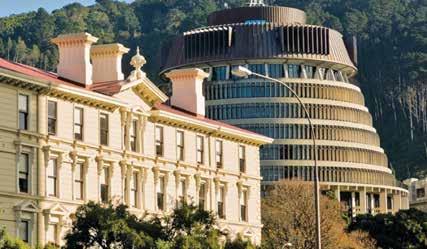
Carwyn Jones and Jamie-Lee Tuuta “Waikeria prison protest result of government failing to act on its own advice” Stuff 20 January 2021.
Carwyn Jones “Our Truth, Tā Mātou Pono: How the Treaty of Waitangi relates to Covid-19” Stuff 6 February 2021.
Dean Knight “New Zealand: Rendering Account During the COVID-19 Pandemic” Verfassungsblog 19 April 1921.
Dean Knight “No Fixed Abode: Voting a Huge Challenge for New Zealand’s Homeless ‘Legally they can, Practically they can’t’” New Zealand Herald 15 October 2021.
Nicole Moreham “Police Investigations: Privacy, Confidence and Public Duties” UK Constitutional Law Association Blog 18 February 2021.
Yvette Tinsley and Nichola Tyler “Criminal lawyers are regularly exposed to trauma—how can New Zealand’s justice system look after them better?” The Conversation 13 September 2021.
Thesis
Marnie Lloydd “Persisting Tensions: The Framing of International Legal Debates on Foreign Fighting” PhD Thesis, University of Melbourne, 29 January 2021.
VOLUME 18 ▪ NUMBER 1 ▪ 2020 NEW ZEALAND CENTRE FOR PUBLIC LAW Te Wānanga o ngā Kaupapa Ture ā Iwi o Aotearoa THIS ISSUE INCLUDES CONTRIBUTIONS BY: Sir Kenneth Keith Jessica Sutton Hannah Reid Sir Joe Williams New Zealand Journal of Public and International Law
Te Herenga Waka—Victoria University of Wellington | Te Kauhanganui Tatāi Ture—Faculty of Law Page 49 V.ALUM 2021
Course types
I
2022 postgraduate course timetable
Our postgraduate (500-level) law courses vary from year to year and are designed to enhance your expertise across a broad range of current and emerging issues in law.
Our courses offer a flexible approach to study, and include relevant career development opportunities for working professionals.
Our courses provide an opportunity to hone areas of speciality and expertise, by allowing you time and space to reflect on the broader significance of your experiences as a scholar, practitioner and/or working professional in government, law and business.

Intensive and block courses
LAWS 581
LAWS
B
LAWS 581
W
Page 50 V.ALUM 2021
Professor Petra Butler
LAWS 545 Land Issues in NZ Dr Ruiping Ye
Friday 4 March, 5.40–8.30 pm; Saturday 5 March, 12.40–4.30 pm; Friday 11 March, 5.40–8.30 pm; Saturday 12 March, 12.40–4.30 pm.
Thursday 3 March, 6.40–8.30 pm; Saturday 26 March, 8.30 am–2.30 pm; Saturday 7 May, 8.30 am–2.30 pm; Friday 16 July, 5.40 pm–9 pm; Saturday 17 July, 8.30 am–2.30 pm; Saturday 17 September, 8.30 am–2.30 pm Thursday 13 October, 6.40–8.30 pm.
Friday 15 July, 5.40–8.30 pm; Saturday 16 July, 8.30 am–2.20 pm; Friday 22 July, 5.40–8.30 pm; Saturday 23 July, 8.30–2.20 pm.
2 weeks in the evenings of September and October— exact dates and times TBC.
B Approx. 6 weeks in the afternoons of December and January—exact dates and times TBC.
Course Coordinator Points Type Dates and times
Advanced
Professor Catherine Iorns 10 I
Legal Study
40 B
522 Public Law Institutions, Norms, Culture Dr Eddie Clark and Associate Professor Dean Knight
10 I
Advanced Legal Study Professor Alberto Costi
LAWS 546 International Commercial Contracts 20 I
20
Intensive courses are taught in a concentrated manner, typically over consecutive weekdays, over a one- to two-week period.
Block courses are broken into workable portions and taught in the evening, on Fridays, and/or on Saturdays. They are typically spaced over two or more weeks and sometimes over several months.
Weekly courses run with two-hour weekly meetings over one or two trimesters. Most 500-level courses are offered in the late afternoon or evening.
w Learn more and apply at www.wgtn.ac.nz/postgraduate-law
Weekly courses
until Friday 5 November, unless otherwise indicated.
LAWS 534 Law of the Sea
LAWS 539 Law of Freshwater Resources

LAWS 548
Trimesters 2 and 3 LAWS 525
run from Monday 22 February until Friday 18 June, and from Monday 5 July until Friday 5 November, unless otherwise indicated.
Course Coordinator Points Type Dates and times Trimester 1 Classes run from Monday 22 February until Friday 18 June, unless otherwise indicated. LAWS 504 International Trade Law Dr Michelle Zang and Associate Professor Meredith Lewis 30 W Tuesdays, 3.40–6.30 pm. LAWS 531 Local Democracy and Sub-National Government Associate Professor Dean Knight 20 W Mondays, 4.40–6.30 pm. LAWS 532 Reading Legal Classics Professor Geoff McLay 20 W Wednesdays, 8.30–10.20 am. LAWS 533 Regulating Labour and Work Professor Gordon Anderson 20 W Thursdays, 4.40–6.30 pm. LAWS 538 Negotiation and Mediation Dr Grant Morris 20 W Tuesdays, 8.30–10.20 am. LAWS 541 Examining Core Public Law and Constitutional Values in an Inquiries’ Setting Sir Terence Arnold and Sir Geoffrey Palmer 20 W Thursdays, 8.30–10.20 am.
1 and 2 Classes
LAWS 521 Organisational Law— Corporations, Trusts, Fiduciary Relationships Dr Mark Bennett 40 W Wednesdays, 8.30–10.20 am. LAWS 523 International Climate Change Dr Bjørn-Oliver Magsig 40 W Mondays, 8.30–10.20 am. Course Coordinator Points Type Dates and times Trimester 2 Classes run from Monday 5 July
Trimesters
Associate
Joanna Mossop 20 W Mondays,
am.
Professor
8.30–10.20
Dr
Magsig 20 W Wednesdays,
TradeLab
Dr
Zang 20 W Thursdays,
pm.
Indigenous
Professor Richard Boast 20 W Tuesdays, 8.30–10.20 am.
Humanitarianism and
Dr
Lloydd 20 W Fridays, 8.30- 10.20 am.
Internship Associate Professor Kate Tokeley 20 W Wednesdays, 4.40–6.30 pm.
Bjørn-Oliver
8.30–10.20 am. LAWS 544
Clinic
Michelle
8.30–10.20
Land Issues in New Zealand and Pacific
LAWS 549
the Law
Marnie
LAWS 550
International Law and
Professor Alberto Costi and
Susy Frankel 40 W Tuesdays, 4.40–6.30 pm. Te Herenga Waka—Victoria University of Wellington | Te Kauhanganui Tatāi Ture—Faculty of Law Page 51 V.ALUM 2021
Development
Professor
Lexis Draft Academic and Lexis Red software offers law students and academics a comprehensive range of legal proofreading, editorial review, research, and analytical tools.
LexisNexis has provided 35 scholarships over the past five years, offered annual workshops for students, faculty, and alumni on industry trends, insights, and challenges.

WWW.LEXISNEXIS.CO.NZ

LexisNexis continues to partner with the Faculty of Law to ensure students have access to leading technology in support of their studies.
Keep in touch
You can sign up online to receive event invitations and our newsletters, and check that your details and communication preferences are up to date.
55 Lambton Quay, Pipitea, Wellington 6011
p +64 4 463 6366
e lawnews@vuw.ac.nz
w www.wgtn.ac.nz/law-mailing-list facebook.com/LawVictoriaUniversityofWellington
LinkedIn, Faculty of Law Victoria University of Wellington
V.Alum is published by Te Herenga Waka—Victoria University of Wellington’s Faculty of Law.
Editorial team:
Elizabeth Beattie, Elizabeth Cherry, Olivia Dickson, Sarah Forster, Claire Peacock, Rachael Thacker, Rebecca Walsh
If you have questions, comments or suggestions, email us at lawnews@vuw.ac.nz
The views expressed in V.Alum are not necessarily those of Te Herenga Waka—Victoria University of Wellington.
Important notice: Te Herenga Waka—Victoria University of Wellington uses all reasonable skill and care to ensure the information contained in this document is accurate at the time of being made available. However, matters covered by this document are subject to change due to a continuous process of review and to unanticipated circumstances, including those caused by COVID-19. The University therefore reserves the right to make any changes without notice. So far as the law permits, the University accepts no responsibility for any loss suffered by any person due to reliance (either whole or in part) on the information contained in this document, whether direct or indirect, and whether foreseeable or not.
Cover image: Pou Whenua designed by Te Atiawa sculptor Ra Vincent, and Old Government Buildings.

Image source: Colin McDiarmid, Te Herenga Waka—Victoria University of Wellington.
Virgina Woolf Photography
Maria Gobbie Photography
Mark Tantrum Photography LTD
Andy Spain Visual
The Faculty of Law at Te Herenga Waka—Victoria University of Wellington aims to promote legal scholarship of the highest quality, and to provide outstanding learning opportunities for our students. We greatly appreciate those who contribute to our tātai ture—the story of the Law School and its people, and the ways in which we connect the past, present, and future generations of law students. By supporting these efforts—for example, through scholarships, prizes, bequests, or grants—you can be a part of tātai ture too. We welcome the opportunity to talk with you about providing this kind of philanthropic support.
To discuss opportunities to make a difference for our students, please contact Victoria Beckett, development manager for government, law and business.
p +64 21 025 41461 or
e victoria.beckett@vuw.ac.nz
Leaving a bequest
Of the many ways that you can support the University’s work, leaving a bequest in your will is a meaningful way to create an enduring legacy and support the University for generations to come.

Your bequest will keep on giving long after your lifetime. Once you have made provision for your loved ones, a gift in your will allows you to make a difference to something you care about without impacting on your current finances. If you would like to discuss the possibility of leaving a bequest in your will, contact Rosalene Fogel.
p +64 4 463 6030
e rosalene.fogel@vuw.ac.nz
Thank you to the individuals and organisations who have generously supported the Faculty of Law in 2020 and 2021.
A.J. Park
The Lady Cooke of Thorndon
Cate Hensen
Chapman Tripp
Cullen—The Employment Law Firm
Debra Seales-Meichtry and family
Duncan Cotterill
Lawyers
Environmental Law Initiative Trust
Eric Shaw
Flacks and Wong
Fleur Knowsley
e lawnews@vuw.ac.nz

Frank Healy
Google
Joanne Twist
John Miller and Stephanie Potocka De Montalk, PhD
Jonathon Sylvester
Julia Inkster
Justice David Goddard, QC and Liesle Theron
Kate Sheppard Chambers
Martin and Bridget
Smith
Matt Vickers
Matthew Bunting
w www.wgtn.ac.nz/law-mailing-list
Michael and Suzanne Borrin Foundation
Professor Mark Hickford
Professor Petra Butler Sir Bruce Robertson, QC and Lady Lyn Robertson
Stout Street Chambers
The Hon. Justice Mark O’Regan
The Rt Hon. Sir Geoffrey Palmer QC and Margaret Palmer
Thorndon Chambers
Wellington Women Lawyers’ Association
facebook.com/LawVictoriaUniversityofWellington
LinkedIn, Faculty of Law Victoria University of Wellington
ISSN 2537-6764 (Print) ISSN 2537-6772 (Online)
What if... everyone could fulfil their true potential through access to a university education?













































 All dressed up for ComplyWith Cocktail Night Simpson Grierson Men’s Mental Health Breakfast—Zoom edition
Meredith Connell Community Corner
At the IPLS Patron’s lecture, Sir Geoffrey Palmer, and Kristy McDonald QC
Our members at the College of Law, Law Ball
All dressed up for ComplyWith Cocktail Night Simpson Grierson Men’s Mental Health Breakfast—Zoom edition
Meredith Connell Community Corner
At the IPLS Patron’s lecture, Sir Geoffrey Palmer, and Kristy McDonald QC
Our members at the College of Law, Law Ball





 The 2021 executive team
Wellness Week enjoyed by Jono Sylvester, Ben Julian, Ellen Lellman, and Anna Dombroski
President Meghan Grant with one of Ngā Rangahautira’s co-tumuaki Rhianna Morar at the Clerkship evening
The 2021 executive team
Wellness Week enjoyed by Jono Sylvester, Ben Julian, Ellen Lellman, and Anna Dombroski
President Meghan Grant with one of Ngā Rangahautira’s co-tumuaki Rhianna Morar at the Clerkship evening






 Grierson Client Interviewing winners Sophie Brokenshire and Emma Pullen
Bell Gully Junior Mooting finalists pictured with judges Justice Gwyn, Rachael Brown, and Professor Petra Butler
MinterEllisonRuddWatts Senior Witness Examination finalists with Associate Judge Johnston, Michael Bott, and Richard Gordon
Buddle Findlay Senior Negotiation winners with Professor Gordon Anderson, Scott Barker, and Professor Petra Butler
Grierson Client Interviewing winners Sophie Brokenshire and Emma Pullen
Bell Gully Junior Mooting finalists pictured with judges Justice Gwyn, Rachael Brown, and Professor Petra Butler
MinterEllisonRuddWatts Senior Witness Examination finalists with Associate Judge Johnston, Michael Bott, and Richard Gordon
Buddle Findlay Senior Negotiation winners with Professor Gordon Anderson, Scott Barker, and Professor Petra Butler








































 From left: Mr Wiliame Gucake, Ms Tupe Solomon-Tanoa’i, Dr Mele Tupou Vaitohi, Professor Mark Hickford, Associate Professor Guy Fiti Sinclair
From left: Mr Wiliame Gucake, Ms Tupe Solomon-Tanoa’i, Dr Mele Tupou Vaitohi, Professor Mark Hickford, Associate Professor Guy Fiti Sinclair





 Heemi Taumaunu
Pōrou, Ngāti Konohi and Ngāi Tahu, LLB
Heemi Taumaunu
Pōrou, Ngāti Konohi and Ngāi Tahu, LLB









 Professor Petra Butler takes on new leadership position.
Professor Petra Butler takes on new leadership position.



















